
Manual pentru clasa a VI-a MINISTERUL EDUCAȚIEI 6 Limba modernă 1 Engleză
Emma Heyderman
Fiona Mauchline
Ana-Magdalena Iordăchescu
Mariana Stoenescu
Acest manual școlar este proprietatea Ministerului Educației.
Acest manual școlar este realizat în conformitate cu Programa școlară aprobată prin Ordinul ministrului educației naționale nr. 3393/28.02.2017.
119 – număr unic de telefon la nivel național pentru cazurile de abuz împotriva copiilor 116.111 – numărul de telefon de asistență pentru copii
Manualul școlar a fost aprobat prin ordinul ministrului educației naționale.
Manualul este distribuit elevilor în mod gratuit, atât în format tipărit, cât și digital, și este transmisibil timp de patru ani școlari, începând cu anul școlar 2024–2025.
Inspectoratul școlar .................................................................................................................................................................................................................................................................. Școala/Colegiul/Liceul
ACEST MANUAL A FOST FOLOSIT:
AnulNumele elevului Clasa Anul școlar Aspectul manualului* la primirela predare
* Pentru precizarea aspectului manualului se va folosi unul dintre următorii termeni: nou, bun, îngrijit, neîngrijit, deteriorat.
• Cadrele didactice vor verifica dacă informațiile înscrise în tabelul de mai sus sunt corecte.
• Elevii nu vor face niciun fel de însemnări pe manual.
Limba modernă 1. Engleză. Manual pentru clasa a VI-a Emma Heyderman, Fiona Mauchline, Ana-Magdalena Iordăchescu, Mariana Stoenescu
Referenți științifici: prof. grad didactic I Daniela Tănăsescu, Colegiul Național „I.L. Caragiale”, București prof. dr. Roxana-Cristina Petcu, Universitatea din București, Facultatea de limbi și literaturi străine, Departamentul de limba engleză
Prelucrare după:
Motivate, Student’s Book 2 © Macmillan Publishers Limited / Emma Heyderman și Fiona Mauchline, 2013
Motivate, Student’s Book 3 © Macmillan Publishers Limited / Patrick Howarth și Patricia Reilly, 2013
Motivate, Workbook 2 © Macmillan Publishers Limited / Emma Heyderman și Fiona Mauchline, 2013
All Clear, Student’s Book 1 © Macmillan Publishers Limited / Fiona Mauchline și Daniel Morris, 2015
All Clear, Student’s Book 2 © Macmillan Publishers Limited / Fiona Mauchline și Daniel Morris, 2016
Ediție publicată sub licență. Edițiile originale au fost publicate pentru prima dată în 2013 de Macmillan Publishers Limited.
Copyright © 2024 Grup Media Litera
Toate drepturile rezervate
Editura Litera
tel.: 0374 82 66 35; 021 319 63 90; 031 425 16 19
e-mail: contact@litera.ro www.litera.ro
Editor: Vidrașcu și fiii
Redactor: Carolina Marcu
Corectori: Carmen Bîtlan
Credite foto: arhiva Litera, Shutterstock
Copertă: Lorena Ionică
Tehnoredactare și prepress: Simona Bănică
Descrierea CIP a Bibliotecii Naţionale a României Limba modernă 1 – Engleză: manual pentru clasa a VI-a / Emma Heyderman, Fiona Mauchline, AnaMagdalena Iordăchescu, .... – Bucureşti: Litera, 2024 ISBN 978-630-342-025-7
I. Heyderman, Emma II. Mauchline, Fiona III. Iordăchescu, Ana-Magdalena 811.111
.............................................................................................................................................................................................................................................................
1 2 3 4
Competenţe
LANGUAGE 1, 6th grade
1. Receptarea de mesaje orale în situaţii de comunicare uzuală
1. Receive oral messages in routine exchanges
2. Exprimarea orală în situaţii de comunicare uzuală2. Oral communication in routine exchanges
3. Receptarea de mesaje scrise în situaţii de comunicare uzuală
3. Receive written messages in routine exchanges
4. Redactarea de mesaje în situaţii de comunicare uzuală4. Write messages in routine exchanges
Competenţe
1.1. Identificarea informaţiilor esenţiale din fragmente scurte înregistrate, referitoare la aspecte cotidiene previzibile, atunci când se vorbește rar și clar
1.2. Identificarea semnificaţiei generale a mesajelor orale curente, clar și rar articulate
1.3. Identificarea unor elemente culturale specifice limbii studiate
2.1. Realizarea unei expuneri scurte, exersate, asupra unui subiect familiar
2.2. Participarea la scurte interacţiuni verbale cu sprijin din partea interlocutorilor
2.3. Exprimarea unei păreri în legătură cu un subiect familiar / o situaţie cunoscută
2.4. Manifestarea interesului pentru participarea la schimbul verbal
3.1. Identificarea informaţiilor necesare din liste sau din texte funcţionale simple (pliante, meniuri, orare, reclame)
3.2. Extragerea informaţiilor dintr-un text clar structurat (articole de ziar / digitale simple, broșuri), în care numerele și numele joacă un rol important
3.3. Identificarea unor informaţii de detaliu dintr-un document web
3.4. Manifestarea disponibilităţii pentru informare prin lectură
4.1. Completarea unui formular cu informaţii de identificare (educaţie, interese, competenţe)
4.2. Prezentarea unei activităţi în scris, utilizând cuvinte de legătură („și”, „dar”, „pentru că”)
4.3. Participarea la schimbul de mesaje scrise
1.1. Identify the essential information in short recordings related to predictable everyday items when someone speaks slowly and clearly
1.2. Identify the general meaning of current oral messages, clearly and slowly articulated
1.3. Identify the specific cultural elements of the studied language
2.1. Make a brief presentation on a familiar subject
2.2. Participate in short verbal interactions with support from interlocutors
2.3. Expressing an opinion on a familiar topic / known situation
2.4. Manifest interest in verbal exchange
3.1. Identify required information from simple lists or simple functional texts (flyers, menus, schedules, advertisements)
3.2. Extract information from a clearly structured text (simple newspaper / digital articles, brochures), where numbers and names play an important role
3.3. Identify detailed information from a web document
3.4. Show willingness for reading for information
4.1. Filling in a form with identification information (education, interests, skills)
4.2. Present a written activity using linking words (”and”, ”but”, ”because”)
4.3. Participate in the exchange of written messages
LIMBA
Programa școlară pentru disciplina
MODERNĂ 1 clasa a VI-a School curriculum for MODERN
generale General competences
specifice Specific competences
3
What’s in this textbook for you?
Take a tour!
Ce cuprinde acest manual? Să facem o trecere în revistă!
This textbook is designed both to fulfill the students’ linguistic and communicative competences and to develop their skills in all specific competences as well. The textbook offers flexible learning by providing language and content with a complete range of components and use of up-to-date technology. It is an attractive and motivating course with clearly-structured skills and grammar syllabus, and a focus on natural communication.
Students become aware, confident learners, excellent communicators and achieve success – at school, in exams and throughout their life!
This textbook includes:
√ a starter module of three pages;
√ eight modules of 11 pages;
√ eight pages of Self-checks, one after each module;
√ eight pages of Writing guides;
√ four pages of Class portfolios;
√ eight pages of Festivals and special occasions;
√ six pages of Final revisions at the end of the textbook;
√ eight pages of Grammar guides;
√ two pages of sketches, jokes, tongue twisters;
√ two pages of irregular verbs;
√ a Digibook.


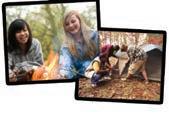
The Vocabulary is introduced through representative pictures and recorded so that students can practice the pronunciation.
The Now say it! box includes a listening activity, leading into a speaking activity meant to practice the vocabulary in short dialogues.
The Reading texts are informative and interesting and show the language in context. All the readings are recorded.
The Grammar is presented with clear grammar tables. Graded exercises help students practise the form and meaning of the grammar.
The Pronunciation box appears in every unit.
Acest manual este conceput atât pentru a structura competențele lingvistice și de comunicare ale elevilor, cât și pentru a le dezvolta abilitățile în toate competențele specifice. Lucrarea oferă flexibilitate în învățare, limbaj și conținut cu o gamă completă de componente și utilizarea tehnologiei moderne. Este un curs atractiv și motivant, cu activități de vocabular și gramatică bine structurate fiind centrat pe comunicarea naturală.
Elevii devin conștienți, încrezători în procesul de învățare, vorbitori excelenți, descoperind calea spre succes – la școală, la examene și pe tot parcursul vieții.
Manualul conține:
√ un modul introductiv de trei pagini;
√ opt module de 11 pagini;
√ opt Teste de autoevaluare, câte unul după fiecare modul;
√ opt pagini de Ghid de scriere;
√ patru pagini de Proiecte de grup;
√ opt pagini de Festivaluri și ocazii speciale;
√ șase pagini de Recapitulări finale la sfârșitul manualului;
√ opt pagini de trimiteri la noțiuni de gramatică;
√ două pagini de schițe, glume și exerciții de dicție;
√ două pagini de verbe neregulate;
√ manualul în format digital.


Vocabularul este prezentat prin intermediul unor imagini reprezentative și înregistrat astfel încât elevii să poată exersa pronunția.
Caseta Acum e rândul tău! include o activitate de ascultare, care conduce către exersarea vocabularului prin scurte dialoguri.
Textele de Exersarea citirii sunt bogate în informații și interesante și ilustrează folosirea limbii în context. Toate textele sunt înregistrate.
Gramatica este prezentată în tabele clare. Exerciții cu grade diferite de dificultate îi ajută pe elevi să exerseze noțiunile de gramatică predate.
Caseta Pronunție apare în fiecare unitate.
10 Copy and complete the table with the time expressions in the box. always at the moment every weekend never now on Mondays once a week this week today usually present simplepresent continuous always 12 Put the verbs in brackets into the present simple or present continuous. Sylvia is watching watch a documentary right now. 1 What sports … you … play today? 2 This tent … belong) to my brother. 3 usually … play) volleyball on Wednesdays. … not sleep outdoors very often. 5 … you … want to go fishing today? 6 … not think he’s lying. 7 In Life with the Tribe a family … spend a month in isolation with a tribe. Grammar guide 2 page 136 11 Choose the correct words. Channel 5 9 pm – Life Swap Liam and Liz are teenagers … 1 … but they usually do are doing completely different things. 2 Liam is sporty. He always plays is always playing sports. 3 Liz is very different. She sings is singing in the choir once week. 4 This week they swap are swapping lives, families and friends. 5 Liam stays is staying with Liz’s family at the moment and Liam’s parents look after are looking after Liz. 8 Read the text again. Are the sentences true or false? Correct the false sentences. Life with the Tribe is a comedy programme. F Life with the Tribe isn’t comedy programme. It’s a documentary series. 1 Charlie’s getting up at the same time as usual. 2 He’s making lunch for his family. 3 His children are bored because they’re doing nothing. 4 Charlie doesn’t usually like the sea. Present simple expressing habits: We have dinner at pm every evening expressing actions happening at the time of speaking: ’m having dinner at the moment expressing routines: take the bus to school every morning expressing temporary situations: He’s looking for new job these days expressing timetables, schedules, programmes: The plane leaves at 8 making plans, fixed arrangements for the near future: They’re flying to London in two hours expressing permanent states: We live in Romania. time expressions: every day / weekend / year etc., always, usually, never, on Mondays, once week etc. with always to express annoying habits: You are always forgetting things! time expressions: at the moment, now, this week, these days, today etc. Grammar Present simple vs. present continuous 9 Fill in the gaps with the correct words from the text. Charlie Timms and his family are living in the … this month. Charlie Timms and his family are living in the savannah this month. 1 They are … in the wild as they live with a … 2 Everyone is learning new … 3 His children are building a … in the trees. 4 The family is … with their new life and they are … about their adventure. State verbs, which describe a state rather than an action, do not normally have continuous tenses. They include: like, love, hate, see, hear, think, belong, know, understand love camping. I’m loving camping MODULE 2 Adventure 31 Grammar 4 Make phrases with the verbs in exercise 1 and the words below. fires animals food fruit in a river in a tent trees wood Now say it! Vocabulary 1 Match pictures 1–5 with the words in the box. Which five activities aren’t in the pictures? build camp chop climb cook find fish hike look for sleep 2 Listen and repeat. 3 Choose the correct words. Call us on 027 578 088 TODAY! (0) Hike / Look for in the mountains during the day and at night (1) sleep find outdoors under the stars! (2) Cook Camp your own food! Learn how to (3) fish find in lakes and rivers and (4) camp climb trees. We teach you to (5) hike chop wood and (6) build / sleep a fire. Can you survive in the wild? Learn how to on one our fantastic courses! 5 Listen to Lou and Will. What survival skills has Will got? 6 Work in pairs. Ask and answer questions about your survival skills. Yes, can build fires. Have you got any survival skills? 2 2a Unit Survival skills MODULE 2 Adventure 24 Reading 7 Read the text quickly. Which survival skills does it mention? 8 Read, listen and check your answers. 9 Read the text again. Are the sentences true or false? 1 British people don’t like camping. 2 Survive in the Wild isn’t for children. 3 You can learn three skills on a Family Day 4 You sleep at home during the Adventure Weekend 5 The River Safari starts on Friday afternoon. 10 Which is the best course for people who … 1 … enjoy adventure, like sleeping outdoors, and are free for two days? 2 … love learning new things and spending time on the water? 3 … want to learn survival skills but are only free on one day? Write down nouns with their verbs. prepare food chop wood build a fire 11 Make can sometimes mean create Which words below do not go with make Which verb do they go with? a canoe an exam a fire homework 12 CLASS VOTE Which Survive in the Wild course would you like to do? Why? In the UK, camping is becoming very popular. People are bored by life in the city and they are looking for ways to get back to nature. Survive in the Wild is an organization that teaches people how to survive outdoors by using natural resources. Basic survival techniques include how to hunt, fish and prepare food and how to stay warm and safe. Here are three of the survival courses you can try. On the Family Day course, you learn three basic skills in a day: how to build a fire, how to look for food and how to cook food. At the moment, a family is making a fire with friction. If you’re looking for adventure and you are free for the whole weekend, try the Adventure Weekend Some people are making simple tools for hunting and a boy is climbing tree. He’s sleeping outdoors tonight, so he’s looking for wood to build a fire. Alternatively, why not try the Two-day River Safari? You can make a canoe and learn a lot of new skills. The course begins every Friday after school and there are lots of activities on offer. One family is fishing, others are swimming, and the safari leader is chopping wood to build a fire. Interested? Check out Survive in the Wild’s web page for more information. i i h d g MODULE 2 Adventure 25 Vocabulary Listening Reading Now say it! 4

The Speaking section introduces the foreign language in routine exchanges.
The Culture section highlights different aspects of life in a variety of English – speaking countries.
The Writing page provides a model for different text types.















Every module is followed by a Self-check to revise and evaluate vocabulary and grammar.
The six pages of Final revisions invite students to revise and consolidate the vocabulary and grammar from all the modules.
The four page – Class portfolios are a chance for students to work in groups, create a project together and present it.
Pagina dedicată Exprimării orale introduce limba modernă în situații de comunicare uzuală.
Textele din secțiunea Cultură evidențiază diverse aspecte ale vieții din țări în care se vorbește limba engleză.
Paginile de Redactare oferă un model pentru diferite tipuri de texte.







După fiecare modul există o pagină de Evaluare menită să recapituleze și să evalueze vocabularul și noțiunile de gramatică predate.
Cele șase pagini de Recapitulări finale invită elevii să repete și să consolideze noțiunile de vocabular și gramatică predate.
Cele patru pagini de Proiecte oferă elevilor ocazia de a lucra în echipă pentru a realiza și a prezenta proiectul grupului.
The Digibook Varianta digitală
The content of the Digibook is similar to the printed version of the Student’s book and it also includes a range of interactive multimedia learning activities (static, animated, interactive).
Manualul digital are un conținut similar variantei tipărite a manualului elevului și cuprinde, în plus, o serie de activități multimedia interactive de învățare (statice, animate, interactive).
Writing A story 1 Read the text, then choose the best title for Mary’s story. a) A great day out b) A terrible afternoon c) Mary’s favourite film 2 Notice the use of the words first then and in the end in the text. 3 Read the text again and number the events in the correct order. … Mary and Jack saw a boring film. … Mary went to a café. … Mary met Jack. Mary missed the bus. … Mary waited half an hour for a bus. … Mary went to the main square. … Mary and Jack went to the cinema. 4 Read the text again and answer the questions. Why did Mary wait half an hour for a bus? She waited half an hour because she missed her bus. 1 Where was Mary’s bag? It was… 2 Why did Jack arrive at 5.45? He arrived at 5.45 because … 3 Did Mary like the film? 5 To practise your writing skills, go to Writing guide 2 on page 110. 6 Write a story about a trip you went on. Follow these steps. Use 80–100 words. Writing a story Step 1 Plan Make notes under three headings: 1 Where did you go? 2 What did you do? 3 What happened in the end? Step 2 Write Write a first draft. Organize your writing in three paragraphs. Use your notes from Step 1 and the story on this page to help you. Step 3 Check Check your work. Try to use the past simple and include the time connectors first then and in the end Step 4 Write Write your final copy and hand in your work. Language Time connectors You can improve your story by using time connectors: First, the alarm clock didn’t ring …, then we took the bus …, in the end had a good holiday. Last Saturday, went into town to meet my friend Jack, but there were lots of problems. First, missed my bus, so waited half an hour for the next bus. When arrived in town, went to a café. tried to buy a drink but didn’t have my bag. It was on the bus! Then went to the main square to meet Jack at 5 o’clock, but he wasn’t there. He arrived at 5.45 because there was a problem with his bike. In the end, we went to the cinema, but the film was really boring so went to sleep! Class portfolio 2 page 117 Design portfolio with the title “Joy of travel”. Work in small groups. MODULE 4 Travel 56 Writing Culture Speaking A school trip Listen 1 Look at the picture. What can you see? What are they doing? 2 Listen to the dialogue. Where are Will and Lou going at the weekend? 3 Listen again and complete the dialogue. Practise 4 Listen again and act out the dialogue. 5 Put the sentences below in the correct order. … OK. What time? … Sounds good. See you then. … I’m busy. What about tomorrow morning? … Are you going on the adventure holiday? … How about meeting at half past nine? … Yes, let’s buy our clothes together. Are you free this afternoon? Are you free after school tomorrow? Sorry, I’m busy. What about on Tuesday afternoon? Where shall we meet? What about in front of the supermarket? What time? How about meeting at half past four? Making plans Great! See you then! Sounds good. See you then! How about meeting at half past (4) All right. What time? What about in front of the (3) … Yes, that’s fine. Where shall we meet? Sorry, I’m busy. What about on Tuesday (2) … ? Good idea! Are you free after school tomorrow? Yes! Let’s buy our (1) … together. Are you going on the school camping weekend? MODULE 2 Adventure 28 Speaking task Prepare a dialogue between you and Will. Step 1 First, look at the poster below and decide what you need to buy. Step 2 Think about what Will says. Are you going on the sailing weekend? Are you free … ? That’s fine. Where shall we meet? What time? See you then! Think about what you say. Yes! Let’s buy … together. Sorry, I’m busy. What about … ? What about … ? How about meeting at … ? Great! See you! Step 3 Write your dialogue. Step 4 Work in pairs. Take it in turns to practise your dialogue. 6 Read and listen to the information about summer camps. Then answer the questions. 1 How many people go to summer camp? 2 What different kinds of camps are there in the USA? 3 What is the Venture camp? 7 Write a brief message to Santa Claus, inviting him to the winter camp you are going to. Exchange notebooks to reply to a classmate’s message as Santa. You need: waterproof jacket and shoes sunglasses sleeping bag SAILING WEEKEND 17th – 19th Culture Summer camps The first summer camp was in America in 1861. Today more than 10 million young people go to one of 12,000 summer camps across the USA. There are speciality camps where children learn specific skills. For example, in sports camps young people learn to play baseball and football. There are even rock music camps, where they learn to play musical instruments, such as the guitar and the drums. There are adventure camps, where children go swimming in the sea or hiking in the mountains. Young people in the UK can join the Woodcraft Folk. This is a group which organizes summer camps during the school holidays. Teenagers aged between 13 and 15 are called Venturers. Every three years there’s a national Venture camp. About 600 teenagers camp together, try new activities and, of course, make new friends while learning about the environment, world peace and other global issues. MODULE 2 Adventure 29 Speaking Class portfolio 1 6 Display Make a poster PowerPoint presentation. Include your texts and pictures. Show your project to the class. 5 Visuals Find or draw pictures of your artist and his her 4 Check Read your text and check it for: • capital letters and punctuation • and, but and because • time prepositions: at on and in 3 Write Write a short text about the artist, using your 2 Group work Which artists does everyone in your group like? Choose one artist and write some notes on: • nationality • type of art • other information: family, exhibitions, other projects 1 Ideas Which famous artist do you like? Why do you like him her? Our favourite artist 116 Class portfolio 130 Final revision 2 Across 3 This person repairs electrical machines. 5 We need this to move the cursor on a computer screen. 7 This verb is the opposite of drop 8 This person saves swimmers in danger. 10 This person helps sick animals. 12 John is very … He never does any work. My parents often … for their shopping with their credit card. 14 A … is when your head hurts. This person designs buildings. 17 We use these to listen to music on our computers. Down 1 We do this when we go up mountain. 2 The opposite of kind 4 A lot of people have a … in winter. 6 We do this to have lot of money. 9 A … person makes other people laugh. 11 You should go to the doctor if you have a high … 1 Read the clues and complete the crossword. Final revisions 6 Complete the dialogue with the correct form of the verbs in brackets. Will How often (1) … you … watch television? Izzie Oh, every night. (2) … you often … watch documentaries? No, don’t. (3) … cartoons and sports programmes. (4) … you … sports programmes? Izzie They’re OK. (5) … you … have got favourite TV programme? Will Football Focus (6) … be good. Izzie When (7) … be it on television? Will It (8) … be on television every Saturday. How about you? What (9) … be your favourite TV programme? Izzie Neighbours Will On, no! (10) … not like soap operas. They are terrible! ---- / 20 7 Writing: Write a review about your favourite TV programme. Mention when it is on, what it is about and why you like it. Use 60–80 words. / Total ---- 100 1 Order the letters to make film types. hoorrr tedmiana eenrstw ehillrrt aafnsty arw cdemoy niotac ---- / 8 2 Write the types of TV programme. 1 2 3 4 ---- / 6 3 Complete the questions with the words in the box. how what when where who why … do you watch TV, in the morning or in the evening? … ‘s your favourite TV programme? … ‘s your favourite actor? … do you like him her? … often do you watch cartoons? … do you do your homework, in your bedroom or in the living room? ---- / 12 4 do / does and order the words to make questions in the present simple. Then write short at the weekend go you to the cinema? war films your best friend like? from the USA Johnny Depp come? a lot of TV your parents watch? watch films you on your computer? / Self-check 1 Now can Ø talk about film types & TV programmes; Ø correctly use present simple & prepositions of time; Ø talk about likes & dislikes; Ø 5 Complete the sentences with at on or in 1 You can plant these flowers … the autumn. 2 Is your neighbourhood quiet … night? 3 My birthday is … the 10th of January. 4 He walks the dog … the evening. 5 don’t work … Christmas day. 6 We usually stay home … Easter. 7 Every year visit my grandparents … summer. ---- / 14 Don’t forget to complete the Behaviour observation sheet according to the example on page 7! 22 MODULE 1 Film and TV Self-check
IMLA static AMII static IMLA animated AMII animat IMLA interactive AMII interactiv 5
Starter module page 8
Module Film and TV page 11
Module Adventure page 23
Module History page 35
Module Travel page 47
Module Possessions page 59
Module Make a difference page 71
Module Ambitions page 83
Module Fun and games page 95
Let’s have fun! pages 107, 134
Festivals and special occasions page 120
Reading
Introductions Clothes Telling the time Grammar Classroom language
Film types TV programmes
Survival skills Feelings
Discoveries
Natural disasters
Transport Holidays
Money IT world
What’s the weather like?
Health problems and first aid
Life events Music
Entertainment Places to visit
Present simple Prepositions of time
Present continuous Present simple vs. present continuous
be: past simple Past simple: regular and irregular verbs
Past simple –extensive practice used to
The adjective – comparative and superlative forms
The forms of the genitive
Expressing agreement and disagreement
The modal verbs can, will – making a polite request
The future tense simple –expressing future events Tag questions
Tense review: present simple and continuous, past simple, future simple Adverbs of time / place / manner – expressing details
Writing guides page 108
Teenagers and their favourite films
Too much TV and not enough sleep?
Survive in the Wild Life with the Tribe
A discovery of food Great European disasters
Unusual transport Bear Grylls
Smart tips for young people
The Big Swap Shop
World Water Day Mountain rescue!
Know your future The road to success
A history of games Talking about holiday plans
Class portfolios page 116
Irregular verbs page 143
Final revisions page 128
Grammar guides page 135
Module VocabularyGrammar
beat /biːt/ become /bɪˈkʌm/ begin /bɪˈɡɪn/ bite /baɪt/ break /breɪk/ bring /brɪŋ/ build /bɪld/
6
When you finish studying each module, assess the activities you have carried out and how you felt while going through these lessons. Create your self-observation sheet by completing the table below. Collect the sheets from each module in your portfolio to monitor your progress.
I showed interest in learning. I followed the instructions. I worked individually. I asked for help when needed. When I made mistakes I wanted to learn how to correct them. I participated actively in activities.
ListeningSpeaking WritingCulture CLILSelf-check Child stars Talking about films Talking about likes and dislikes My favourite TV programme Film awards Music Self-check 1 page 22 Young adventurers A school trip Making plans A blog entry Summer camps Science Self-check 2 page 34 History quiz At the library Asking for information A biography Explorers Art Self-check 3 page 46 PowerBocking Travelling by bus Asking for travel information A story Public transport Geography Self-check 4 page 58 Pocket money Going shopping Buying and selling A description Charity shops Maths Self-check 5 page 70 Heroes Talking about weather Giving opinions A letter Weather in the UK Literature Self-check 6 page 82 Ambitions In a music shop Asking for and giving advice A class survey Music in schools ICT Self-check 7 page 94 Travel games At a holiday camp Expressing preferences An e-mail Beaches in the UK Language Self-check 8 page 106 Behaviour NeverSometimesOftenAlways
7
BEHAVIOUR OBSERVATION SHEET
Starter module

Introductions
1 Look at the picture. What are their names?
2 Listen and complete the sentences with the words in the box.
Manchester swimming 14
1 Hi. I’m Izzie. I’m … years old.
2 Hello. My name’s Will. I’m from … .
3 Hi. I’m Lou. My favourite sport is … .
3 Match questions 1–4 with answers a–d.
1 How old are you?
2 What’s your name?
3 Where are you from?
4 What are your hobbies?
a) I’m from Liverpool.
b) I’m 13 years old.
c) My name’s Joe.
d) My hobbies are football and art.
4 INTERFACE Work in pairs. Ask and answer the questions.
What’s your name?
My name’s Alicia.
Hi. My name’s Louise but I prefer Lou.
5 Order the words to make questions. Then give true answers about yourself.
hobbies / What / your / are ? What are your hobbies?
1 name / your / What / is / first ?
2 is / name / What / family / your ?
3 spell / do / How / name / you / your ?
4 you / Where / from / are ?
5 you / nationality / What / are ?
6 you / old / How / are ?
Clothes
6 Look at the picture again and find the clothes in the box. Which words aren’t in the picture?
7 Listen and repeat.
Hello. I’m Will.
Hi. I’m Izzie.
boots coat dress jacket jeans jersey sandals shirt shoes skirt trainers T-shirt
Competences: 1.1; 1.2; 2.1; 2.2; 3.4.
STARTER MODULE 8
Possessive ’s / s’
Use ’s after a name or singular noun. John’s coat is black.
Use ’ after a plural word ending in -s. The girls’ T-shirts are red. 9 Describe the clothes in the picture. Will’s trainers are white.
Make up your own season calendar and include: pictures of each season, activities and the clothes you wear. Design a poster or a collage and present it to the class.
Complete the table with the clothes suitable for each
Telling the time
Work in pairs. Talk about your partner’s clothes. David’s T-shirt is blue.
What time is it?
08:30 – It’s half past eight. – It’s eight thirty. (it is used in formal situations, such as a train timetable)
What’s the time?
08:15 – It’s a quarter past eight. – It’s eight fifteen.
Can you tell me the time, please?
08:45 – It’s a quarter to nine. – It’s eight forty-five.
What time is it? Write full sentences. It’s 4:55. It’s five to five.
8:15.
What time is your…
first class?
break time?
favourite TV programme?
lunch?
last lesson?
8
words related
1. 2. 3. 4. 5. 6. 7. 8. 9. 1 2 3 4 5 6 7 8 9 10 10.
Complete the crossword with
to clothes.
10
11
spring coat, summer autumn winter 12
season.
INTERFACE
13
1
2
3
… . 4
… . 5
… . 14
1
2
4
5
6
1 2 3 4 57 8 9 10 11 half past quarter past quarter to o’clock 6 12
It’s
It’s … .
It’s 11:25. It’s … .
It’s 12:00. It’s
It’s 9:30. It’s
It’s 3:45. It’s
.
3
after-school club?
STARTER MODULE 9
Grammar
15 Write true sentences with the affirmative or negative form of be
1 I … from Turkey.
2 My best friend … 12 years old.
3 We … in a maths class.
4 My favourite hobby … swimming.
5 Moscow … the capital of the UK.
16 Choose the correct words.
1 I have got / has got two sisters and one brother.
2 My father have got / has got a red car.
3 We have got / has got an English exam tomorrow.
4 She have got / has got white trainers.
5 They have got / has got new video games.
17 Copy and complete the sentences with the correct form of have got.
1 I … some apples.
2 They … (not) new bikes.
3 How many children … he … ?
4 She … (not) a pet.
5 … you … any fresh vegetables?
6 I’m busy, I … (not) a lot of time.
7 This flat is great, it … a lot of space.
18 Copy and complete the sentences with the correct form of the verbs be or have:
1 He … tired.
2 I … a new hat.
3 We … a little late.
4 They … many games.
5 These children … very playful.
6 Fiona … four teeth.
7 My mum … 32 years old.
8 The guests … happy.
19 Complete the sentences with the right information.
1 My name … and I … years old.
2 I’ve got … brother(s) and … sister(s).
3 My best friend’s name … .
4 He / She … brother(s) and … sister(s).
5 He / She … from Sibiu, but I … from Bucharest.
20 Match the beginnings 1–5 with the endings a–e.
1 Have you a) in the 6th grade?
2 How b) on page 4, please.
3 Are you c) got any brothers or sisters?
4 Has he d) are you?
5 Is she e) an only child?
21 Copy and complete the table. subject pronoun
possessive adjective
22 Choose the correct words and write the sentences in your notebook.
1 Our / My / Their name’s George. I / You / We ’m from the USA.
2 These are my cousins Josie and Mandy. They / Their / Your father is Scottish.
3 Vancouver, Toronto and Montreal are cities. We / You / They ’re in Canada.
4 Josie’s first language isn’t English. Her / She / Its first language is French.
5 Canada is a big country. He / She / It is on the American continent. Ottawa is your / its / his capital.
6 My cousins and I have the same surname. We / Its / Our surname is Good. We / He / It like it a lot!
Classroom language
23 Check the meaning of the words in the box.
art drama English French geography history ICT (information and communication technology) literature maths music PE (physical education) science
24 Listen and repeat.
25 Write sentences about your school week. I’ve got science and PE on Monday.
26 Order the words to make sentences.
1 don’t / the question / I / understand .
2 spell / How / you / do / ‘pencil’ ?
3 Can / repeat / that / you ?
4 borrow / your pen / Can / I ?
5 to page 10 / Open / books / your .
6 mean / ‘chemist’ / What / does ?
I
you…sheit……they
my…his……ouryour…
STARTER MODULE 10
FILM AND TV MODULE 1



IN THIS MODULE YOU WILL LEARN:
Vocabulary
Grammar
Reading
Speaking
Writing
Culture
CLIL
• Film types
• TV programmes
• Present simple
• Prepositions of time
• Teenagers and their favourite films
• Too much TV and not enough sleep?
• Talking about films
• Talking about likes and dislikes
• My favourite TV programme
• Film awards
• Music
Find the page numbers for:
Competences:
cameraman
Ø a
Ø a famous statue Ø a famous band
1.1; 1.2; 1.3; 2.1; 2.2; 2.4; 3.1; 3.4; 4.1. 11

Vocabulary

1 Read the words in the box. Check their meaning.
2 Listen and repeat the words in the box.
3 Look at the film posters 1–5 and choose the correct words.
Star Wars is a science-fiction / comedy film. Star Wars is a science-fiction film.
1 Moana is a fantasy / horror film about a brave girl.
2 Pirates of the Caribbean is an adventure film / musical with Johnny Depp.
3 Smurfs is a successful animated / war film.
4 The Oklahoma Kid is a romantic comedy / western with many famous actors.


Listen to Will and Izzie. What are their favourite types of film?
5 Work in pairs. Ask and answer questions about your favourite types of film. I like horror films. What’s your favourite type of film?
Now say it!
4
action adventure animated comedy fantasy horror musical romantic comedy science-fiction thriller war western
3 1a Unit Film types 2 1 12 MODULE 1 Film and TV

Reading
6 Read the text quickly and choose the best title.
1 New films at the cinema
2 Teenagers and their favourite films
3 Cinemas in the UK
When do you go to the cinema? What types of film do you like? In the UK, the cinema is very popular and a lot of young people go there. But, what types of film do they watch? We ask two friends about their cinema preferences.

Jack, 12
I love going to the cinema because there are always eight films on at our local cinema complex, and it’s really modern. The ice cream is fantastic and there’s great popcorn and other snacks. I go with my friends every Friday. We all like science-fiction films with action and suspense. We are also great fans of special effects, so we love films like Avatar and Transformers
Katie, 11
I don’t like horror films or science-fiction films but I love romantic comedies. One of my favourite films is Letters to Juliet. It’s about a woman called Sophie who goes to Italy and discovers a very old, unopened love letter. It’s very funny and Sophie ends up falling in love too, of course! I don’t go to the cinema much, because there isn’t a cinema near me. I watch films on DVD a few months later.


7
Read and listen. Who mentions these things, Jack or Katie?
They sell good ice cream at my local cinema. Jack
1 There isn’t a cinema near me.
2 I go to the cinema with my friends. …
3 My favourite film is a love story. …
4 I wait for the DVD and watch films then. …
5 I like the same films as my friends. …
8 Answer the questions.
1 Do young people like going to the cinema in the UK?
2 Do Jack and Katie enjoy the same types of film?
3 Does Jack like his local cinema?
4 Does Katie go to the cinema a lot?
Organize your vocabulary into word sets to help you remember it: film types: horror, science-fiction, war.
9 Complete the word sets using these words from the text.
fantastic ice cream modern popcorn snacks special effects suspense
science-fiction films: a) … , b) … science-fiction films: a) special effects, b) suspense
1 food: c) … , d) … , e) …
2 adjectives: f) … , g) …
10
CLASS VOTE Where do you prefer to watch films, at the cinema or at home? Why?
5 4 13 MODULE 1 Film and TV
Grammar Present simple
affirmative
I / You eat fruit.
He / She / It runs fast.
He / She / It goes to the park.
We / You / They need vitamins.
negative
I / You don’t eat vegetables.
He / She / It doesn’t drink water.
We / You / They don’t like cakes.
1 Complete the sentences with the present simple form of the verbs in brackets. Use the spelling rules on page 118 to help you.
My friends … (watch) the film in the front row. My friends watch the film in the front row.
1 I … (go) to the cinema with my family.
2 My brother … (study) the film reviews and he … (choose) the film.
3 My dad … (go) to the cinema early and he … (get) the tickets.
4 You … (eat) ice cream at the cinema.
5 We … (sit) in the middle of the cinema.
2 Make the sentences in exercise 1 negative.
My friends … (watch) the film in the front row. My friends don’t watch the film in the front row.
3 Write complete sentences. Use the present simple.
Izzie / enjoy / films but she / not go / to the cinema very much.
Izzie enjoys films but she doesn’t go to the cinema very much.
1 The cinema / open / at 9.00 am / and / films / start at 9.30.
2 Her dad / buy / the newspaper and Izzie / read / all the film reviews.
3 Her friends / love / romantic comedies but Izzie / hate / them.
4 Izzie / prefer / science-fiction films but her friends / not like / them.
We use the present simple for permanent states, repeated actions, daily routines and timetables. She works in a hospital. She wakes up at 7 am. The bus leaves at 8.15.
questions and short answers
Do I / you eat healthy food?
Yes, I / you do. No, I / you don’t
Does he / she / it drink coffee?
Yes, he / she / it does. No, he / she / it doesn’t
Do we / you / they buy fish?
Yes, we / you / they do No, we / you / they don’t
4 Order the words to make questions. Then write answers that are true for you.
like / Do / animated films / you ?
Do you like animated films?
1 your best friend / go / Does / to the cinema / at the weekend ?
2 a lot of films / Do / watch / you ?
3 your classmates / war films / enjoy / Do ?
4 eat / you / do / at the cinema / What ?
We use present simple with adverbs of frequency.
I am always tired at school. You usually go jogging in the park. He often meets his friends.
She sometimes watches TV.
They never watch documentaries.
5 Look at the sentences in the Language tip. Choose the correct words to complete the rules. Frequency adverbs normally go before / after the main verb, but they go before / after be.
6 Rewrite the sentences using the adverbs of frequency.
Teenagers use the TV to help with their homework. (never)
Teenagers never use the TV to help with their homework.
1 They watch a variety of programmes. (always)
2 Their favourite programmes are soap operas and comedy programmes. (usually)
3 Boys watch more TV than girls. (often)
4 Girls turn on the TV after 9.00 pm. (sometimes)
14 MODULE 1 Film and TV
Question words
question words
What is your brother’s name?
Where do you live?
When do you go to the cinema?
Who is your favourite singer?
Why do you like action films?
How often do you go to the cinema?
7 Choose the correct words. Then match questions 1–5 with answers a–e.
What / When do you watch DVDs?
When do you watch DVDs?
I watch DVDs at the weekend.
1 Who / What is your favourite film?
2 Where / Who do you watch films?
3 Who / When is your favourite actor?
4 How often / Who does your friend buy DVDs?
5 Why / What do you like going to the cinema with your parents?
a) I usually watch films at my aunt’s house.
b) I like Robert Pattinson.
c) Because they always buy popcorn.
d) She never buys DVDs.
e) I love The Karate Kid.
8 Order the words to make sentences.
the cinema / We / twice a month / go to . We go to the cinema twice a month.
1 often / am / tired / on Monday morning / I .
2 stays up late / My dad / every night .
3 watch / every day / I / sports programmes .
4 the internet / hardly ever / My mum / uses .
5 My uncle / goes / always / for a walk .
Pronunciation
/e/ /uː/ /aɪ/
a Read and listen to the words.
/e/ when best adventure
/uː/ who blue superstar
/aɪ/ why like child
b Listen again and repeat.
Grammar guide 1 page 135
Listening Child stars
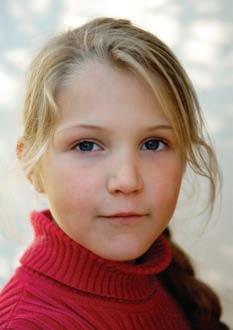

9 You are going to listen to a radio interview with Mia Straw. Before you listen, look at the pictures and try to predict the answers to these questions.
1 What does Mia do?
2 Does Mia go to school?
3 Is she rich and famous?
10 Listen to the radio interview and check your answers to exercise 9.
11 Listen again and answer the questions.
1 Where does Mia live?
2 How many hours a day does she work?
3 How many hours a day does she study?
4 Where does the film company put her money?
5 When can Mia spend her money?
6 Does Mia have any dreams for the future?
12 Would you like to be a child star? Why / Why not?
A lot of child stars become Hollywood superstars. Jessica Alba, Drew Barrymore and Leonardo DiCaprio are some famous examples. Do you know any in your country?
13 INTERFACE Work in pairs. Ask and answer the questions in exercise 7.
What is your favourite film?
I love ”Avatar”.
15 MODULE 1 Film and TV
Speaking
Talking about films
Listen
1 Look at the picture. Where are Will and Izzie?
2 Look at the names of the films in the box. What types of film do you think they are?
Invincibles Return Summer Love
The Monster Returns Year 2222
3 Listen to the dialogue and check your answers. Which film do Will and Izzie decide to see?
4 Listen again and repeat the dialogue, using the information in exercise 2.
What’s on?
I can’t stand romantic comedies. What about (2) … ? It’s a horror film.
I don’t mind science-fiction. What do you think of animated films?
Let’s see Invincibles Return!
Practise
5 Act out the dialogue in exercise 4.
6 Write complete sentences. I / / romantic comedies.
I don’t mind romantic comedies.
1 My friends / / horror films.
2 My dad / / animated films.
3 We / / going to the cinema.
4 My teacher / / watching films on TV.
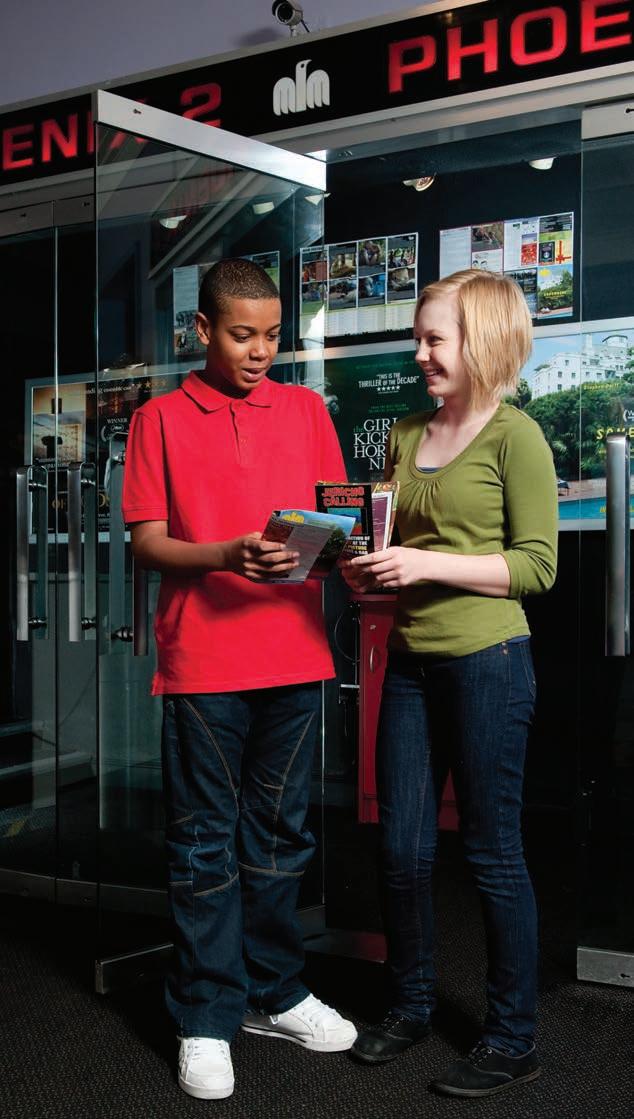
(1) … is on. Do you like romantic comedies?
I don’t like horror films. They’re awful. How about (3) … ? Do you like science-fiction?
I really like them. They’re great.
Talking about likes and dislikes
Do you like romantic comedies? What do you think of animated films?
I really like them. They’re great.
I like western films.
I don’t mind science-fiction.
I don’t like horror films. They’re awful. I can’t stand romantic comedies.
Good idea.
16 MODULE 1 Film and TV
Speaking task
Prepare a dialogue between you and Will.
Step 1
First, choose a film you want to see.

Step 2
Think about what Will says.
What’s on?
I can’t stand … What about … ?
I don’t mind … What do you think of … ?
Let’s see … !
Think about what you say.
… is on. Do you like … ?
I don’t like … How about … ?
I really like … They’re great. Good idea.
Step 3
Write your dialogue.
Step 4
Work in pairs. Take it in turns to practise your dialogue.
Culture Film awards
The Academy Awards, or the Oscars, are the most famous film industry awards in the English-speaking world. They are given to people who work in the film industry, such as actors, directors and writers, and the winners receive a gold statue. Every year this award ceremony is held in late February or early March in Hollywood, in the USA. The British equivalent of the Oscars is the British Academy of Film and Television Arts Awards, or BAFTAs. Winners of the British award win a gold theatrical mask.
In 2009, the British film Slumdog Millionaire won eight Oscars including Best Picture and Best Director. It also won seven BAFTAs. Slumdog Millionaire is about an 18-year-old finalist on the Indian version of the popular TV quiz show Who Wants To Be A Millionaire?


7
Read and listen to the information about film awards. Then answer the questions.
1 What do the winners of the Oscars receive?
2 When are the Oscars?
3 Which British film won eight awards, including Best Picture, in 2009?
4 What is the British equivalent of the Oscars?
8 Read the text and fill in the application form.
My name is Paul Smith. I am 13 years old and I am from the UK. I live with my family at Brighton Road, London. Our postcode is NW10 0AA. My mobile number is 0386428643. I’m studying at King’s College School. Today I’m joining the Kino Film Club.
Kino Film Club Application Form
Mr / Mrs / Miss (delete as appropriate)
Surname … School … First name … Age … Mobile … Address …
17 MODULE 1 Film and TV
1b
1 Look at the TV guide. Match the TV programmes with the words in the box. Which four words do you not use?
Vocabulary
cartoon chat show comedy programme documentary drama game show reality show soap opera sports programme the news






2 Listen and repeat.
3 Use the words in exercise 1 to write sentences about your favourite TV programmes. My favourite cartoon is ”Tom and Jerry”.
4 INTERFACE Work in pairs. Ask and answer questions about the time when your favourite TV programmes are on. It’s Tom and Jerry. What about you? What’s your favourite cartoon?
We use cardinal numbers to express time and schedules. The tennis championship is at 5 o’clock on channel 3. The train leaves at 7 am.
5 Read and listen to the text on page 19. Do young people watch more TV than their parents?
6 Read the text again. Are the sentences true or false? Correct the false sentences. Young people watch TV online. F Young people don’t watch TV online.
1 Parents watch TV for about three hours a day. 2 Many young people watch DVDs every day. 3 Young people have a healthy lifestyle. 4 Over half of teenagers have a computer in their room.
5 Lots of teenagers are tired at school.
Reading
Channel One Channel Two Channel Three 5.00 The Simpsons 5.00 Lost 5.00 World Championship Tennis
The Simpsons have another adventure in the town of Springfield.
The survivors of the air disaster look for food.
Famous
win lots
prizes. 1 2 3 4 5 6
Action from today’s Men’s Final at Wimbledon.
6.00 The News and Weather at Six6.00 Doctors without Frontiers6.00 The Price is Right All the day’s news and the weather for tomorrow.
doctors volunteering in Africa. Contestants compete to
of
Unit TV programmes
18 MODULE 1 Film and TV

Too much TV and not enough sleep?
Do your parents say you watch too much TV? Do they think you always watch cartoons and reality shows? A new report says that young people often watch just one and a half hours of TV a day but their parents usually watch twice as much. This report also says that young people don’t watch many DVDs on their TVs. This generation prefers computers, so do young people often watch TV online? No, they don’t. They sometimes watch DVDs on their computer but only for about two hours a week.
Does this mean that teenagers go outside and do lots of sport? Unfortunately, no. The computer is now a replacement for the TV and a lot of teenagers spend their time on their computers: they surf the internet, play video games and download music. More than 50 per cent of 11–13 year-olds have got a computer in their room and they don’t get enough sleep because of it. Teenagers often sleep for only four hours so they are very tired the next day at school.
Do you agree? Do you usually stay up late in the week? We want to hear from our readers.
Grammar Prepositions of time
AT time holidays expressions at 5 o’clock at Christmas, at Easter at night / at the weekend
ON days dates
part of a day adjective + day on Sunday on 20th June 2010 on Tuesday morning on a summer day
IN months seasons
years centuries expressions in July in (the) summer in 2021 in the 20th century in the morning / afternoon / evening
7 Fill in the gaps with the correct preposition of time, then answer the questions.
What do you often do … winter? What do you often do in winter?
1 What time do you get up … the morning?
2 What time do you eat dinner … night?
3 Do you go swimming … a hot summer day?
4 What do you do … the weekend?
5 What do you usually do … Sundays?
8 Fill in the gaps with in, on or at and one of the phrases in the box.
January 7th May Friday evening 10 am Christmas morning
Lucy and Joe have classes … .
Lucy and Joe have classes in the morning
1 The train leaves … from platform 3.
2 Tom usually goes skiing … .
3 We watch our favourite TV show … .
4 The school festival takes place … .
5 My cousins live in Cluj-Napoca and we meet … when the family gets together.
Grammar guide 1 page 135
19 MODULE 1 Film and TV
Writing My favourite TV programme
1 Read and listen. Then answer the questions.
1 What is Sophie’s favourite TV programme?
2 What type of programme is it?
3 What is it about?
4 Why does she like it?
What’s your favourite
TV programme? TV
This week Sophie, 11, tells us about her favourite TV programme. I don’t watch TV every day but I often watch my favourite programme Glee. It’s an American comedy programme and it’s on TV once a week. On Sundays, you can watch the repeat. This programme is very popular.
Glee is about a singing club in an American high school. I really like this programme because the characters always do funny things. I really recommend this programme to people who like music and dancing.
Language
Punctuation
We use capital letters:

1) at the beginning of all sentences
2) for the subject pronoun ‘I’
3) for names and places
4) for countries, languages and nationalities
5) for days and months
Punctuation includes:
1) full stops (.)
2) question marks (?)
2 Look at the rules for capital letters in the Language focus. Are they the same in your language?
3 Rewrite these sentences with the correct punctuation.
1 neighbours is an australian soap opera
2 do you like sports programmes
3 i often watch a game show on saturdays
4 my favourite actor in the programme is james carmichael
5 what is your favourite television programme

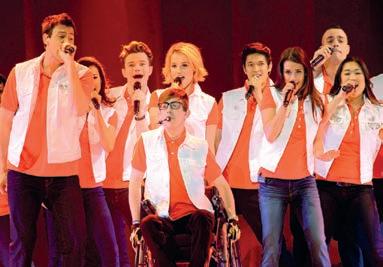
4
Write about your favourite TV programme. Follow these steps. Use 80–100 words.
Writing about a favourite TV programme
Step 1 Plan
Choose a TV programme. Make some notes under four headings:
1 What is your favourite programme?
2 How often do you watch it?
3 What is it about?
4 Why do you like it?
Step 2 Write
Write a first draft. Use your notes from Step 1 and the model text on this page to help you.
Step 3 Check
Check your work, especially the punctuation.
Step 4 Write
Write your final copy and hand in your work.
20 MODULE 1 Film and TV
Music
The 1960s
The Beatles are the most successful band in history. They sold more than one billion records and were a product of the 1960s, a decade many refer to as the Swinging Sixties. The Beatles had a big influence on pop and rock music and a lot of bands today use the same ideas as they did. Firstly, they were the songwriters as well as the performers. Two members of the band, Paul McCartney and John Lennon, wrote most of the songs. They also played instruments, such as guitars, the drums and vocals. Their songs were short and the lyrics were easy to memorize. The melody of the song was very simple but effective and the chorus often repeated the title of the song. The Beatles weren’t the only band who used this formula. The Rolling Stones, The Kinks and The Who all influenced pop and rock music and they were all popular in the 1960s.
Read and listen. Answer the question. Who wrote most of The Beatles’ songs?
Vocabulary guide Film types









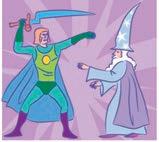











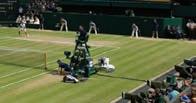

action adventureanimated comedy fantasy horror musicalromantic comedyscience-fictionthriller war western TV programmes cartoon chat showcomedy programmedocumentary drama game show reality show soap operasports programmethe news
21 MODULE 1 Film and TV
Self-check 1
1 Order the letters to make film types.
1 hoorrr 5 tedmiana 2 eenrstw 6 ehillrrt 3 aafnsty 7 arw 4 cdemoy 8 niotac
2 Write the types






3 Complete the questions with the words in the box. how what when where who why
1 … do you watch TV, in the morning or in the evening?
2 … ‘s your favourite TV programme?
3 … ‘s your favourite actor?
4 … do you like him / her?
5 … often do you watch cartoons?
6 … do you do your homework, in your bedroom or in the living room?
/ 12
4 Use do / does and order the words to make questions in the present simple. Then write short answers.
1 at the weekend / go / you / to the cinema ?
2 war films / your best friend / like ?
3 from the USA / Johnny Depp / come ?
4 a lot of TV / your parents / watch ?
5 watch films / you / on your computer ? ---- / 10
5 Complete the sentences with at, on or in.
1 You can plant these flowers … the autumn.
2 Is your neighbourhood quiet … night?
3 My birthday is … the 10th of January.
4 He walks the dog … the evening.
5 I don’t work … Christmas day.
6 We usually stay home … Easter.
7 Every year I visit my grandparents … summer. ---- / 14
6
Complete the dialogue with the correct form of the verbs in brackets.
Will How often (1) … you … (watch) television?
Izzie Oh, every night. (2) … you often … (watch) documentaries?
Will No, I don’t. I (3) … (like) cartoons and sports programmes. (4) … you … (like) sports programmes?
Izzie They’re OK. (5) … you … (have got) a favourite TV programme?
Will I’m not sure. Football Focus (6) … (be) good.
Izzie When (7) … (be) it on television?
Will It (8) … (be) on television every Saturday. How about you? What (9) … (be) your favourite TV programme?
Izzie Neighbours
Will On, no! I (10) … (not like) soap operas. They are terrible! ---- / 20
7 Writing: Write about your favourite TV programme. Mention when it is on, what it is about and why you like it. Use 60–80 words.
Now I can
Ø talk about film types & TV programmes; Ø correctly use present simple & prepositions of time;
Ø talk about likes & dislikes;
Ø write about a favourite TV programme.
----
Total ----
/ 30
/ 100
---- / 8
of TV programme. 1 2 3 4 5 6 ---- / 6
----
Don’t forget to complete the Behaviour observation sheet according to the example on page 7! 22 MODULE 1 Film and TV
ADVENTURE MODULE 2
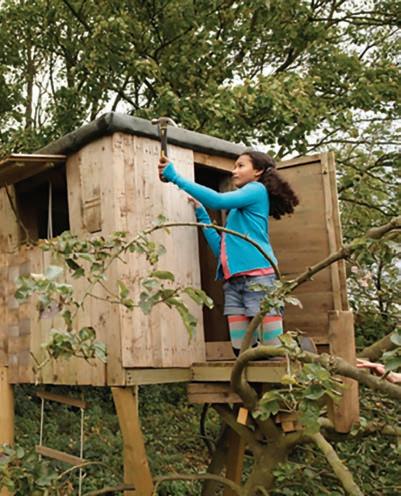


IN THIS MODULE YOU WILL LEARN:
Vocabulary
Grammar
Reading
Speaking
Writing
Culture
CLIL
• Survival skills
• Feelings
• Present continuous
• Present simple vs. present continuous
• Survive in the Wild
• Life with the Tribe
• A school trip
• Making plans
• A blog entry
• Summer camps
• Science
Find the page numbers for:
Ø people hiking in the mountains
Ø a man fishing
Ø a palm tree
Competences: 1.1; 1.2; 2.1; 2,2; 2.3; 2.4; 3.2; 3.4; 4.2; 4.3. 23
Vocabulary

1 Match pictures 1–5 with the words in the box. Which five activities aren’t in the pictures?
build camp chop climb cook find fish hike look for sleep
2 Listen and repeat.
Can you survive in the wild?

4 Make phrases with the verbs in exercise 1 and the words below. fires animals food fruit in a river in a tent trees wood Now say it!
Learn how to on one of our fantastic courses! 5 Listen to Lou and Will. What survival skills has Will got?
(0) Hike / Look for in the mountains during the day and at night (1) sleep / find outdoors under the stars! (2) Cook / Camp your own food! Learn how to (3) fish / find in lakes and rivers and (4) camp / climb trees. We teach you to (5) hike / chop wood and (6) build / sleep a fire.
3 Choose the correct words. Call us on 027 578 088 TODAY!
6 Work in pairs. Ask and answer questions about your survival skills. Yes, I can build fires. Have you got any survival skills?
1
2 2a Unit Survival skills MODULE 2 Adventure 24

7 Read the text quickly. Which survival skills does it mention?
8 Read, listen and check your answers.
9 Read the text again. Are the sentences true or false?
1 British people don’t like camping.
2 Survive in the Wild isn’t for children.
3 You can learn three skills on a Family Day course.
4 You sleep at home during the Adventure Weekend.
5 The River Safari starts on a Friday afternoon.
10 Which is the best course for people who …
1 … enjoy adventure, like sleeping outdoors, and are free for two days?
2 … love learning new things and spending time on the water?
3 … want to learn survival skills but are only free on one day?
Write down nouns with their verbs. prepare food, chop wood, build a fire
11 Make can sometimes mean create. Which words below do not go with make? Which verb do they go with? a canoe an exam a fire homework
12 CLASS VOTE Which Survive in the Wild course would you like to do? Why?
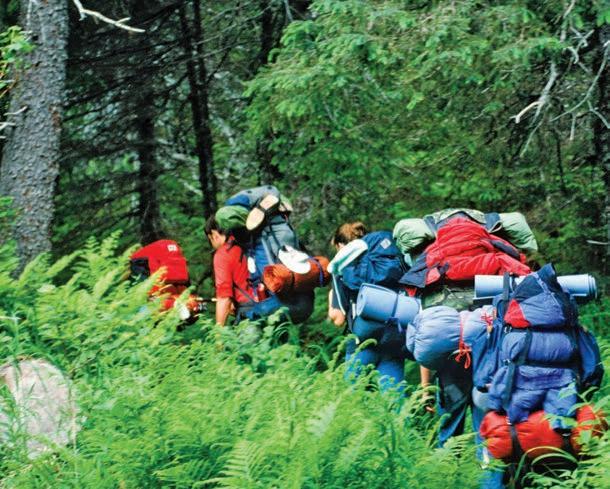
In the UK, camping is becoming very popular. People are bored by life in the city and they are looking for ways to get back to nature. Survive in the Wild is an organization that teaches people how to survive outdoors by using natural resources. Basic survival techniques include how to hunt, fish and prepare food and how to stay warm and safe. Here are three of the survival courses you can try.
On the Family Day course, you learn three basic skills in a day: how to build a fire, how to look for food and how to cook food. At the moment, a family is making a fire with friction.
If you’re looking for adventure and you are free for the whole weekend, try the Adventure Weekend. Some people are making simple tools for hunting and a boy is climbing a tree. He’s sleeping outdoors tonight, so he’s looking for wood to build a fire.
Alternatively, why not try the Two-day River Safari? You can make a canoe and learn a lot of new skills. The course begins every Friday after school and there are lots of activities on offer. One family is fishing, others are swimming, and the safari leader is chopping wood to build a fire.
3 4 5 Reading
MODULE 2 Adventure 25
Grammar
Present continuous
affirmative
long form short form
I am snowboarding.I’m snowboarding
You are doing exercises. You’re doing exercises. He / She / It is dancing.He / She / It’s dancing
We / You / They are running We / You / They’re running
negative
long form short form
I am not training.I’m not training
You are not skiing.You aren’t skiing
He / She / It is not jumping.
We / You / They are not skating
He / She / It isn’t jumping.
We / You / They aren’t skating
1 Look at the sentences in the table and complete the rules.
a) We form the present continuous affirmative with subject + (1) … + verb + -ing
b) We add (2) … after be and before the verb + -ing to form the negative.
2 Complete the sentences with the present continuous form of the verbs in brackets. Use the spelling rules on page 136.

questions and short answers
Am I playing football?
Yes, I am. No, I’m not.
Are you swimming?
Yes, you are No, you aren’t
Is he / she / it running?
Yes, he / she / it is No, he / she / it isn’t
Are we / you / they cycling?
Yes, we / you / they are. No, we / you / they aren’t.
3 Complete the text with the correct form of the verbs in brackets. Use the present continuous affirmative or negative.
My name is Lucy and I (0) am writing (write) my diary on a catamaran.
I (1) … (share) a cabin with Sophie and Kia. At the moment Sophie and Kia (2) … (not work), they (3) … (chat). My brother Jack is also here. But today he (4) … (not feel) well. He (5) … (rest) on his bed. We (6) … (try) lots of new activities. It’s great!

4 Look at the sentences in the table. Do we repeat the -ing form in the short answer? Give examples.
5 Write complete questions.
you / eating well?
Are you eating well?
1 you / sleep in a bed?
2 the sun / shine?
3 your brother / make / new friends?
4 your friends / have / a good time?
5 you / swim / in the sea?
These young people are learning (learn) how to sail.
1 They … (sleep) on the catamaran for a week.
2 The group leader … (put on) his life jacket.
3 He … (demonstrate) the safety instructions.
4 The cook … (make) dinner in the kitchen.
5 We … (have) a fantastic time! Come and join us for a Big Catamaran Adventure!
6 Listen to Lucy and her mum. Check your answers in exercise 5.
7 INTERFACE Work in pairs. Imagine you are at a summer camp. Ask and answer the questions in exercise 5.
MODULE 2 Adventure 26
Present continuous is used for:
• actions happening at the time of speaking: I’m watching a movie now.
• temporary situations:
She’s working on a new project these days.
• plans and future arrangements:
I’m going fishing tomorrow afternoon.
We’re sleeping on a boat next week.
• annoying habits (with always): You are always using my laptop!
8 Look at Will’s diary. Complete his plans with the time expressions in the box. on Friday on Saturday morning this afternoon tomorrow morning on Saturday evening on Wednesday
Listening Young adventurers
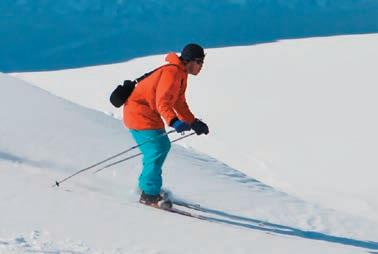
5 pm: play basketball 9 am: do English exam
7 pm: have pizza with Lou and Izzie 10 am: go swimming with Dad
7 pm: Lou has a party!
I’m playing basketball … .
I’m playing basketball at 5 pm on Wednesday.
1 We’re having an English exam … .
2 Lou and Izzie are having pizza with me … .
3 My dad and I are going swimming … .
4 Lou is having a party … .
9 INTERFACE Work in pairs. Ask and answer questions about your plans for this week. I’m playing tennis.
What are you doing this afternoon?
S i n g i n g t i m e !
Follow this link: https://www.youtube.com/ watch?v=JXp9EDYneEw
a) Listen to the song and watch the lyrics. Write down five sentences with the Present Continuous.
b) Bring the song to the class to sing it together.
Grammar guide 2 page 136

10
Look at the pictures of Parker Liautaud and Jordan Romero. What are they doing?
11
Listen to a radio programme about the adventurers in exercise 10. Match each adventurer with two destinations a–d.
a) the North Pole b) Mount Everest c) Kilimanjaro d) the South Pole
12 Listen again and choose the correct words. Parker Liautaud is 15 / 16 years old.
1 He’s going on his adventure next year / month
2 His body needs 5,000 / 10,000 calories a day.
3 Jordan Romero climbed Kilimanjaro three / four years ago.
4 He is training at home / in another country
5 Jordan Romero is / isn’t missing school.
13 Do you enjoy adventure? Would you like to climb Mount Everest?
At 8,848 m Everest is the highest mountain on Earth. However, Mauna Kea in Hawaii is 10,200 m from its base to its peak, but only 4,205 m is above sea level.
WednesdayThursdayFridaySaturday
1 2
MODULE 2 Adventure 27
Speaking A school trip
Listen
1 Look at the picture. What can you see? What are they doing?
2 Listen to the dialogue. Where are Will and Lou going at the weekend?
3 Listen again and complete the dialogue.
Are you going on the school camping weekend?
Good idea! Are you free after school tomorrow?
Yes, that’s fine. Where shall we meet?
All right. What time?
Yes! Let’s buy our (1) … together.
Sorry, I’m busy. What about on Tuesday (2) … ?
Great! See you then! Sounds good. See you then!

Practise
4 Listen again and act out the dialogue.
5 Put the sentences below in the correct order.
… OK. What time?
… Sounds good. See you then.
… I’m busy. What about tomorrow morning?
… Are you going on the adventure holiday?
… How about meeting at half past nine?
… Yes, let’s buy our clothes together. Are you free this afternoon?
Making plans
Are you free after school tomorrow?
Sorry, I’m busy. What about on Tuesday afternoon? Where shall we meet?
What about in front of the supermarket? What time?
How about meeting at half past four?
How about meeting at half past (4) … ?
What about in front of the (3) … ?
MODULE 2 Adventure 28
Speaking task
Prepare a dialogue between you and Will.
Step 1
First, look at the poster below and decide what you need to buy.
17th – 19th
You need:
• waterproof jacket and shoes
• sunglasses
• a sleeping bag
Step 2
Think about what Will says.
Are you going on the sailing weekend?
Are you free … ?
That’s fine. Where shall we meet? What time?
See you then!
Think about what you say.
Yes! Let’s buy … together.
Sorry, I’m busy. What about … ?
What about … ?
How about meeting at … ?
Great! See you!
Step 3
Write your dialogue.
Step 4
Work in pairs. Take it in turns to practise your dialogue.
Culture Summer camps
The first summer camp was in America in 1861. Today more than 10 million young people go to one of 12,000 summer camps across the USA. There are speciality camps where children learn specific skills. For example, in sports camps young people learn to play baseball and football. There are even rock music camps, where they learn to play musical instruments, such as the guitar and the drums. There are adventure camps, where children go swimming in the sea or hiking in the mountains.
Young people in the UK can join the Woodcraft Folk. This is a group which organizes summer camps during the school holidays. Teenagers aged between 13 and 15 are called Venturers. Every three years there’s a national Venture camp. About 600 teenagers camp together, try new activities and, of course, make new friends while learning about the environment, world peace and other global issues.

6
Read and listen to the information about summer camps. Then answer the questions.
1 How many people go to summer camps?
2 What different kinds of camps are there in the USA?
3 What is Venture camp?
7 Write a brief message to Santa Claus, inviting him to the winter camp you are going to. Exchange notebooks to reply to a classmate’s message as Santa.
MODULE 2 Adventure 29
Vocabulary
Look at the words in the box. Check their meaning.





Answer the questions so they are true for you. Use words from exercise 1.
How do you feel … … before an important exam?
feel nervous.
… when you see an enormous spider?
… when your classmate breaks your things?
… when you don’t pass an exam?
Reading
6 Before you read look at the words in the box. What do you think the text is about? documentary isolation the wild tribe
Read and listen. Check your answers.

Are you bored by daily life? Do you want to spend a month in isolation with a tribe in the African savannah or on an island in the Pacific Ocean?
Find out how a family is surviving in the wild as they live, sleep and eat with a tribe in this brand new documentary series, Life with the Tribe.
Programme Three
Day Three
Charlie Timms is adapting to his new life in the savannah. In the UK, he usually gets up at 7.30 am, and he goes to work by train. This month, however, he’s getting up when the sun rises at 6 am and he’s looking after the tribe’s animals. He never makes lunch at home but in this picture he’s making lunch for the whole tribe! Everyone is learning new skills. His children are building a house in the trees.
Day Five
Charlie is fishing in the river today. He is really excited because there are some elephants walking in the river. He normally feels nervous in a boat or near the sea, but today he’s feeling fine. The family is really pleased with their new life, and they’re excited about their adventure.

7
1
angry
excited jealous
2
3
4
bored embarrassed
nervous pleased sad scared surprised tired worried
Listen and repeat.
Complete the sentences with words from exercise 1.
2
3
4
5
3 She looks … .I’m … .It’s … . 1 2 My mum’s … .He’s … .We’re … . 5 4 6
I
1
… after a long day at school?
INTERFACE Work in pairs. Ask and answer the questions in exercise 4.
2b Unit
MODULE 2 Adventure 30
Feelings
8 Read the text again. Are the sentences true or false? Correct the false sentences.
Life with the Tribe is a comedy programme. F Life with the Tribe isn’t a comedy programme. It’s a documentary series.
1 Charlie’s getting up at the same time as usual.
2 He’s making lunch for his family.
3 His children are bored because they’re doing nothing.
4 Charlie doesn’t usually like the sea.
9 Fill in the gaps with the correct words from the text.
Charlie Timms and his family are living in the … this month.
Charlie Timms and his family are living in the savannah this month.
1 They are … in the wild as they live with a … .
2 Everyone is learning new … .
3 His children are building a … in the trees.
4 The family is … with their new life and they are … about their adventure.
Grammar Present simple vs. present continuous
Present simple
expressing habits:
We have dinner at 7 pm every evening.
expressing routines: I take the bus to school every morning
expressing timetables, schedules, programmes: The plane leaves at 8
Present continuous
expressing actions happening at the time of speaking: I’m having dinner at the moment.
expressing temporary situations: He’s looking for a new job these days
making plans, fixed arrangements for the near future: They’re flying to London in two hours expressing permanent states: We live in Romania. with always to express annoying habits: You are always forgetting things!
time expressions: every day / weekend / year etc., always, usually, never, on Mondays, once a week etc.
10
Copy and complete the table with the time expressions in the box.
always at the moment every weekend never now on Mondays once a week this week today usually
present simplepresent continuous always
11 Choose the correct words.
Channel 5
9 pm – Life Swap
Liam and Liz are teenagers …
1 … but they usually do / are doing completely different things.

2 Liam is sporty. He always plays / is always playing sports.
3 Liz is very different. She sings / is singing in the choir once a week.
4 This week they swap / are swapping lives, families and friends.
5 Liam stays / is staying with Liz’s family at the moment and Liam’s parents look after / are looking after Liz.
time expressions: at the moment, now, this week, these days, today etc.
State verbs, which describe a state rather than an action, do not normally have continuous tenses. They include: like, love, hate, see, hear, think, belong, know, understand etc.
I love camping.
I’m loving camping
12 Put the verbs in brackets into the present simple or present continuous.
Sylvia is watching (watch) a documentary right now.
1 What sports … you … (play) today?
2 You … always … (take) my bike without asking!
3 I usually … (play) volleyball on Wednesdays.
4 I … (not sleep) outdoors very often.
5 … you … (want) to go fishing today?
6 I … (not think) he’s lying.
7 In Life with the Tribe a family … (spend) a month in isolation with a tribe.
8 He … always … (interrupt) the teacher!
Grammar guide 2 page 136
MODULE 2 Adventure 31
Writing A blog entry
1 Read and listen. Then answer the questions.
1 Where is Tommy?
2 What is he doing on day one?
3 Who is he with?
4 Is everyone having a good time?

Language
Conjunctions

Join your sentences with and, but and because. We’re hiking along the coast and I’m excited! I don’t normally like adventure but I’m having a good time.
My sister isn’t here because she’s studying.
2 Look at the sentences in the Language focus. Complete the rules with and, because or but.
1 We use … to contrast different information.
2 We use … to add similar information.
3 We use … to give a reason for something.
3 Rewrite the sentences. Use and, because or but. It’s a fantastic day. I’m happy.
It’s a fantastic day and I’m happy.
1 He often fishes in the lake. He doesn’t like eating fish.
2 I’m chopping wood. I’m building a fire.
3 I never climb trees with my friends. I’m scared.
4 We’re camping tonight. My mum isn’t coming.
5 They’re looking for food. They’re hungry.
4 To practise your writing skills, go to Writing guide 1 on page 108.
Day one
It’s the first day of our holiday. We’re in Cornwall, in the southwest of England. Today we’re hiking along the coastline and I’m excited! We’re hiking about 20 km. There are four of us in the group. The group leader, Michael, works as a PE teacher in a school. He often walks long distances. His wife, Jane, is a nurse and she’s great. My dad is with us too. He loves climbing mountains. And finally, there’s me. I don’t usually like adventure but I’m having a good time. My sister isn’t here because she’s studying. She’s very jealous.
Day two
I’m surprised because we’re walking fast today. We’re sitting on some rocks at the moment because we’re having a sandwich. Tonight we’re camping outdoors and Michael and Jane are building the shelter. Everyone is happy!
More again soon, Tommy
5 Write a blog entry. Follow these steps. Use 80–100 words.
Writing a blog entry
Step 1 Plan
Decide where you are going on your holiday. Make notes under four headings:
1 Where are you?
2 What are you doing now?
3 Describe your companions.
4 What are your plans for later?
Step 2 Write
Write a first draft. Use your notes from Step 1 and the blog on this page to help you.
Step 3 Check
Check your work. Connect some of your sentences with and, because and but.
Step 4 Write
Write your final copy and hand in your work.
MODULE 2 Adventure 32
Science Plant life
Most plants have got three parts: roots, stems and leaves.
Roots have three main functions: firstly, they provide support for the plant and hold it in the ground. Secondly, they absorb water and minerals from the soil, and thirdly, they allow the transportation of water and minerals from the soil to the plant. The stem supports the plant and carries the water and minerals to the leaves.
Leaves grow on the stem of the plant and provide food for the plant. Their main role is photosynthesis. They use the sunlight energy to make sugars from carbon dioxide and water, which helps them grow. Some plants have flowers too. These grow on the stem of the plant.

Read and listen. Answer the question. What is the main purpose of leaves on a plant?
Vocabulary guide Survival skills


Feelings

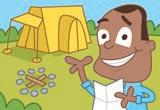












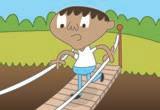





build camp chop climb cook find fish hike look for sleep
angry bored embarrassed excited jealous nervous pleased sad scared surprised tired worried
MODULE 2 Adventure 33
MODULE 2
Self-check 2
1 Match 1–5 with a–e to make survival skills.
1 build a) food
2 chop b) outdoors
3 hike c) wood
4 cook d) in the mountains
5 sleep e) fires
2 Find seven feelings in the wordsearch.
---- / 7
3 Choose the correct words.
1 My cousin lives / is usually living in New York.
2 At the moment he stays / is staying with us.
3 In New York he plays / is playing basketball every day.
4 He doesn’t play / isn’t playing basketball today.
5 We fish / are fishing in the river now.
6 I write / am writing an essay every month. ---- / 6
4 Order the words to make questions.
1 he / fishing / Is ?
2 fires / they / Are / building ?
3 chopping / Is / wood / she ?
4 Are / looking for / you / food ?
5 trees / Am / climbing / I ? ---- / 10
5 Complete the sentences with the correct form of the verbs in brackets.
1 I … (eat) pizza for dinner today.
2 We … (meet) our friends tonight.
3 My friends … (hike) on Saturday.
4 My teacher … (not work) this summer.
5 I usually … (study) in the school library.
6 Students … (not use) often their computers at school.
7 You … (swim) this week? ---- / 14
6 Rewrite the sentences in exercise 5 so they are true for you. Use the correct time expression. ---- / 14
7 Complete the sentences with the correct form of the verbs in brackets.
1 He … (climb) trees in summer.
2 They … (not build) camps on holidays.
3 She … (fish) today.
4 I … (not chop) wood now.
5 We … (sleep) outdoors tonight.
6 You … rarely (cook) in the forest. ---- / 6
8 Complete the dialogue. Use the correct form of the verbs in brackets.
Will (1) … (be) you free after school today?
Lou Yes, I (2) … but I usually (3) … (go) to scouts on Fridays.
Will Is there scouts today?
Lou No there isn’t. They (4) … (camp) this weekend but I (5) … (not go) with them.
Will We (6) … (fish) this afternoon. Do you want to come?
Lou Oh, yes please. What time?
Will We (7) … (meet) at five o’clock next to the river.
Lou Do I need to bring anything?
Will No, you don’t. My dad always (8) … (bring) the equipment.
Lou Sounds good. See you then!
Will Great! See you then! ---- / 8
9 Writing: Write a blog entry from a summer camp you are participating in. Mention where you are, what activities the camp offers, what your daily programme is and why you like being on the camp. Use 60–80 words.
/ 30
---- / 100
Now I can
Ø talk about survival skills & feelings; Ø correctly use present tense simple & continuous; Ø make plans; Ø write a blog entry.
Don’t
----
Total
----
/ 5
ANGRYXYSAD QEDSCAREDG BRJDJELDGF OVEWBZLGMA ROUTIREDKH EUXSEOLPAW DSURPRISED
forget to complete the Behaviour observation sheet according to the example on page 7!
34
Adventure



IN THIS MODULE YOU WILL LEARN:
Vocabulary
Grammar
Reading
Speaking
Writing
Culture
CLIL
• Discoveries
• Natural disasters
• be: past simple
• Past simple: regular and irregular verbs
• A discovery of food
• Great European disasters
• At the library
• Asking for information
• A biography
• Explorers
• Art
Find the page numbers for:
Ø astronauts on the Moon
Ø a volcanic eruption
Ø Leonardo da Vinci’s photo
MODULE 3
Competences: 1.1; 1.2; 2.1; 2.2; 2.3; 3.2; 3.4; 4.2. 35
HISTORY

Vocabulary
Verbs of discovery


c) Roald Amundsen and his team go to the South Pole in 1911.
d) Amelia Earhart is the first woman to fly solo across the Atlantic in 1932.
e) Neil Armstrong and Buzz Aldrin are the first men to land on the Moon in 1969.
f) Steve Fossett is the first person to travel solo around the world in a hot-air balloon in 2002.

Match sentences a–f with pictures 1–6.
a) Ferdinand Magellan’s ships sail across the Pacific in 1521. b) Captain Cook and his men discover Australia in 1770.
1
the verbs in the box and check their meaning. arrive discover drive explore fly go land leave ride sail take off travel 2 Listen and repeat. 3 Copy and complete the table with the words in exercise 1. Which words relate to all three? by landby seaby air drive 4 Order the letters and write the words. l e e v a l eave 1 r e d v i 2 f y l 3 e i d r 4 n a d l 5 o g 5
Read
Now say it! 6 Listen to Izzie
exercise 5 do they want to do? 7 Work
a journey. I
want to do? 3 2 1 3a Unit Discoveries
and Will. Which journey in
in pairs. Ask and answer questions about
don’t want to fly across the Atlantic. I hate flying! Which journey do you
MODULE 2 Adventure 36 MODULE 3 History
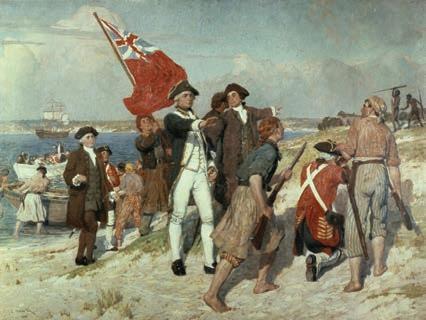

Reading
8 Read and listen to the text. Complete the sentences with the words in the box.
biscuits fruit pasta tomatoes
1 Originally, … were from America.
2 You need wheat flour to make modern … .
3 There were … in Spain before other countries in Europe.
4 They put … in the snow to make a dessert.
9 Answer the questions.
1 What did explorers discover in the 16th century?
2 What did the Persians cook before the Europeans?
3 Why were the Arabs responsible for modern pasta?
4 What did Marco Polo really discover?
5 What dessert did the Italians invent?
Many words for people end in ‑er and ‑or. They often come from verbs. discover – discoverer travel – traveller sail – sailor
10 Write the verbs corresponding to the people below.
1 explorer 2 inventor 3 coloniser 4 trader 5 driver 6 navigator
11 CLASS VOTE Which is your favourite story. Why?

A discovery of food
A lot of food started its history in very different countries. European explorers discovered potatoes, tomatoes, chocolate and vanilla in America in the 16th century and rice began its journey in China. But what about other favourites?
a Biscuits
Biscuits are a favourite with everyone, but where were they discovered? The Persians cooked the first biscuits with sugar in the 7th century. The Arabs invaded Persia at that time and they loved them. Later, they took the biscuits to the rest of their empire, including Spain. From Spain, traders took biscuits to North Europe, and then English colonizers sailed to America and made them there. This is how the American version of the biscuit, the cookie, was born.
b Pasta
People often say that the explorer Marco Polo discovered pasta in China, but this isn’t true. In fact, Greeks ate something similar to lasagna in the 1st century. But it was the Arabs who were responsible for modern pasta because they introduced wheat flour to Sicily, in the south of Italy. Pasta, as we know it, was created in Italy in the 13th or 14th century.
c Ice cream
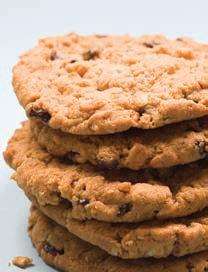


Ice desserts were popular a long time ago. The Persians (400BC) and the Chinese (200BC) enjoyed snow and ice with fruit and honey. Marco Polo discovered a technique for making ice desserts in China and transported it to Italy. So the first modern sorbets were from Italy, but the first ice cream made with milk and cream appeared in 1718 in England!
5 4 6 37 MODULE 3 History
Grammar Past simple
be: past simple
affirmative, negative and interrogative
I / He / She / It was from Italy.
+
–
?
We / You / They were popular.
I / He / She / It wasn’t the discoverer.
We / You / They weren’t from the USA.
Was I / he / she / it late?
Were we / you / they on time?
• The past simple of regular verbs is verb + ‑ed: work – worked.
• Verbs ending in consonant + y, omit -y and add ‑ied: try – tried
• Verbs ending in a stressed vowel + a consonant (except w, x or y), double the final consonant and add ‑ed: drop – dropped.
• The past simple of irregular verbs has different forms. They are the same for I, you, he, she, it, we and they: I / You / He / She / It / We / They went to a camp last year.
1 Complete the sentences with the correct form of be. Use the past simple affirmative or negative.

Around the World in Eighty Days is a story about a man’s journey around the world in a hot-air balloon.
The man’s name … Phileas Fogg. ✓
The man’s name was Phileas Fogg.
1 Phileas … alone on his journey. ✗
2 There … two companions. ✓
Past simple
affirmative regular verbs: short infinitive + -ed
I / He / She / It visited Spain.
We / You / They travelled by plane.
affirmative irregular verbs: 2nd form of the verb (see table on pages 143-144)
I / He / She / It ran in the park.
We / You / They went to the cinema.
3 There … any cars or planes. ✗
4 There … hot-air balloons, ships and trains. ✓
5 It … Saturday when they arrived home. They finished their journey exactly on time! ✓
2 Complete the sentences with the past simple form of the verbs in brackets.
Martha … (arrive) late for school last Monday. Martha arrived late for school last Monday.
1 We … (watch) a history documentary last night.
2 She … (cry) when he … (arrive) home.
3 They … (travel) by train to Venice.
4 Ferdinand Magellan … (want) to sail around the world but he … (die) in the Philippines.
3 Check the irregular verbs on pages 143–144 and write the past simple form of the verbs in the box.
find get leave sell take
4 Read the text using the correct form of the verbs in brackets. Use the past simple affirmative.
The history of the potato
Europeans first (0) discovered (discover) potatoes in Chile. Sailors (1) … (take) the potatoes on their ships. They (2) … (eat) them as they (3) … (sail) across the ocean. They (4) … (leave) the potatoes in Ireland. Then potatoes (5) … (become) very popular in the rest of Europe.
MODULE 2 Adventure 38 MODULE 3 History
Pronunciation
/ʊ/ /ɔː/ /eɪ/
a Read and listen to the words. /ʊ/ took looked /ɔː/ saw bought /eɪ/ made became
b Listen again and repeat.
negative regular / irregular verbs: Subject + didn’t + short infinitive
I / He / She / It didn’t visit London.
We / You / They didn’t go to the cinema.
5 Look at the sentences in the table. Is the negative form different for regular and irregular verbs?
6 Read the sentences correcting the historical facts.
Magellan sailed around Africa. (South America) Magellan didn’t sail around Africa. He sailed around South America.
1 Marie Curie discovered uranium. (radium)
2 Hannibal took camels over the Alps. (elephants)
3 Alexander the Great rode an elephant called Bucephalus. (horse)
4 Edmund Hillary and Tenzing Norgay climbed the Andes in 1953. (Mount Everest)
We often use time expressions with the past simple: last night, on Monday, yesterday, in 2009, two years ago.
7 Write sentences that are true for you. Use the past simple, time expressions and the ideas in the box.
cook dinner drink juice eat a biscuit go shopping read a book watch TV
I didn’t read a book yesterday.
8 INTERFACE Work in pairs. Compare your answers in exercise 7. I read a magazine.
I didn’t read a book yesterday. What about you?
Listening History quiz
9 Will, Izzie and Lou are watching a quiz show. Read the questions and guess the correct answers.
1
England’s first queen was …
a) Elizabeth. b) Mary. c) Victoria. d) Kylie.
2 The first animal in space was a fly, but the second was a … a) mouse. b) dog. c) rat. d) monkey.
3 Captain Cook discovered … a) Alaska. b) Japan. c) Hawaii. d) Chile.

4 Christopher Columbus discovered the Americas on … 1492. a) 3 August b) 8 September c) 12 October d) 25 December
10
Listen and check your answers.
11 Listen again and complete the sentences.
1 Queen Mary ruled in the … century.
2 Laika was a … that flew in outer space.
3 Captain Cook also discovered … .
4 Christopher Columbus left Spain in … because of the sea.
5 Gary answers … questions correctly.
12 Do you like history? Which historical figure do you like best? Why?
Christopher Columbus took three ships on his first voyage to the Americas: the Santa María, the Pinta and the Santa Clara. The Santa Clara was also called ‘Niña’, because her owner was called Juan Niño de Moguer.
Grammar guide 3 page 137
39 MODULE 3 History
Speaking At the library
Listen
1 Look at the picture. Who is Izzie talking to?
2 Listen to Izzie talking to the librarian. Where can she find the information she needs?
3 Listen again and complete the dialogue.
Hi! Can I help you?
What type of information do you need?
There are some (2) … in the history section.
You can also use the (3) … on those computers over there.
Do I need a password?
Thanks for your help. No, you don’t.
That’s all right. Come and ask me if you need anything else.
4 Listen again and act out the dialogue.

5 Put the sentences below in the correct order.
… There are some books in the art section.
… I’d like to find out about Pablo Picasso.
… What type of information do you need?
… Can I help you?
… I’m looking for information for my art and design project.
Asking for information
Librarian Can I help you?
What type of information do you need?
There are some books in the history section. Izzie
I’m looking for information on explorers. I’d like to find out about Captain Scott. Thanks for your help.
Practise
OK.
That’s great.
I’d like to find out about Captain Scott.
Yes.
I’m
looking for information on (1)
MODULE 2 Adventure 40 MODULE 3 History
Speaking task
Prepare a dialogue between you and the librarian.
Step 1
First, look at the homework diary below and decide what information you need.
Monday 10th
History: Kings and Queens. Geography: Rocks and minerals.
Tuesday 11th
Maths: Algebra
4a + 31= 7a + 17
8a - 3 = 3b - 3a + 17
Wednesday 12th
5b - 3 = 17
English: Read chapters 1 and 2 Frankenstein.
Step 2
Think about what the librarian says.
Can I help you?
What type of information do you need?
There are some books in the … section.
Come and ask me if you need anything else.
Think about what you say.
I’m looking for information on … .
I’d like to find out about … .
Thanks for your help.
Step 3
Write your dialogue.
Step 4
Work in pairs. Take it in turns to practise your dialogue.
Culture Explorers

On 29th May 1953, 11.30 am local time, Edmund Hillary and Tenzing Norgay became the first men known to reach the top of Mount Everest. They took some pictures, and buried some sweets and biscuits in the snow. They had very little oxygen so they began their descent after 15 minutes.
Edmund Hillary was a mountaineer and explorer from New Zealand. When he was at secondary school, he climbed Mount Ollivier (1,933 m) in New Zealand. After Everest, Hillary made several expeditions to the Antarctic. He also helped both the people and environment of Nepal. He died in 2008 at the age of 88.
Tenzing Norgay was a mountain guide from Nepal. He made his first expedition to Everest when he was 19. He finally reached the top of Everest with Hillary on his seventh expedition. He died in 1986.
6
Read and listen to the information about explorers. Then answer the questions.
1 Who are the two men?
2 Why are they famous?
3 Where are they from?
4 How long were they at the top of Mount Everest?
7 What famous explorers come from Romania?
8 Complete the sentences so that they are true for you.
1 My favourite way of travelling is by … because … .
2 I hate travelling by … because … .
3 A country I would love to explore is … because … .
MODULE 3 History 41
Vocabulary


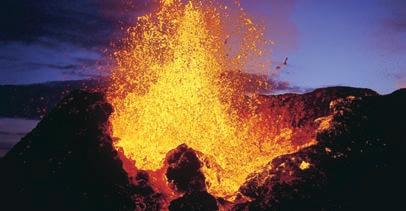

Listen and repeat. 3 Complete the quiz with words from exercise 1. How well do you know your history?
1 There was a potato (1) … in Ireland; people had nothing to eat and about 1 million people died. It was from 1845 to … a) 1852. b) 1864. c) 1870.
2 There were (2) … in the south of England. The water was 0.9m high. The year was … a) 1850. b) 1939. c) 2007.
3 There was a terrible (3) … in the year 1988. Many houses and shops burned in the capital of … a) Italy. b) Portugal. c) Colombia.
4 There was a huge (4) … in Iceland and many planes couldn’t fly because of the cloud. The year was … a) 2001. b) 2005. c) 2010.
5 (5) … is a problem in many countries where there isn’t much rain. The longest was in the Atacama desert in Chile: it was from 1571 to … a) 1671. b) 1771. c) 1971.


4 INTERFACE
quiz in exercise 3. Reading 5
6 Read
7
1 When did
2 What did Domenico
do
he discovered the paintings? 3 How did the volcanic eruption help us learn about Roman culture? 4 What natural disasters happened after the Lisbon earthquake? 5 Did buildings in Lisbon disappear into the sea? 6 What positive effects did the earthquake have?
Work in pairs. Do the history
Look at the pictures on page 43. What do you think the text is about?
and listen. Check your answers to exercise 5.
Read the text again and answer the questions.
Mount Vesuvius erupt?
Fontana
when
1
pictures? 1 4 2 5 3 6 drought earthquake famine fire floods hurricane landslide tornado tsunami volcanic eruption 2
Match pictures 1–6 with the words in the box. Which disasters are not in the
3b Unit
MODULE 2 Adventure 42 MODULE 3 History
Natural disasters

ON 24TH AUGUST 79ad …
Mount Vesuvius erupted. The eruption was catastrophic, and ash* and lava covered the towns of Pompeii and Herculaneum. They stayed hidden for nearly 1,700 years, but when Domenico Fontana, an Italian architect, discovered walls with paintings in 1559, how did he react? He covered them again! A Spanish engineer discovered Herculaneum in 1738 and Pompeii in 1748. In Pompeii, the volcano preserved Roman life exactly as it was, and we now know a lot about Roman culture because of the eruption.
ON 1ST NOVEMBER 1755 … there was a terrible earthquake in Lisbon, Portugal. Immediately after the earthquake, there was a tsunami and many fires started in the city. Buildings fell, burned and disappeared into the sea. In fact, the earthquake and its effects destroyed most of the city. But what did the people of Lisbon do? They rebuilt their city. They made wide streets, big squares and special buildings that could resist earthquakes. Also, thanks to the Portuguese prime minister’s investigations, modern seismology** was born.

GLOSSARY
*ash: the grey powder that remains after something has burned **seismology: the study of earthquakes

Grammar Past simple
questions and short answers regular / irregular verbs: Did + subject + short infinitive
Did you study history last week? Yes, I did No, I didn’t
Did they see Mount Vesuvius? Yes, they did. No, they didn’t
Did they investigate earthquakes?
Yes, they did. No, they didn’t
8 Order the words to make questions. Then answer the questions so they are true for you. you / a restaurant /Did / go to / last week ? Did you go to a restaurant last week ?
1 Did / watch / you / last night / TV ?
2 you / What / yesterday / eat / did ?
3 speak / English / Did / you / five years ago ?
4 meet / Did / your friends / you / last Sunday ?
9 Write complete questions using the past simple. who / Hillary / help / in Nepal ? Who did Hillary help in Nepal?
1 how many ships / Christopher Columbus / have ?
2 when / they / discover / Pompeii ?
3 where / Marco Polo / go ?
4 when / Hillary and Norgay / climb Everest ?
10 Listen and check your answers from exercise 9. Then listen again and write the answers to the questions.
We use could / couldn’t to talk about ability and possibility in the past: The buildings could resist earthquakes. They couldn’t stop the fires.
11 Complete the sentences with could or couldn’t.
I … come to the party because I was ill. I couldn’t come to the party because I was ill.
1 My brother … ride a bike when he was three. He was great!
2 There were floods last year and we … leave the house.
3 I … go to the cinema because I wasn’t at school.
4 In 1770, Captain Cook … travel by car.
Grammar guide 3 page 137
MODULE 3 History 43
Writing A biography
1 Read and listen. Then answer the questions.
1 What was Leonardo da Vinci’s job?
2 What did he paint?
3 Why does Kate like him?

For me, the most interesting person in history was Leonardo da Vinci. He was a painter, a sculptor and an inventor. He studied anatomy and botany and he liked many other things too.

Language
Time prepositions

Remember to use on, at or in correctly with times. Leonardo was born on 15th April 1452 at 10.30 pm. Leonardo died in May 1519.
2 Look at the sentences in the Language focus. Complete the rules with on, at or in.
1 We use … before months and years.
2 We use … before times.
3 We use … before days and dates.
3 Complete the sentences with on, at or in
1 The British explorer Captain James Cook was born … 1728.
2 He married Elizabeth Batts … 21st December 1762.
3 His first expedition began … 1768. He sailed from England to Australia.
4 He first saw Australia … 19th April … 6 am.
5 He died … St Valentine’s Day 1779 in Hawaii.
Class portfolio 1 page 116
Design a portfolio with the title “Our favourite artist”. Work in small groups.
He was born in Vinci, near Florence, on the 15th of April 1452. He didn’t go to school, but he studied maths, Latin and geometry at home. When he was 14, he started work. He was very good at art so he worked for a famous painter and learned techniques with him. Then he went to live in Milan in 1482 and, from this time on, Leonardo painted his most famous works, for example The Last Supper. He painted The Mona Lisa, probably the most famous painting in the world, in about 1505. It is in the Louvre Museum in Paris. I like Leonardo da Vinci because of his drawings. He was interested in maths, science and anatomy, and he drew people and bodies perfectly. He also drew inventions, for example a flying machine similar to the modern helicopter. He was the typical Renaissance man. Kate, 12

4
Write a biography about an important person in history. Follow these steps. Use 80–100 words.
Writing a biography
Step 1 Plan
Choose a person you admire and make some notes. Who was he / she? What did he / she do? What were the important events in his / her life? Why do you like this person?
Step 2 Write
Write a first draft. Use your notes from Step 1 and the biography on this page to help you.
Step 3 Check
Check your work. Use time prepositions correctly.
Step 4 Write
Write your final copy and hand in your work.
MODULE 2 Adventure 44 MODULE 3 History
Art Aboriginal art
Totem poles in Canada are examples of aboriginal art and a symbol of the area’s indigenous population. The ancient practice of totem carving has been handed down through generations as a way of preserving the history of local native heritage.
Stanley Park has got a wide variety of monuments, including eight Totem poles. The Totem poles each tell a real or mythical story. They are not the original Totem poles, however. Because many of the original poles were made as early as the 1880s, they have been sent to museums for preservation. The Totems today are new versions of the originals and, when you look at them, you’ll notice figures of eagles, whales, wolves and frogs. Each animal has a meaning. The eagle represents the kingdom of the air, the whale is the world of the sea, the wolf is the life on land and the frog is the connection between the land and the sea.
Read and listen. Answer the question.
What does the eagle represent on a Totem pole?
Vocabulary guide Verbs of discovery Natural




















arrive discover drive land leave ride sail take off travel drought earthquake famine fire floods hurricane landslide tornado tsunami volcanic eruption
disasters
MODULE 3 History 45
Self-check 3
1 Find eight verbs of discovery in the wordsearch.
2 Match pictures 1–6 with the words in the box. fire drought earthquake tornado floods famine



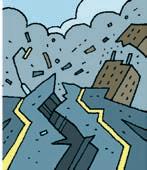


3 Complete the text with the past simple form of the verbs in backets.
I (1) … (arrive) home yesterday at 4.00 pm. I (2) … (be) alone in the house so I (3) … (sit) down on the sofa with a book, a biography about Captain Cook. I (4) … (start) to read and I (5) (read) for seven hours! I (6) … (forget) to have dinner, but I (7) … (finish) the book – it (8) … (be) brilliant. ---- / 16
4 Rewrite the sentences so that they are true for you.
1 I went to Hawaii last year.
2 I ate cactus for dinner last night.
3 My granddad was an explorer.
4 I read Don Quixote last night.
5 I lived in France last year. ---- / 10
5 Order the words to make questions. Then answer the questions.
1 you / arrive / What time / home / did / last night ?
2 study / Did / you / history / at the weekend ?
3 your dad / did / buy / his first car / When ?
4 you / English / study / Did / at primary school ?
5 Did / three months ago / you / Lisbon / visit ? ---- / 10
6 Fill in the gaps with the past simple form of the verbs in the box.
cry eat grow have leave can
1 I … swim when I was five.
2 We … a lot of homework yesterday.
3 He … home early at 7.00 am.
4 We … pizza last week.
5 My friends and I … because the film was very sad.
6 My grandfather … potatoes in his garden two years ago. ---- / 12
7 Choose the correct words.
Mum What (1) do you do / are you doing, Izzie?
Izzie I (2) do / ‘m doing my history homework.
Mum Can I (3) help / helping you?
Izzie Oh, yes please. I (4) find / found some information in the library yesterday and now I (5) write / ’m writing about Victorian London. But I have some questions. Where (6) did / does Queen Victoria live?
Mum I (7) wasn’t / weren’t alive then! Let’s look on the internet!
Izzie Good idea. Where do you usually put your laptop?
Mum Oh no! I (8) leave / left it at work.
Izzie Oh, Mum! ---- / 8
8 Writing: Write about your favourite famous person. Mention where he / she lived, what he / she was famous for and why you like him / her.
Use 60–80 words. ---- / 30
Total ---- / 100
Now I can
Ø talk about about discoveries; Ø correctly use past simple of regular & irregular verbs; Ø ask for information; Ø write a biography.
QLMVTCIFLY WERDRUFGEF LTGSAILPAL ARRIVEKQVK NIISEPCEEF DGDJLRBXXT ROEUDZTGCQ ----
/ 8
1 4 2 5 3 6 ---- / 6
Don’t forget to complete the Behaviour observation sheet according to the example on page 7! MODULE 2 46 MODULE 3 History
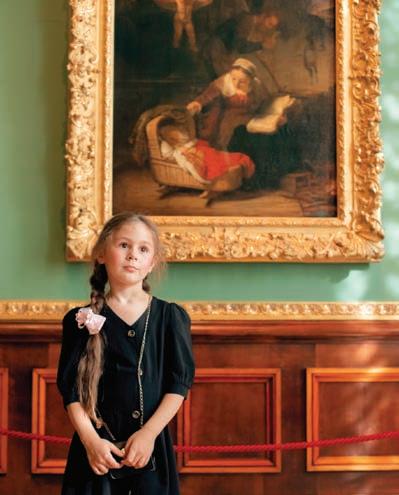
TRAVEL

IN THIS MODULE YOU WILL LEARN:
Vocabulary
Grammar
Reading
• Transport
• Holidays
• Past simple – extensive practice
• used to
• Unusual transport
• Bear Grylls
Speaking • Travelling by bus
• Asking for travel information
Writing • A story
Culture
CLIL
• Public transport
• Geography

Find the page numbers for:
Ø a pink taxi
Ø an old bike
Ø the London underground
1.1; 1.2; 1.3; 2.1; 2.2; 2.3; 2.4; 3.1; 3.2; 3.4; 4.2. MODULE 4 47
Competences:

Vocabulary
1 Copy and complete the table with the words in the box. Can you add more?



5 Work in pairs. Ask and answer questions about how you go to different places. Use the words in the box or your own ideas.
cinema
friends’ houses

Look at the pictures and complete the sentences with words from exercise 1.
1 In Mexico, pink … are for women only. 2 In London, people can hire a … to travel around the city.
3 In Bangladesh, people often travel on the roof of a …
…
… in Hong Kong has got two floors.
Fill in the gaps with by or on. When we travel abroad we go … plane. When we travel abroad we go by plane.
They usually go to school … foot.
Travelling … ship is not so popular. 3 Many people go to work … car not … tram.
He prefers to go … bike rather than … foot.
bike bus boat car coach lorry moped motorbike plane taxi train tram land waterair bike 2 Listen and repeat.
1
3
. 4
We
. Now say it! 4
school?
The first
was from the USA and was in the air for 12 seconds. 5 A
go by train, bus and boat but we go on foot
Listen to Ben and Emily. How do they go to
How do you
school? 3 2 4a Unit
6
MODULE 4 Travel 48
school the
your
your favourite shop I go to school by bus.
go to
Transport
1
2
4



The Skycar
You can drive the Skycar or fly it like a plane. Gideon Cardozo, a British engineer, designed the Skycar in just 18 months. In 2009, Cardozo decided to take the Skycar from the UK to Africa but he didn’t travel alone. He went with Neil Laughton, who is a driver and a pilot. They drove along roads and they flew over mountains and seas. Finally, they arrived in Timbuktu, Western Africa, more than two months later.

The SQuba submarine
When Frank Rinderknecht saw his hero James Bond drive his car into the sea, he decided that he wanted to build a similar car. The result was the SQuba submarine. The SQuba can travel at 120kph on land, 6.5kph on water and 3.25kph underwater. This machine is completely ecological but it is also very expensive: it costs nearly €1 million!
Make a note in your notebook of collocations – words which often go together such as to fly a plane.
What speed can the SQuba reach on land?
How much does the SQuba cost? 5 What is the Couchbike? 6 Why did the police officers stop the Couchbike?

The Couchbike
Two friends invented the Couchbike*. They tried to ride their special bicycle across a national park in Canada but two police officers stopped them and inspected their Couchbike. Why? Well, it was more than two metres wide, it was very slow and the cyclists didn’t have helmets. But the police officers didn’t know what to do – Couchbikes weren’t in their manual – so the two friends continued their journey. *couch: sofa
9 Match 1–4 with a–d to make collocations. Then make sentences using the words in the box.
cyclist driver pilot sailor 1 drive a) plane 2 sail b) bike 3 fly c) boat 4 ride d) car A pilot flies a plane.
10 CLASS VOTE Which do you think is the most unusual type of transport in the text? Why?
8
3
4
Reading
Read the text again and answer the questions. 1 Who did Gideon Cardozo travel with? 2 Where did they go and how long did it take?
7 Read and listen. What is the text about? a) A journey to school b) Unusual transport c) Transport in the 19th century
4 5
MODULE 4 Travel 49
Grammar
Past simple – extensive practice
regular / irregular verbs
affirmative I / You / He / She / It / We / You / They played / sang negative I / You / He / She / It / We / You / They didn’t play / sing interrogative Did I / you / he / she / it / we / you / they play / sing? short answers Yes, I / you / he / she / it / we / you / they did. No, I / you / he / she / it / we / you / they didn’t
1 Look at the sentences in the table. Which verb is irregular?
2 Check the list of irregular verbs on pages 143–144 and complete the table with the past simple form of the verbs. regular irregular disappear be present begin return come stop cost study have
3 Complete the text with the past simple verbs in exercise 2.

The first passenger tram service probably (0) began (begin) in Wales in 1807. There (1) … (be) seats for 12 passengers but it (2) … (not be) cheap. It (3) … (cost) about five pence. Werner von Siemens (4) … (come) from Germany. In 1881 he (5) … (present) the first electric tram to the world. In the 1900s, many cities (6) … (have) large tram networks. However, in the 1950s and 60s, trams (7) … (disappear) from the streets of many major cities. In 1952 the last London tram (8) … (stop) in New Cross. Almost 50 years later, trams (9) … (return) to London.
Pronunciation
-ed endings /d/ /t/ /ɪd/
a Listen and repeat. Can you hear the difference? /d/ or /t/ lived stopped /ɪd/ ended started
b Listen to the verbs in the box. Then add them to the table in exercise a. arrived asked continued designed invented looked presented tried wanted
4 Choose the correct word to make negative sentences.
We didn’t sing / sang at the festival. We didn’t sing at the festival.
1 We didn’t go / went to the concert last night.
2 He didn’t met / meet his cousin two days ago.
3 I didn’t arrive / arrived at six o’clock.
4 My dad didn’t drive / drove to work yesterday.
5 My friends didn’t came / come to my house last night.
6 She didn’t travelled / travel by train last summer.
7 The play didn’t began / begin at 7 pm.
MODULE 4 Travel 50
5 Order the words to make questions. you / Did / on holiday / last summer / go ? Did you go on holiday last summer?
1 go / on holiday / you / Where / did ?
2 How / you / get there / did ?
3 you / Who / did / go with ?
4 do there / did / What / you ?
5 a / Did / you / good time / have ?
6 Find a classmate and ask and answer the questions in exercise 5.
Did you go on holiday last summer? Yes, I did. I went to the mountains.
7 Complete the sentences with the correct past tense form of the verbs.
I … (hear) a new song on the radio. I heard a new song on the radio.
1 Maggie … (not / read) three books last week.
2 They … (begin) to study French in 2021.
3 I … (give) my mother a CD for Christmas.
4 She … (drink) too much coffee yesterday?
5 Dad … (come) home late last night.
8 Write sentences that are true for you using the past simple affirmative and negative. Use the words in the box or your own ideas.
go on foot go on holiday ride a bike drive a car yesterday last week last year on Monday
I didn’t go to school on foot yesterday. I went by car.
9 INTERFACE Work in pairs. Read your sentences to your partner.
I didn’t go to school on foot yesterday.
Really? I went on foot.
Grammar guide 4 page 138
Listening PowerBocking
10 Read the sentences. Do you think they are true or false? 1 People with PowerBocks can’t walk. 2 People with PowerBocks can run at over 30kph. 3 A man called Böck invented these boots. 4 In Australia, the boots are called Kangaroo boots. 5 The sport of PowerBocking started in the USA.

Listen and check your answers.
Listen again and answer the questions.
Who are PowerBockers
Where is Alexander Böck from?
Where did Alexander Böck get his inspiration?
Are PowerBocks cheap?
Do you want to try PowerBocking? Why / Why not? Capital Bocking is the biggest PowerBocking annual event in the world. It takes place in the UK. PowerBockers get together, improve their Bocking and make new friends.
11
12
1
2
?
3
4
13
MODULE 4 Travel 51
Speaking
Travelling by bus
Listen
1 Look at the picture. Where are Emily and Lucy? What are they doing?
2 Emily and Lucy are going to York. Listen to the dialogue and choose the correct answer. Emily buys a single / return ticket.
3 Listen again and complete the dialogue. Use the numbers in the box.
2 4 7 22
Excuse me. What time does the next bus for York leave?
What number is it? It leaves at (1)
Thanks. Where does it leave from?
How much does it cost?
Return, please.
Practise
4 Listen again and act out the dialogue.

Functional language
5 Complete the sentences with the correct words.
1 What … does the next bus leave for Manchester?
2 It … at five o’clock.
3 … does it leave from?
4 It … from bus stop number six.
5 How much … it cost?
6 It … £10. Emily
Asking for travel information
What time does the next bus for York leave? What number is it? Where does it leave from? How much does it cost?
Assistant It leaves at two o’clock. It’s the number 22. Bus stop number seven. It costs £4.
It costs
£… .
Single
return?
Bus stop number (3) … .
It’s
number
(4)
or
the
(2)
… o’clock.
MODULE 4 Travel 52
Speaking task
Prepare a dialogue between you and the assistant.
Step 1
First, decide where you want to go.
Destination: Liverpool Number: 30
Departure times: 10.30….11.00….12.00
Bus stop: 8
Ticket prices:
Return: £15.50
Single: £8.50
Destination: Brighton Number: 120

Departure times: 2.00….2.25….2.50
Bus stop: 15
Ticket prices:
Return: £5.50
Single: £2.80
Step 2

Think about what you say.
Excuse me. What time does the next bus for … leave? What number is it?
Where does it leave from? How much does it cost?
Return / Single, please.
Think about what the assistant says. It leaves at … o’clock.
It’s the number … . Bus stop number … . Single or return? It costs £… .
Step 3
Write your dialogue.
Step 4
Work in pairs. Take it in turns to practise your dialogue.
Culture Public transport
PUBLIC TRANSPORT
There are many ways of travelling around London. Here are a few of them.
The London Underground, or ‘the Tube’, was the first underground railway system in the world. It’s called the London Underground, but 55% of it isn’t under the ground!


You can catch a boat at the River Thames. There are regular boat services or you can go on a cruise. Another type of transport is the London taxi. The taxis are traditionally black, but nowadays you can find them in all different colours. Taxis are also called cabs.
London buses are typically red and many of them have got two floors. These buses are called double-deckers.

6
Read and listen to the information about public transport. Then answer the questions.
1 How much of the Underground is under the ground?
2 What colour are double-deckers?
3 Where can you catch the boat?
4 What is another name for a taxi?
7 What types of transport can you use in your town? Which one is your favourite and why?
MODULE 4 Travel 53






1 2 3
1
1–6
in the box. 2
3
I
. 4
Reading 5
he
typical holidays? 6
1
young. 2
again
accident. 3
the book Facing Up 4 He sunbathed after climbing Everest. 5 He
the Sahara Desert alone. I
I
go to Hawaii. I went to New York. 4 5 6 4b Unit Holidays buy
climb mountains explore new places go surfing have a good time make friends relax sunbathe take photos visit museums MODULE 4 Travel 54
Vocabulary
Match pictures
with the words
Listen and repeat.
Imagine you went on holiday last month. Write past simple sentences using the verbs in exercise 1.
went to Hawaii last month. I went surfing and I …
INTERFACE Work in pairs. Compare your sentences in exercise 3.
Listen and read the text on page 55. Who is Bear Grylls? Does
go on
Read the text again. Are the sentences true or false? Correct the false sentences.
Bear Grylls climbed mountains when he was
He didn’t explore
after his
He wrote
went to
went to Hawaii last month.
didn’t
souvenirs
Question and answer:
Bear Grylls
Bear Grylls is a British adventurer, writer and TV presenter and admired by many. Last week, Teen Explorer magazine told us more about him!

Q Why is he called Bear?
A Bear is a nickname. His sister gave him that nickname when he was a baby!
Q Obviously, he loves exploring new places. When did he start?
A At an early age, he climbed mountains with his father.
Q Was that dangerous?
A Not as dangerous as when he was in the Special Forces and had a serious parachuting accident. He broke his back in three places.
Q Did he stop his adventures?
A No – quite the opposite – at the age of 23, he became the youngest British man to climb Everest.
Q What did he do next?
A He wrote about this experience in the book Facing Up.
Q And then, did he have a holiday? Did he relax and sunbathe like us?
A No, he didn’t. First he circumnavigated the United Kingdom on jet skis, then he crossed the North Atlantic Ocean on an open, inflatable boat in aid of charity.
Q What did he do next?
A Next he took a group of men to join the French Foreign Legion in the Sahara Desert. Maybe that was a holiday for Bear – it depends on what you call a holiday!
Grammar used to
affirmative
negative
interrogative
short answers
I / You / He / She / It / We / You / They used to sing.
I / You / He / She / It / We / You / They didn’t use to walk
Did I / you / he / she / it / we / you / they use to play ?
Yes, I / you / he / she / it / we / you / they did
No, I / you / he / she / it / we / you / they didn’t
Used to expresses a past habit or something that doesn’t happen anymore. It is followed by infinitive.
7 Write questions about Kate when she was younger. Then write short answers.


Kate, now (18 years old) Kate (7 years old) she / use to / live / in the UK. ✓ Did she use to live in the UK? Yes, she did.
1 she / use to / go to school by car ? ✗
2 she / use to / play / any sports ? ✓
3 she / use to / have / a pet dog ? ✗
4 she / use to / stay up late ? ✗
8 Order the words to make questions.
you / did / How often / plan / use / to / holidays ? How often did you use to plan holidays?
1 go / use to / on holiday / you / Where / did ?
2 there / How / use to / you / get / did ?
3 go / you / use to / Who / did / with ?
4 do / there / use to / did / What / you ?
5 a / good / use to / Did / you / time / have ?
9 INTERFACE Work in pairs. Ask and answer the questions in exercise 8 about your holiday when you were younger.
Grammar guide 4 page 138
MODULE 4 Travel 55
Writing A
story
1 Read the text, then choose the best title for Mary’s story.
a) A great day out
b) A terrible afternoon
c) Mary’s favourite film





Last Saturday, I went into town to meet my friend Jack, but there were lots of problems.
First, I missed my bus, so I waited half an hour for the next bus. When I arrived in town, I went to a café. I tried to buy a drink but I didn’t have my bag. It was on the bus!

Then I went to the main square to meet Jack at 5 o’clock, but he wasn’t there.
He arrived at 5.45 because there was a problem with his bike. In the end, we went to the cinema, but the film was really boring so I went to sleep!
Language

Time connectors
You can improve your story by using time connectors:
First, the alarm clock didn’t ring …, then we took the bus …, in the end I had a good holiday.
2 Notice the use of the words first, then and in the end in the text.
3 Read the text again and number the events in the correct order.
… Mary and Jack saw a boring film.
… Mary went to a café.
… Mary met Jack.
1 Mary missed the bus.
… Mary waited half an hour for a bus.
… Mary went to the main square.
… Mary and Jack went to the cinema.
Class portfolio 2 page 117
Design a portfolio with the title “Joy of travel”. Work in small groups.

4 Read the text again and answer the questions.
Why did Mary wait half an hour for a bus?
She waited half an hour because she missed her bus.
1 Where was Mary’s bag? It was… .
2 Why did Jack arrive at 5.45? He arrived at 5.45 because … .
3 Did Mary like the film?
5 To practise your writing skills, go to Writing guide 2 on page 110.
6 Write a story about a trip you went on. Follow these steps. Use 80–100 words.
Writing a story
Step 1 Plan
Make notes under three headings:
1 Where did you go?
2 What did you do?
3 What happened in the end?
Step 2 Write
Write a first draft. Organize your writing in three paragraphs. Use your notes from Step 1 and the story on this page to help you.
Step 3 Check
Check your work. Try to use the past simple and include the time connectors first, then and in the end.
Step 4 Write
Write your final copy and hand in your work.
MODULE 4 Travel 56

Geography Climate zones
There are different climatic zones around the world and some countries have different climates within them. Australia is one of these.
Polar climates are found in the polar regions and in the highest mountains. Here, the temperature can be as low as –40°C and the ground is always frozen.
In most of Europe and North America you will find a warm, temperate climate. It isn’t too cold in winter or too hot in summer.
Tropical climates usually have a high temperature all year round but it also rains a lot. Average temperatures are 32°C and annual rainfall can be as much as 2,000 mm.
Cool temperate climates can be found south of the Arctic and across northern Europe and Canada. Here the winters are longer and colder than in warm climates.
Dry climates have very low rainfall and the daytime temperature can reach 50°C. A desert has this climate.
Monsoon climates have two seasons – wet and dry – but it is always warm.
Read and listen. Answer the question. Which country does not have a monsoon climate?
Vocabulary guide Transport






















Mexico
Norway Malaysia Colombia
bike coach plane bus lorry taxi boat moped train car motorbike tram Travel buy souvenirsclimb mountainsexplore new placesgo surfinghave a good time make friends relax sunbathe take photosvisit museums MODULE 4 Travel 57
Self-check 4
1 Identify the types of transport.






/ 6
2 Match verbs 1–8 with expressions a–f to make activities.
1 explore a) friends
2 have b) photos
3 make c) museums
4 take d) new places
5 go e) surfing
6 visit f) a good time ---- / 6
3 Complete the text with the past simple form of the verbs in brackets.
Last Saturday I (1) … (visit) my grandparents.
I (2) … (leave) the house early – at 7 am but I (3) … (not go) with my parents. I (4) … (go) alone and (5) … (travel) by bus. I (6) … (not have) a good time. It was very boring! On Sunday I (7) … (get up) late and (8) … (have) breakfast. I (9) … (go) shopping with my friends and (10) … (buy) some new CDs. Sunday was fun!
/ 10
4 Complete the sentences with the past simple form of the verbs in exercise 2.
1 Last year we … a very good time in Greece.
2 In the capital, Athens, we … museums.
3 I … (not) any photos but I bought some souvenirs.
4 We didn’t climb any mountains but we … new places.
5 We went to the island of Crete and I … surfing.
6 And best of all, I … lots of new friends.
5 Write questions using used to
1 Where / you / use to / spend your holiday / when you were 9 years old ?
2 you / use to / visit / many museums ?
3 you / use to / buy / souvenirs ?
4 you / use to / ride / a bike ?
5 What sports / you / use to / do ?
6 you / use to / make / new friends easily ? ---- / 12
6 Write the answers to the questions in exercise 5. ---- / 6
7 Complete the dialogue. Use the correct form of the verbs in brackets or choose the correct words.
Ben Did you have a good weekend, Emily?
Emily Yes, I (1) do / did. It was really fun!
Ben What (2) … (you / do)?
Emily Well, you know my sister Natalie? It (3) … (be) her birthday last week, so all the family (4) … (go) to the theme park in town.
Ben Fantastic! I love (5) going / to go to theme parks. I (6) … (spend) a day there with friends a week ago.
Emily Really?
Ben Yes, we (7) … (arrive) at 10 am and we (8) … (not leave) until 7 pm!
Emily (9) … (you / go) on the Pirate Ship?
Ben No, I (10) did / didn’t . It looked really boring.
Emily It was really boring!
Ben We (11) … (wait) for a long time to get inside, but we (12) … (not mind). It was great! ---- / 24
8 Writing: Write a story about your happiest holiday. Mention where you were, who you were with, what happened that brings back happy memories. Use 60–80 words.
Now I can
/ 6
Ø talk about transport & holidays; Ø correctly use past tense simple & used to; Ø ask for travel information; Ø write a story.
----
Total ----
/ 30
/ 100
----
----
a … b … c … d … e … f …
----
Don’t forget to complete the Behaviour observation sheet according to the example on page 7! MODULE 4 Travel 58


IN THIS MODULE YOU WILL LEARN:
Vocabulary • Money
• IT world
Grammar
Reading
Speaking
Writing
• The adjective – comparative and superlative forms
• The forms of the genitive
• Smart tips for young people
• The Big Swap Shop
• Going shopping
• Buying and selling
• A description
Culture • Charity shops
CLIL
• Maths

Find the page numbers for:
Ø a charity shop
Ø a printer
Ø a market stall
POSSESSIONS Competences: 1.1; 1.2; 1.3; 2.1; 2.2; 2.3; 2.4; 3.2; 3.3; 3.4; 4.2. MODULE 5 59



1 Look at the words in the box and check their meaning. borrow buy earn lend pay (for) save sell spend swap win 2 Listen and repeat. 3 Which words in exercise 1 match pictures 1–6? 4 Choose the correct words. Now say it! 6 Listen to Will and Izzie. What does Izzie spend her pocket money on? 7 INTERFACE Work in pairs. Ask and answer the questions in exercise 5. I often buy snacks or I go to the cinema with my friends. What do you spend your pocket money on? 1 What do you spend your pocket money on? 2 What things do you lend to your friends? 3 What things do you swap with your friends? My sister Jane is very bad with money. She (0) spends / saves all of her pocket money on magazines and sweets. She is always (1) buying / winning new clothes and she has already got lots. My brother is the opposite. He (2) swaps / pays his old possessions with his friends so that he always has something new. He has a part-time job so he (3) earns / wins some extra money too. 3 2 1 5a Unit Money MODULE 5 Possessions 60



Smart tips for young people
Reading
8 Read and listen. Match headings 1–4 with paragraphs A–D.
1 Do I really need it? 3 New for old. 2 Don’t borrow money. 4 Save money now.
9 Read the text again. Choose the correct answers.
1 To receive €10,000 you need to save 78 cents a day from … a) the age of 13. b) the age of 25.
2 Many … sell second-hand games. a) friends b) shops
3 To save a lot of money it is best to … a) borrow it. b) get a part-time job.
4 The article advises you to: a) think before you buy. b) buy and think after.
10 Answer the questions.
1 How can you get a lot of money on your 30th birthday?
2 How can you get a new games console if you haven’t got much money?
3 Why is it a good idea to buy second-hand products?
4 What part-time jobs can you get to earn more money?

5 Is it a good idea to buy something that you don’t really need?
Antonyms are words that mean the opposite of another word. You can improve your vocabulary by learning them.
A Would you like to receive €10,000 on your 30th birthday? Well, you need to save either 78 cents a day from the age of 13, €4.47 a day from the age of 25 or €27 a day from the age of 29. Just do the maths. It’s more intelligent to save money early. So, how can you start saving money?
B Imagine there’s a new games console. It’s faster and better than yours, but it’s very expensive. At home, you’ve got a lot of old games and a very old games console. Why don’t you swap them for something new? Many games shops have a swapping system. They also sell second-hand games and consoles; they’re often much cheaper than new products.
C If you want to save for something big, use your initiative and do a part-time job at the weekend. You can earn a few euros a week if you walk your neighbours’ dogs or wash their cars, and a few euros an hour if you look after children. Then you don’t need to borrow – and you don’t lose friends because you can’t pay them back!
D Before you spend money on something new, think about it. Do you really need the best mobile phone in the shop? Do you really need the biggest memory card for your camera or the best basketball? If the answer is no, don’t buy it!
11 Match words in the text with the antonyms below. old ≠ new 1 stupid 4 none 2 late 5 lend 3 cheap
12 CLASS VOTE Which do you think is the best piece of advice in the text? Why?
4 6 5 MODULE 5 Possessions 61
Grammar
The adjective – comparative and superlative forms
adjective comparatives superlative
short adjectives cheap large big cheaper (than) larger (than) bigger (than) the cheapest the largest the biggest
-y adjectives noisy noisier (than) the noisiest long adjectives expensive more expensive (than) the most expensive
irregular adjectives good bad much many little far better (than) worse (than) more (than) more (than) less (than) farther / further (than) the best the worst the most the most the least the farthest / furthest
1 Look at the table and complete the rules with the words in the box.
irregular good -er more than
a) We usually add (1) … to short adjectives.
b) We add (2) … to long adjectives.
c) Better is an (3) … comparative. The adjective is (4)
d) We add (5) … after the comparative adjective.
2 Check the meaning of the adjectives below and write the comparative forms. Use the spelling rules on page 139 to help you. rich – richer
1 heavy 5 intelligent
2 far 6 fat
3 good 7 bad
4 large 8 expensive
3 Complete the sentences with the comparative form of the adjectives in brackets.
Maths is … than history. (difficult) Maths is more difficult than History.
1 In Britain, many soft drinks are … than mineral water. (cheap)
2 Gold is … than silver. (expensive)
3 A £2 coin is … than a £1 coin. (big)
4 Bill Gates is … than my dad. (rich)
5 Buckingham Palace is … than Big Ben. (old)
4 Complete the sentences so they are true for you.
My school bag / my pencil case. (small)
My school bag isn’t smaller than my pencil case.
1 My school bag / my shoes. (heavy)
2 My pen / my pencil. (new)
3 My English book / my maths book. (difficult)
4 My hands / my friend’s hands. (large)
5 My father / my friend’s father. (young)
5 Write sentences using the ideas in the box. Use comparative adjectives.
bedroom bicycle calculator family football team mp3 player pet town My bedroom is smaller than my friend’s bedroom.
Pronunciation
Comparative –er /ə/ a Listen and repeat. heavier larger newer smaller b Listen to the sentences and repeat.
1 My bedroom’s smaller than his bedroom. 2 My bicycle’s heavier than his bicycle.
6 INTERFACE Work in pairs. Compare your sentences in exercise 5.
My bedroom is bigger than my sister’s bedroom. My bedroom is smaller than my friend’s bedroom. What about you?
7 PERSONAL PROJECT Search on the internet and find the best places to live in the world. Compare them from the perspective of cost of living, cultural opportunities, and education.
MODULE 5 Possessions 62
8 Complete the quiz questions with the superlative form of the adjectives in brackets. Then choose the correct answers.
How much do you know about London?
1 Who’s the … (rich) resident?
a) Bill Gates b) Queen Elizabeth II
c) Lakshmi Mittal
2 Oxford Street is the … (busy) shopping street. How long is it?
a) 1.4 km b) 2.4 km c) 3.4 km
3 The Lanesborough is the … (expensive) hotel. How much does the Royal Suite cost for one night?
a) £450 b) £4,500 c) £45,000
4 What’s the … (cheap) means of transport for under 16s?
a) bus b) taxi c) underground
5 Westfield is the … (big) shopping centre. How big is it?
a) two basketball courts
b) six Olympic swimming pools
c) 30 football pitches

9 Listen and check your answers.
10 Write five questions about where you live using the superlative form. Use the words in the box. fast / means of transport
The plane is the fastest means of transport.
good / football team high / mountain long / river rich / person tall / building 11 INTERFACE Work in small groups. Ask and answer your questions in exercise 10. The highest mountain is … . What is the highest mountain?
Listening Pocket money

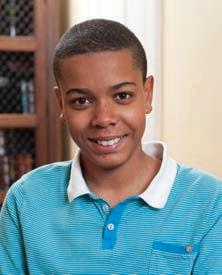

12
Listen to Lou, Will and Izzie. Answer the questions for each speaker.
1 How much pocket money do you get?
2 Do you buy your own clothes with this money?
3 Have you got a part-time job?
13 Listen again and complete the sentences with the numbers.
3 5 10 15
1 Lou’s friend earns £… in her uncle’s shop.
2 Will would like to save £… a month.
3 Will’s best friend earns £… a month.
4 Izzie goes babysitting and earns £… an hour.
14 Answer the questions.
1 How often does Lou go shopping? 2 Why can’t she get a part-time job?
3 How does Will get his clothes? 4 What job has his best friend got?
5 What does Izzie spend her money on?
6 How often does she babysit her neighbour’s son?
The law in the UK says that children can’t work until they are 13. They can’t work during school hours, but they can work up to eight hours at the weekend.
Grammar
guide 5 page 139
MODULE 5 Possessions 63
Speaking Going shopping
Listen
1 Look at the picture. What is Izzie doing?
2 Listen to the dialogue. What does Izzie buy?
3 Listen again and complete the dialogue.
Excuse me, how much is the necklace?
Can I try it on?
It’s lovely. How much are the earrings?
What about the T-shirts? How much do they cost?
I’ll have the necklace, please. Here’s £10.

Practise
4 Listen again and act out the dialogue.
5 Order the words to make sentences.
1 the / bracelet / How / is / much ?
2 try / them / Can / on / I ?
3 are / How / trainers / much / the ?
4 They / each / £5 / are .
5 please / bracelet / have / I’ll / the .
Izzie
Yes, of course! Here’s a mirror.
They’re (2) £… .
They’re (3) £… each or two for £10.
Thanks. Here’s your change.
Buying and selling
How much is the necklace?
How much are the earrings?
How much do they cost?
Assistant It’s £6.
They’re £5.
They’re £6.99 each or two for £10.
It’s (1) £… .
MODULE 5 Possessions 64
Speaking task
Prepare a dialogue between you and the shop assistant.
Step 1
First, look at the price list below and decide what you want to buy.
Shirts
£30 each

Socks
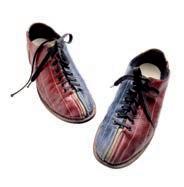
Shoes
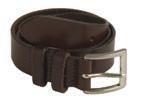
Culture Charity
shops

Many people in the UK don’t throw away their unwanted things. They sell them on the internet or they donate them directly to charity. Popular second-hand items include clothes, books, CDs and computer games.
£3 a pair

Belts Scarves
£7 each or 2 for £12
Step 2
Think about what you say.

£10
Excuse me, how much is / are … ?
Can I try it on?
How much does / do the … cost?
I’ll have the …, please. Here’s £… .
Think about what the shop assistant says.
It’s / They’re £… .
Yes, of course! Here’s a mirror. They’re £… each or two for £… .
Thanks. Here’s your change.
Step 3
Write your dialogue.
Step 4
Work in pairs. Take it in turns to practise your dialogue.
Charity organizations such as Oxfam, Cancer Research or the RSPCA (Royal Society for the Prevention of Cruelty to Animals) have often got their own second-hand shops. Volunteers work in these charity shops. They organize the donations from members of the public and then sell these things to get money for the charity.
People buy second-hand things for various reasons. Firstly, they are usually much cheaper. Secondly, you can sometimes find unusual books, CDs or clothes that you can’t find in a normal shop. Finally, it is a way for people to give money to their favourite charity.

6
Read and listen to the information about charity shops. Then answer the questions.
1 What do many people in the UK do with their unwanted things?
2 What is a charity shop?
3 Why do people buy second-hand things?
7 Fill in the gaps with the suitable form of the adjectives in brackets.
Charity shops are … than normal shops. (cheap)
Charity shops are cheaper than normal shops.
1 People spend … money in charity shops. (little)
2 You can find … things in the second-hand shops. (unusual)
3 We buy … designer clothes in a mall. (expensive)
£25
MODULE 5 Possessions 65
Vocabulary
1 Match pictures 1–8 with the words in the box and present your favourite item to the class.




2 Listen and repeat.




3 Complete the definitions with words from exercise 1. A … is a small computer you can carry. A laptop is a small computer you can carry.
1 You click on the … to do things on the computer screen.
2 A … is a camera which is connected to a computer.
3 You need a … to put computer documents or images on paper.
4 You use a … to type information into the computer.
5 If you want to listen to sound, you need … .
Reading
4 Read and listen. How can you get things for free on this website?
The Big Swap Shop
How many CDs, DVDs and computer games have you got at home? Do you need them all? Do you want any newer or better things?
With the Big Swap Shop, you can swap your things for free. Just follow these five easy steps!

Step 1: Register your name and address on our website. Are you under 18 years old? Your parents also need to complete the registration form.
Step 2: Make a list of the things you want to swap. Include a short description of each one. For example: Desktop Computer. It’s less than 6 months old with a lot of memory (320GB), an 18.5-inch screen, a keyboard and a mouse.
Step 3: Our website automatically calculates some points for each thing on your list, for example a desktop computer = 12,500 points, some speakers = 1,000 points, a 256MB memory card = 250 points.
Step 4: Search our website and choose something new. There are more than 15,000 things you can choose from, including a lot of DVDs, computer games and books.
Step 5: Use your swap points to buy products for free!
Happy swapping!
5 Read the text again. Are the sentences true or false?
1 First you need to give your name and address.
2 You can’t use this website if you are under 18.
3 You need to describe the objects you want to swap.
4 The website gives you money for your unwanted things.
5 This website hasn’t got many DVDs.
6 Would you use this swap shop website? Why / Why not?
desktop flash drive keyboard laptop memory card mouse printer scanner screen speakers webcam 1 4 6 8 7 2 3 5
5b Unit IT world MODULE 5 Possessions 66
’s
Grammar
The forms of the genitive – expressing possession
proper nouns Ronny’s bike is blue.
nouns in the singular (mostly for people or animals)
The girl’s dress is red. The cat’s eyes are green.
irregular plurals nouns The children’s toys are nice.
’ (apostrophe) for regular plural nouns ending in -s
The students’ desks are new. of for things
The building offers a beautiful view of the city. for animals (if we are talking about a species in general)
The tail of the horse is long and fluffy.
7 Complete the sentences with ’ or ’s
My friends … cousins are friendly.
My friends’ cousins are friendly.
1 Bill … blue car is in the garage.
2 Mr. John … secretary is here.
3 They sell ladies … clothes in this store.
4 The doctor … kids are very nice.
8 Write the correct form of the possessives into the gaps.
My … dad is my uncle. (cousin)
My cousin’s dad is my uncle.
1 Sarah is … aunt. (Emily)
2 Let’s meet at … for lunch. (Giovanni)
3 Where is the … shower? (ladies)
4 This is our … car. (boss)
9 Make sentences with ’s or of.
(the name) school ➔ The name of our school is “Queen Mary”.
1 (my friend) bike ➔ …
2 (the window) room ➔
3 (Mr. Smith) car ➔
4 (the number) house ➔ …
10 Correct the sentences.
The dress of my sister is old.
My sister’s dress is old.
1 The car’s engine is very powerful.
2 The toys of the babies are funny.
3 The hat of Sally is red.
4 The chair’s leg is broken.
11 Choose the correct form of the genitive: ’s or of My father’s birthday / the birthday of my father is in August.
My father’s birthday is in August.
1 Tom’s camera / the camera of Tom is cheap.
2 The door of the room / room’s door is shut.
3 The principal of the school / school’s principal came on the trip.
4 The son of Mary / Mary’s son is clever.
12 Turn the words in brackets into a possessive form (’s, ’ or of ).
This is … (the car – the manager). This is the manager’s car.
1 He bought paint for … (the door – the garage).
2 It was … (decision – your father).
3 I can’t believe … (the boy – the story).
4 Go to … (the back – the house)
If two people own the same object we add ’s after the last one.
Ann and Tom’s father is a doctor.
If two people own different objects we add ’s after each person.
Emma’s and Sylvia’s dresses are new.
13 Connect the nouns using ’s where necessary.
Will and Lucy / favourite film
Will and Lucy’s favourite film
1 Ben and Lisa / bikes
2 Sophie and Emma / house
3 Jack and Dan / school
4 Alan and Kate / phones
Grammar guide 5 page 139
MODULE 5 Possessions 67
Writing
A description
1 Look at the pictures and read. Complete the text with the words in the box. Then listen and check. black gold red
2 Read the text again and answer the questions.
1 What does Ellie do with her laptop?
2 How did she buy her football shirt?
3 Why does she like the coin?
Language

Adjective word order Use adjectives to make your descriptions more interesting. When we use two or more adjectives together, we use this order: opinion, size, age, colour, material. I’ve got a cheap, small, black laptop. It was more expensive than his beautiful, new, gold watch. She bought a wonderful, antique, silver vase.
3 Look at the sentences in the Language focus. Then copy and complete the table with the words in the box. beautiful grey second-hand small
My favourite things
My laptop
I’ve got a beautiful (1) … laptop. My mum gave it to me three months ago and I love it. I often play games, I sometimes listen to music and I send messages to my friends three or four times a day. It’s great!
My
football shirt
1 …2 …3 …4 … watch
4 Rewrite the sentences with the adjectives in brackets.
I love my cousin’s blue earrings. (small)
I love my cousin’s small earrings.
1 I’ve got a black mp3 player. (brilliant)
2 My pens and pencils are in a big box. (lovely)
3 I bought a new T-shirt two days ago. (purple)
4 The black bag was the cheapest in the shop. (old)
Class portfolio 3 page 118
Design a portfolio with the title “My technology world”. Work in small groups.


Everyone likes buying clothes except me! But I love Arsenal Football Club, so last year I saved all my pocket money and I bought the (2) … football shirt.
My dad says it was more expensive than his new gold watch. I don’t believe him!
My coin
My uncle bought me this wonderful small (3) … coin while he was working in New York. It’s the Statue of Liberty. It’s bigger than a euro coin. I like it because I’d like to visit New York when I’m older. Ellie, 12

5 Write a description of your favourite things. Follow these steps. Use 80–100 words.
Writing a description
Step 1 Plan
Choose three objects. Make some notes for each object. What is it like? Where did you get it? Why do you like it?
Step 2 Write
Write a first draft. Use your notes from Step 1 and the descriptions on this page to help you.
Step 3 Check
Check your work. Include more than one adjective in your descriptions.
Step 4 Write
Write your final copy and hand in your work.
opinionsizeagecolournoun lovelybigoldredphone
MODULE 5 Possessions 68

Maths
Metric and imperial
Try to do the following maths. Which is easier?
a) 1 km – 200 m + 3 m – 25 cm = b) 1 mile – 10 yards + 2 feet + 1½ inches = If you go to New York, you will see road signs with the distances in miles not kilometres, weights in pounds not kilos, and volumes in gallons not litres. This is known as the imperial system and it is used as a system of measurement in the USA. In the USA it is called the United States Customary System.
These days most countries, including the UK since 2000, use the metric system. It was first proposed by the French astronomer and mathematician Gabriel Mouton in 1670. It is an international decimalized system of measurement and a lot of people believe it is much easier to use than the imperial system. Do you agree?
imperialmetric
distance 1 mile1.6 km
weight 1 pound0.45 kilos
volume 1 gallon3.7 litres
Read and listen. Answer the question.
If the distance between Sydney and Melbourne, Australia, is 710 km, what is the distance in miles?
Vocabulary









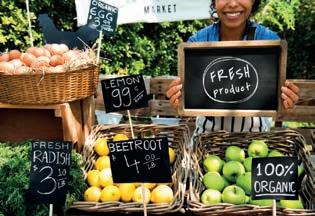

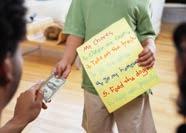
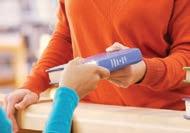


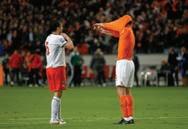








Computer technology desktopflash drive keyboardlaptopmemory card mouseprinterscannerscreenspeakerswebcam borrow buy earn lend pay (for) save sell spend swap win
guide Money
MODULE 5 Possessions 69
Self-check 5
1 Complete the words with letters.
1 b _ rr _ _
2 _ wap
3 s _ _ n _
4 s _ _ e 5 e _ r _ 6 _ i _ 7
---- / 8
2 Write complete sentences using the comparative or superlative forms of the adjectives.
1 The Pacific Ocean / big / than / the Atlantic Ocean.
2 Neptune / far / planet from Earth.
3 The Amazon river / wide / than / the Nile.
4 Waterloo / busy / tube station in London.
5 Caviar / expensive / food in the world.
6 The Indian Ocean / warm / than / the Arctic Ocean.
7 Mount Everest / high / mountain in the world. ---- / 14
3 Write sentences using the correct form of the genitive: ’s, ’ or of.
1 My aunt / son lives in Bucharest.
2 The fence / the garden is painted in green.
3 The windows / the house are widely open.
4 Chloe / trainers are very fashionable.
5 The girls / basketball club is near their school.
6 Sarah / friend is travelling to Rome next week.
7 The door / the room was open. ---- / 14
4 Choose the correct form of the adjectives.
1 Sarah is … at history than Jane. a) good b) the best c) better
2 My brother is two years … than me. a) young b) the youngest c) younger
3 I think summer is … season of the year. a) beautiful b) the most beautiful c) better
4 The Amazon is … river in the world. a) wide b) wider c) the widest
5 Sahara is … desert in the world. a) hotter b) hot c) the hottest
6 Ben Nevis is … mountain in the UK.
a) higher b) high c) the highest
7 This information is … for me than the previous one.
a) useful b) the most useful c) more useful. ---- / 14
5 Complete the dialogue with the correct form of the verbs in brackets.
Will Excuse me, how much (1) … the T-shirt … (cost)?
Assistant It (2) … (be) £8.99.
Will Can I (3) … (try) it on?
Assistant Yes, of course!
Lou That looks great, Will, and it’s cheap. I (4) … (buy) a similar T-shirt last week and it (5) … (be) more expensive. How much (6) … these earrings … (cost)?
Assistant They (7) … (be) £6.
Will I (8) … (buy) the T-shirt and the earrings and I’m paying!
Lou But Will!
Will It (9) … (be) your birthday last week and I (10) … (forget).
Lou Thanks, Will. ---- / 20
6 Writing: Describe your favourite outfit. Write what it is, how you got it, what it looks like, why you like it. Use 60–80 words. ---- / 30
Total ---- / 100
Now I can
Ø talk about money & IT;
Ø correctly use the comparative & superlative form of the adjectives;
Ø talk about going shopping; Ø write a description.
l _ _ d 8 _ a _
Don’t forget to complete the Behaviour observation sheet according to the example on page 7! MODULE 5 Possessions 70
MAKE A DIFFERENCE

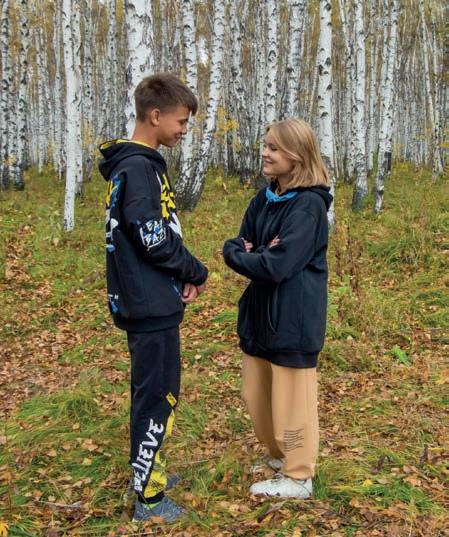
IN THIS MODULE YOU WILL LEARN:
Vocabulary
Grammar
Reading
Speaking
Writing
Culture
CLIL
• What’s the weather like?
• Health problems and first aid
• Expressing agreement and disagreement
• The modal verbs can, will – making a polite request
• World Water Day
• Mountain rescue!
• Talking about weather and seasons
• Giving opinions
• A letter
• Weather in the UK
• Literature

Find the page numbers for:
Ø a teacher in front of the students
Ø a footballer
Ø a vet and a white dog
Competences: 1.1; 1.2; 2.1; 2.2; 2.3; 2.4; 3.3; 3.4; 4.2. MODULE 6 71
Vocabulary
1 Look at the words in the box. Listen and repeat.


2 What other words related to weather do you know? Give exemples.
3 Label the pictures 1–4 with the names of the seasons. Then, ask and answer questions, as in the example:
What’s the weather like in spring?
It’s warm and sunny.
4 Choose the correct words.


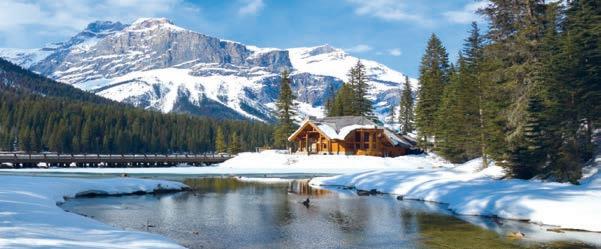
PERSONAL PROJECT Today’s weather forecast all over the globe Follow the link below to watch the weather forecast. Print a world map and pin the names of the cities and the weather icons on this map. Be the weatherman for your classmates! https://www.youtube.com/ watch?v=u3TwuUDipus
cloudy cold dry hot rainy snowy stormy sunny warm wet windy
freezing
A:
B:
1
Britain is dry
wet 2
warm
can sit outside
eat dinner. 3
Spain is usually sunny / stormy 4
snowy
rainy Now say it! 5 Listen
repeat. sometimes sunny spring stormy summer scarf socks snowy 6 Listen and repeat. 1
sunny in spring
it’s hot
stormy in summer. 2
winter
need
gloves
thick socks because sometimes it’s snowy. 1 3 4 2 6a Unit What’s the weather like? 7 Fill in
missing words. There are clouds in the sky. It’s a cloudy day. 1 The wind is
hard.
day. 2
sun is shining.
day. 3
raining
… day. 4
snowing
day.
72 MODULE 6 Make a difference
In the Arctic it’s cold / hot. In the Arctic it’s cold.
People say that the weather in
/
It’s
/ cold tonight so we
and
Summer in the south of
Winter in the Alps are usually
/
and
It’s sometimes
and
and
In
you
a scarf,
and
the
blowing
It’s a …
The
It’s a …
It’s
heavily. It’s a
It’s
. It’s a …


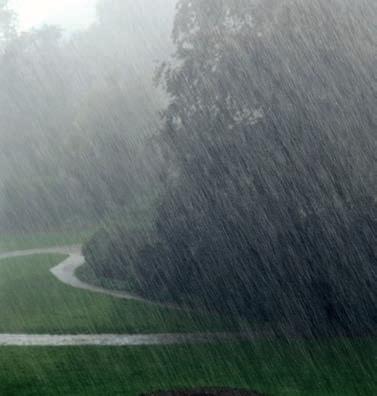

World Water Day
8 Read and listen.
What do these numbers refer to?
1 1 billion 4 5
2 2.5 million 5 22
3 24,000 6 80
9 Read the text again. Are the sentences true or false? Correct the false sentences.
Some people travel long distances to find water. T
1 World Water Day is celebrated in the UK only.
2 Jamie Cranks is going to queue on 22nd March.
3 Water.org is going to use Amy’s Facebook status.
4 Water.org sends engineers and mechanics from Hollywood to developing countries.
10 Answer the questions.
1 What happens on World Water Day?
2 What world record do Jamie and his friends hope to break?
3 What does Water.org do?
4 What is Water.org going to do on World Water Day?
Learn to recognize prefixes like unThey can help you guess the meaning of a word.
11 Check the meaning of the words below.
1 unclear 3 unnecessary
2 unsafe 4 unusual 12 CLASS VOTE Which World Water Day idea do you prefer? Why?
Almost 1 billion people in the world haven’t got clean water to drink.
2.5
Every day, 24,000 children under the age of 5 die because of unsafe water.
Many children can’t go to school because they need to walk for hours to get water for their family.
22nd March is World Water Day when there are events around the world focusing on the water crisis. So, what are you going to do on World Water Day?
Are you going to stand in a toilet queue*?
Jamie Cranks and his friends are from Manchester. 22nd March isn’t going to be a normal school day for them because they’re going to stand in an unusual queue. Their teacher is going to join them too! In fact, people in about 80 countries are going to work together to form the world’s longest toilet queue.
Or are you going to donate your Facebook or Twitter status?
Amy, her friends and thousands of other people are going to donate their Facebook and Twitter status to Water.org from 21st to 26th March. When Hollywood actor Matt Damon and engineer Gary White created the organization, they had a clear objective: everyone should have access to clean water to drink. Water.org works with local partners to help individuals and communities to meet their own water and sanitation needs. On World Water Day, Water.org is inviting people to donate their Facebook and Twitter statuses to tell millions about the water crisis.

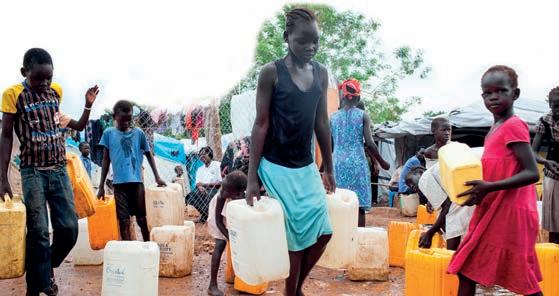

Reading
GLOSSARY *queue: a line of people waiting in a shop or similar place THE FACTS 5 6 7 8 73 MODULE 6 Make a difference
million people don’t have access to a toilet.
Grammar
Expressing agreement and disagreement
Expressing positive agreement
We use s o to agree with what someone says: S o + auxiliary / modal verb + subject
I love watching films. So do I.
Sandra likes going to the cinema. So does Ann.
Ben can swim. So can John.
I am busy. So am I.
Expressing negative agreement
We use n e i t h e r / n n o r to agree with a negative statement. N e i t h e r / N o r + auxiliary / modal verb + subject
I don’t like playing badminton.
Neither / Nor do I.
Carla doesn’t like jogging. Neither / Nor does Ann.
I wasn’t late for school yesterday.
Neither / Nor was I.
1 Make sentences using so or neither / nor, as in the example.
A: I like dogs more than cats.
B: So do I.
1 A: I love meeting new friends.
B: … .
2 A: I don’t like the cold weather.
B:
3 A: They are happy to meet them.
B:
4 A: I don’t eat raw fish.
B:
5 A: I can’t play the violin.
B:
6 A: He wasn’t at home last week.
B:
7 A: He likes learning English.
B:
8 A: My sister can speak Italian.
B:
Expressing disagreement
We use: subject personal pronoun + auxiliary / modal verb to disagree with what someone says:
I often go swimming at weekends. I don’t.
I don’t play computer games. I do.
I never walk to school. I do.
I am not going out this weekend. Really? I am.
I can drive a car. I can’t.
2 Agree or disagree.
Bob likes to travel. Oh, really? I don’t.
1 I enjoy skiing.
2 I never eat lemons.
3 She is a vet.
4 We play football in the park every Saturday.
5 I always use pictures in my projects.
6 They don’t take piano lessons.
7 I can ski.
3 Agree (+) or disagree (–) with Lucy. I like pizza. + So do I.
1 I’m a doctor. –
2 I don’t play handball. +
3 I can sing very well. +
4 I don’t dance. +
5 I’m at home now. –
6 I enjoy playing tennis. –
7 I never go swimming in winter. +
8 I usually tidy my room at the weekend. +
9 I am not meeting my friends tonight. –
4 Correct the mistakes.
I like sushi. So am I … So do I.
1 They aren’t friendly. So do I …
2 Doris doesn’t like sweets. I don’t …
3 He hates mushrooms. So am I …
4 We don’t like hokey. I don’t …
5 He is eleven. So do I …
6 I enjoy listening to music. Neither do I …
7 They are at school now. I don’t …
8 I never ride my bike to school. I don’t …
Grammar guide 6 page 140
74 MODULE 6 Make a difference
Listening Heroes
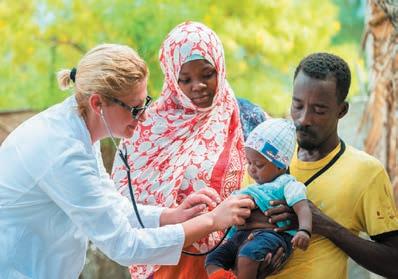

5 Listen to Ed, Rosie and Vicky talking about their heroes. First, look at the pictures. What jobs can you see?
6 Listen and match the person with their hero.
1 Ed a) Aunt Chantal
2 Rosie b) Mr. Benson
3 Vicky c) Tom Daley
7 Listen again and choose the correct words.
1 Tom Daley won the world championship in 2008 / 2009
2 Tom also helps his local school / a charity
3 Aunt Chantal is working in a camp for 700 / 100,000 people.
4 She’s working with children / families.
5 Mr. Benson is / isn’t finishing work next year.
8 Listen again and answer the questions.
1 How old was Tom when he competed in the Beijing Olympics?
2 Where is Aunt Chantal working?
3 What other job does Mr. Benson have?
9 Who is your hero? Why?

The BBC gives awards to sportspeople every year. Tom Daley is the first person to win the Young Sports Personality of the Year award more than once.
10
Famous people’s life stories – Leonardo da Vinci
Watch the video https://www.youtube.com/ watch?v=Rm0qszPJnc8.
Arrange the sentences about Leonardo da Vinci in chronological order.
1 At the age of 20 he started creating art work of his own.
2 He invented an early parachute and a version of the helicopter.
3 Leonardo worked as an apprentice to an artist named Verrochio.
4 Leonardo was very creative and he was full of ideas for inventions.
5 Two of his paintings, The Last Supper and The Mona Lisa are considered the most famous paintings in the world.
6 He started painting while he was a child and at the age of 14 he was sent to Florence.
7 Unlike many other artists da Vinci was famous and successful during his lifetime.
8 Leonardo da Vinci was born in 1452 and he was a painter, mathematician, scientist, engineer, inventor, sculptor, architect, botanist, musician and writer.
a b c
75 MODULE 6 Make a difference
Speaking Talking about the weather
1 Look at the picture. Where are Will and Izzie? What season is it?
2 Read the words in the box and check their meaning.
stormy rain lovely bad sunny weather forecast
3 Read the dialogue and fill in the gaps with the words in exercise 2.
Yes, but it was (2) … on our way back home. The wind was terrible! Did you have (1) … weather on your trip?
I don’t like going out in such (3) … weather! I prefer sunny days.
Are you going to the beach tomorrow?
We are going to have a beach party if it doesn’t (4) It depends on the weather.
I suggest listening to the (5)

4 Read the dialogue in pairs.
5 Order the words to make sentences.
1 prefer going to / the beach / I .
2 fantastic / imagine / I / it’s .
3 it’s / opinion / In / boring / my .
4 think / going out / more fun / I / must be .
5 opinion / my / the weather / In / was / awful .
Giving opinions
I think surfing in the ocean is fantastic in summer. In my opinion it can be dangerous if the weather is bad.
I imagine it’s exciting to surf when the waves are big.
I prefer swimming, I’m not a good surfer.
Practise
MODULE 6 Make a difference 76
Speaking task
Prepare the dialogue between you and Will.
Step 1
Look at the pictures of a holiday destination and decide where you would like to go.

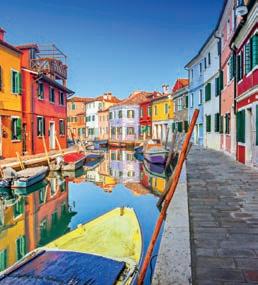
Step 2

Culture Weather in the UK

Think about what Will says.
I think going on holidays to … is … .
Do you think the weather is important for … ?
What’s your opinion about … ?
Think about what you say.
In my opinion … .
I imagine … .
I prefer … .
I think … .
Step 3
Write a dialogue.
Step 4
Work in pairs. Take it in turns to practise your dialogue.
The weather affects everyone, and everyone has something to say about the weather. This is especially true in a country like the UK that has very changeable weather. In the UK the weather from one day to the next can be completely different, or even from the morning to the afternoon. The weather can change from being rainy one day to sunny the next, or from strong wind in the morning to snow in the afternoon.
In the UK there are four seasons, spring, summer, autumn and winter, and the weather is different in each of them. The end of the winter season is the same as the start of the spring season. The summer is the season with the best weather. In general, it is hot and sunny with only a little rain sometimes. However, it can be cold and wet for one or two weeks at a time. In autumn the weather gets colder and there are stronger winds, also it will rain more. Frost might start to form on the ground towards the end of the autumn.
Winter is the coldest season in the UK. There might be snow, or just cold rain. Then, when winter ends the spring starts. The temperature gets warmer and the winds are not very strong.
Many people in the UK complain about the weather, but, as the weather changes so much, it gives them something to talk about all year round.
6 Read the information about the weather in the UK and answer the questions.
1 How can you describe the weather in the UK?
2 How quickly can the weather change?
3 What are the winters like in the UK?
7 Complete the e-mail from a boy in France to his friend in Scotland.
Hi Jack,
I’m (0) on holiday in Nice. I’m here (1) … my parents and my younger (2) … Louise. The weather is great. It’s always sunny and (3) … ! Yesterday we made new friends and we (4) … beach volleyball. It was great fun. There are also a (5) … of nice restaurants and shops here. My dad brought his (6) … with him because he likes taking photos. I will send you some photos (7) … I get home. So, how is (8) … summer holiday going?
Write and let me know!
Dominique
MODULE 6 Make a difference 77
6b Unit Health problems and first aid
Vocabulary
1 Read the words in the box and check their meaning. Which words can you use to describe pictures a–d?
broken arm cold cough cut earache headache insect bite sick sore throat stomach ache temperature
2 Listen and repeat.
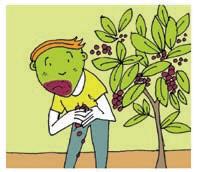



3 Choose the correct words.
She has got an insect bite / a cut on her arm because of the mosquitoes. She has got an insect bite on her arm because of the mosquitoes.
1 A headache / stomach ache is when you have a pain in your head.
2 He went outside without a coat in January and now he has got a cold / an insect bite
3 She has got a sore throat / stomach ache because she ate her dinner very quickly.
4 I was talking all day yesterday and now I have got a sore throat / a broken arm
4 Tell a story based on the pictures in exercise 2. These people met at the hospital. Imagine what happened to each of them and present the story to the class. Work in small groups.
5 Answer the questions. Use the words in the box. drink water have a sweet lie down put on a plaster take an aspirin
What do you do when you have … … a headache?
I take an aspirin and I lie down.
1 … a sore throat?
2 … a cough? 3 … a cut? 4 … a temperature?
6 INTERFACE Work in pairs. Ask and answer the questions in exercise 5.
Reading
7
Read and listen. What does Dave Morris do in his free time?
8 What is Dave Morris’s advice for the situations?
1 Someone feels tired.
2 Someone has got a broken leg.
3 You need to speak to the police.
4 Someone has an insect bite.
5 Someone has a temperature.
Mountain rescue!
Dave Morris works for the rescue service in the Lake District.
Q: Dave, is this your only job?
A: No, I’m an electrician, but in my free time I’m a volunteer for the rescue service.
Q: What are the most common problems?
A: A very common problem is exhaustion. If someone in your group looks tired, take a rest! Also, take with you high energy food, like chocolate.
Q: And what do I do if someone has got a broken leg or arm? Can I move them?
A: No, don’t move them! Call for help!
Q: Who can I contact?
A: You can call 112 to speak to the police. While you wait, keep the person warm!
Q: What about for minor things like insect bites?
A: Use cold water or a special cream, but if the person has a temperature, contact a doctor.

a b c d
MODULE 6 Make a difference 78
Grammar
The modal verbs: can, will – making a polite request
Polite requests AcceptingRefusing
Can I borrow your pen? Sure. Here you are.
Will you help me with the housework? Yes, of course. / Certainly
a) Sure. Here you are.
b) Certainly. Sorry, no.
Sorry, I’ve got an appointment.
Can I … ? is often used informally. We use this structure to make a polite request. Will you … ? is used in a friendly way, when we ask somebody else to do something for us. It is more polite than can.
9 Complete the sentences with can or will.
… I sit down here?
Can I sit down here?
1 … you open the door for me, please?
2 … I call you later?
3 … I go swimming?
4 … you please drive me to the airport tomorrow?
5 … you please pass me the lemon?
6 … I have this leaflet?
7 … you please come to the party tonight?
10 Choose the most appropriate response. Can I use your computer?
a) No, you won’t. b) Sorry, no.
1 Will you help me with my homework? a) Yes, I can. b) Certainly.
2 Can I have some more coffee? a) No, I can’t. b) Yes, of course.
3 Will you join us for dinner?
a) Yes, with pleasure. b) Sure. Here you are.
4 Can you bring me the dictionary?
a) Sure. Here you are. b) No, you won’t.
5 Can you hold this bag for me? a) Sure. Here you are. b) Certainly.
6 Will you turn off the lights, please? a) No, you won’t. b) Yes, of course.
7 Will you deliver this parcel for me? a) Sure. Here you are. b) Certainly.
11
Match the sentences in column A with the sentences in column B.
Column A
0 Will you open the window? It’s very hot! – h)
1 Can you show me the way to the museum?
2 Will you teach me how to fish?
3 Can I borrow your mobile phone?
4 Will you post this letter, please?
5 Can I sit next to you?
6 Will you help me lift this box, please?
7 Can you lend me some money, please?
Column B
a) Certainly. Let’s go fishing.
b) Sure. How much do you need?
c) Yes, take a seat, please.
d) Yes, of course.
e) Sorry, no.
f) Sure. It’s straight ahead, next to the hotel.
g) Sorry, no. I’ve got a bad back ache.
h) Yes, certainly!
12 Mrs. Smith asks the nanny to do some things while she is away. Use the prompts to make requests, as in the example.
Will you feed the baby?
1 put all the toys in a box
2 give the baby a bath
3 iron the clothes
4 take the rubbish out
5 water the plants


Grammar guide 6 page 140 1 4 5 2 3 MODULE 6 Make a difference 79
Writing A letter
1 Read and listen. Who are Haley and Matt’s heroes? Why?
Local Heroes.
Tell us about your hero. This could be a member of your family, a friend or someone who works in your town. There’s £10 for every letter we print!
Hello!

Hi!
A few years ago, my grandmother was in North Bridge Hospital for several weeks. The doctors told her, ‘You should change your habits!’ She began to eat a more healthy diet and she also started to do sport. Next week she’s running a half marathon to collect money for the hospital. She’s also thinking about working in the hospital as a volunteer. She intends to talk to patients who don’t usually have visitors. What a hero! Haley, Stourbridge.
I’m writing to nominate our vet, Mr. Rodgers. Last week, our dog Maggie jumped off our balcony. She had a broken leg and a terrible cut on her face too. Mr. Rodgers was very patient and he was also very kind. Maggie’s going to be fine. Thank you, Mr. Rodgers! Matt, Hexham.
£ £ £
Language
also and too

Use also and too to add new information and make your writing more interesting.
She also started to do sport. He was patient and he was also very kind. Maggie had a terrible cut on her face too
2 Look at the Language focus. Where do too and also go in the sentence?
3 Rewrite the sentences including the words in brackets.
She had a headache. She had a temperature. (too) She had a headache. She had a temperature too.
1 We’re running a marathon. We’re climbing Ben Nevis. (also)
2 He cleaned the kitchen and the living room. He washed the floors. (also)
3 They’re looking after children. They’re looking after animals. (too)
4 My uncle is friendly. He is kind. (also)

4 To practise your writing skills, go to Writing guide 3 on page 112.
5 Write a letter about your hero. Follow these steps. Use 80–100 words.
Writing a letter
Step 1 Plan
Make notes under three headings:
1 Who is your hero?
2 Why is he / she your hero?
3 What is he / she doing next?
Step 2 Write
Write a first draft. Use your notes from Step 1 and the letters on this page to help you.
Step 3 Check
Check your work. Try to include too and also.
Step 4 Write
Write your final copy and hand in your work.
6 Make a difference 80
MODULE
Literature Types of fiction
Dylan Thomas was a Welsh poet and writer. He wrote plays and short stories as well as poetry. He was born in Swansea in 1914 and he died in New York in 1953. His work was in English, not in Welsh, and he sometimes wrote radio plays, including Under Milk Wood, which is one of his most famous works. He often read his poetry on the radio and in theatres himself, and his voice was as famous as his writing while he was alive.
Under Milk Wood is in prose, which is written language in its ordinary form and usually used for plays or novels. Dylan Thomas is mainly known as a poet. Poems sometimes use rhyme and rhythm and they are shorter than prose. Plays are performed in the theatre and they are written as a script. Sections are often divided into acts and there are stage directions.
Read and listen. Answer the question. How are poems different from prose?

Vocabulary guide Weather and seasons















Health problems and first aid











broken arm coldcoughcutearacheheadacheinsect bitesicksore throatstomach ache temperature spring summer autumn winter cloudycold stormy dry sunny hot warm rainy wet snowy windy MODULE 6 Make a difference 81
Self-check 6
1 Complete the words with vowels.
1 cl_ _dy 4 st_rmy
2 a_t_mn 5 h_t
3 r_ _ ny 6
2 Match the symptoms with the cures.
1 II’ve got a sore throat. a) Here’s some cream.
2 I’ve got a temperature. b) Have a sweet!
3 I’ve got a horrible cut. c) Don’t move him.
4 I feel tired. d) You can take an aspirin.
5 I’ve got a mosquito bite. e) Lie down for a while.
6 He’s got a broken leg. f) Would you like a plaster? ---- / 6
3 Agree or disagree.
1 I live in London.
2 He enjoys skating.
3 I often eat burgers.
4 She is an actress.
5 He broke a vase.
6 She always tries to make tricks.
7 I didn’t go scuba diving.
8 I can ride a horse. ---- / 16
4 Agree (+) or disagree (–) with the following statements.
1 I’m extremely busy. +
2 I like going rollerblading. –
3 I don’t enjoy playing darts. +
4 I read a nice book last week. –
5 I can play the piano very well. +
6 I didn’t like the film last night. –
7 I don’t attend any club. +
8 I’m not at home tonight. – ---- / 16
5 Choose the correct answer.
1 Will you answer the phone, please? a) Yes, I can. b) Certainly.
2 Will you sign the papers now? a) No, you can’t. b) Yes, of course.
3 Can I talk to you for a minute? a) Yes, I can. b) Sure.
4 Will you phone the doctor, please? a) Yes, of course. b) Sure. Here you are.
5 Can you help me fix the shelf to the wall? a) Yes, I can. b) Certainly.
6 Can you help me with the cooking? a) No, I can’t. b) Yes, I’d be glad to. ---- / 6
6 Complete the sentences with can or will.
1 … you help me with my homework, dad?
2 … I go out tonight?
3 … I use your laptop for half an hour?
4 … you please post this letter tomorrow?
5 … you please pass me the orange juice?
6 … you tell me the gym schedule, please?
7 … you please come to my gradution ceremony?
8 … I sit on this chair? ---- / 8
7 Complete the dialogue with the correct form of the verbs in brackets.
Mum You (1) … (look) awful. What (2) … (be) wrong?
Lou I (3) … (run) and I (4) … (fall) down.
Mum Oh dear. (5) … it … (hurt)?
Lou Yes, and I (6) … (play) football tomorrow. What can I (7) … (do)?
Mum You must (8) … (put) some ice on it. Can you (9) … (move) it?
Lou No, not really. It (10) … (feel) really painful.
Mum Let’s (11) … (phone) the doctor.
Lou OK. (12) … you … (have got) the number?
Mum Yes, here you go.
Lou Thanks, Mum. ---- / 12
8 Writing: Write a letter or an e-mail to a friend to tell him / her about someone you admire and you consider a hero. Who is this person? What do you admire him / her for? What else is this person planning to do? Use 60–80 words. ---- / 30
Total ---- / 100
Now I can
Ø talk about weather & seasons, health problems & first aid;
Ø correctly use the modal verbs can & will to make a polite request; Ø give opinions; Ø write a letter.
spr_ng ----
/ 6
Don’t forget to complete the Behaviour observation sheet according to the example on page 7! MODULE 6 Make a difference 82


IN THIS MODULE YOU WILL LEARN:
Vocabulary
Grammar
Reading
Speaking
Writing
Culture
CLIL
• Life events
• Music
• The future tense simple – expressing future events
• Tag questions
• Know your future
• The road to success
• In a music shop
• Asking for and giving advice
• A class survey
• Music in schools
• ICT

Find the page numbers for:
Ø a baby sleeping
Ø teenagers in a music shop
Ø musical instruments
Competences: 1.1; 1.2; 2.1; 2.2; 2,4; 3.2; 3.4; 4.2. MODULE 7 83
AMBITIONS
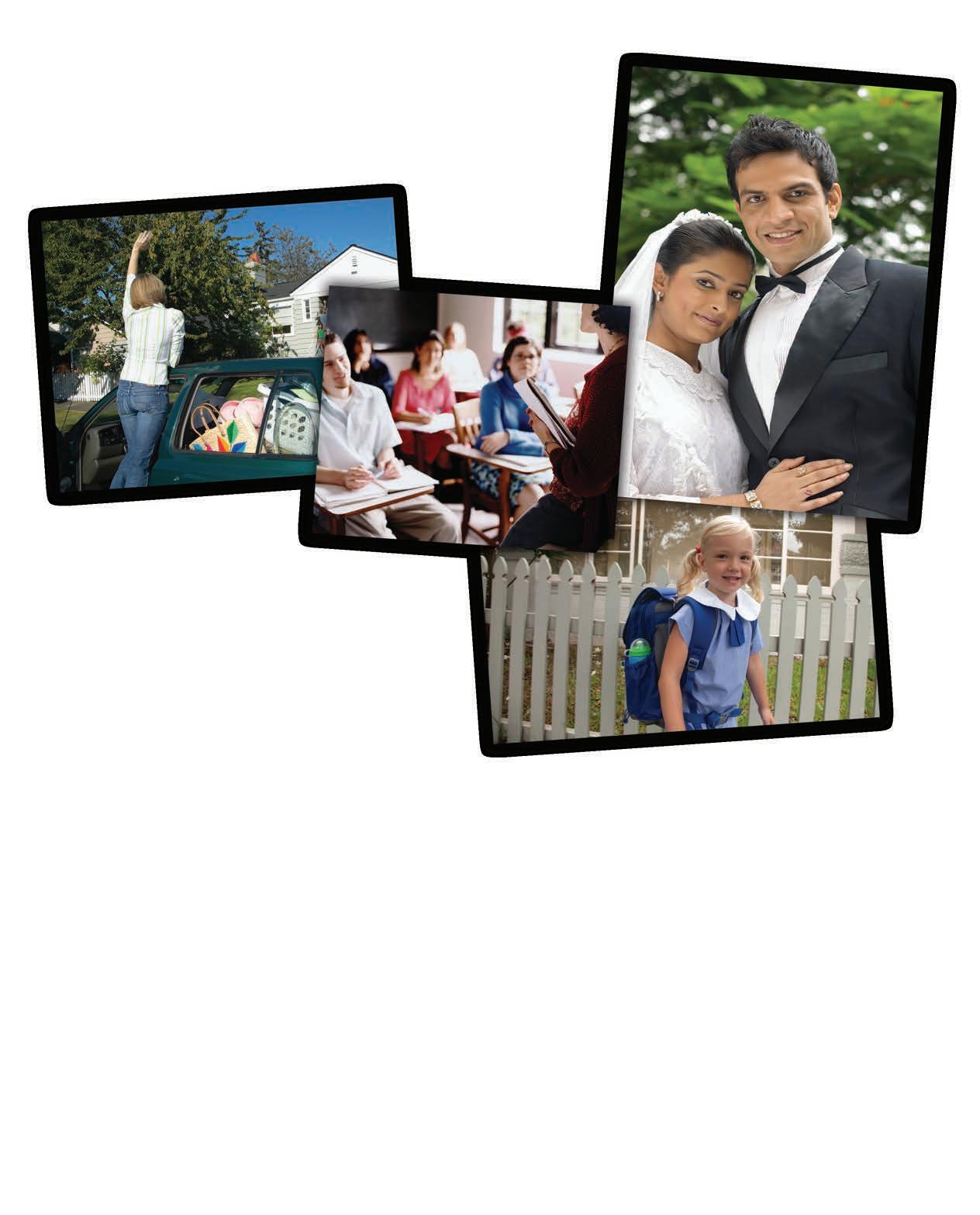
Vocabulary
1 Which of the words in the box describe the events in the pictures 1–6? be born buy a house get a job get married go to university have children learn to drive leave home leave school start school train to be a … work
2 Listen and repeat.
3 Complete the sentences with the correct form of the words in exercise 1.
We … in the countryside last year. We bought a house in the countryside last year.
1 I want to … to study chemistry when I am 18.
2 I … when I was five years old.
3 In the UK, you can … a car when you’re 17.
4 My dad … in a hospital in London in 1962.
5 My aunt … two … . Their names are Sara and Tarik.

4 Listen to Izzie and Lou. What are their ambitions?
5 Work in pairs. Ask and answer questions about your ambitions. I want to learn to drive. What do you want to do in the future?
Now say it!
1 2 3 4 7a Unit Life events MODULE 7 Ambitions 84

Reading
6 Read the sentences. Which ones do you think are true?
1 British boys leave home later than girls.
2 People get married younger in Spain than in Portugal.
3 The Chinese have more children than people in the USA.
4 The Swedish live longer than the British.
7 Read, listen and check your answers.
8 Answer the questions.
1 What do demographics tell you about living in Japan?
2 How old are British girls when they leave home?
3 In which countries do you get married at 30?
4 How many children has the average American got?
5 Which country has the most children per average family?
6 According to the text, is Sweden a good place to live? Why?
There are many words that end in -ics in English. Check the meaning of the following words: demographics, statistics, mathematics.

Know your future
Don’t read your horoscope, but look at the demographics for your country if you want to know your future. Demographics can tell you, for example, that if you are born in Japan, you’ll probably have one child and live until you are 83. They are statistics about real people in real places, and they can be fun. Here are some more …
Leaving home
If you’re a British girl, you’ll probably leave home when you’re about 23. The average British boy won’t leave home until he’s nearly 25. In Spain and Portugal, a girl will leave home at about 27, but a boy won’t leave until he’s nearly 30. In Finland, the average girl will leave home at 21 and a boy at 23.
Getting married
A person born in the UK, Spain or Japan will get married for the first time at about 29 years old. In Bolivia, Portugal or the USA, you’ll be 23 or 24. If you want to wait, go to Finland, France or Germany – you’ll get married at 30.
Having children
9 Look at the words in the box and check their meaning.
aerobics computer graphics economics physics politics
10 CLASS VOTE Look at the demographics in the text. Which country would you like to live in? Why?
In the USA, you’ll probably have two children. But the maths is more complicated in other countries. In the UK and China, a family will have 1.8 children, but in Spain they’ll have 1.4 – the same as in Portugal. Do you want more? Go to Bolivia, where the average family has 3.4 children.
Age
How long will you live? Iceland is a good place to live as you’ll probably live to around 82. This is similar to Sweden (81) and better than the UK (79), Turkey (72) or Russia (67).
5 6 MODULE 7 Ambitions 85
Grammar The future tense simple – expressing future events
affirmative
I will / I’ll
You will / You’ll
He / She / It / will / He’ll / She’ll / It’ll
We will / We’ll
You will / You ’ll
They will / They’ll get a job.
negative
I will not / won’t
You will not / won’t
He / She / It / will not / won’t
We will not / won’t
You will not / won’t
They will not / won’t
work in a hospital.
4
Complete the text with will and won’t and the verbs in the box.
be not get go leave study travel train

I think I (0) will leave home when I’m 18 years old. I think I (1) … to university. I (2) … history, but I (3) … a job immediately. I think I (4) … around the world and when I get back I (5) … to be a teacher. I think I (6) … really happy.
We use the future simple for:
• predictions with the verbs: think, believe, hope: I think Thomas will win the contest.
• on-the-spot decisions: I love this car! I’ll buy it!
• promises, offers, hopes: I’ll visit you soon!
I hope I’ll pass all my exams.
1 Look at the sentences in the table and complete the rules.
a) The … form of the main verb follows will / won’t
b) The short form of will is ’ll, the short form of will not is … .
2 Complete the sentences with the correct form of the verbs in brackets. Use will or won’t.
You will have (have) 15 children!
1 I … (go) to university when I’m 18.
2 He thinks he … (be) a famous scientist.
3 My friends … (not leave) school next year.
4 We … (get) married before we’re 40.
5 She studied a lot. She … (not fail) her exams.
3 Write complete sentences. Use will and won’t
Time expressions: tomorrow, next week / month etc., in a week / month etc.
5 Complete the sentences so they are true for you.
1 I hope we’ll … tomorrow.
2 I won’t … when I’m 16.
3 I think I’ll … next summer.
4 We’ll … one day soon.
5 We won’t … this weekend.
3 They / have two children.
4
1
I / learn to drive / at 17.
We / buy / a big house.
2
He / leave home / at 18.
MODULE 7 Ambitions 86
Will I Will you Will he / she / it Will we Will you Will they go to university?
Yes, I will. Yes, you will Yes, he / she / it will Yes, we will. Yes, you will Yes, they will No, I won’t. No, you won’t No, he / she / it won’t No, we won’t. No, you won’t. No, they won’t
6 Look at the sentences in the table. Do all the subjects have the same form of will? Can you use ’ll in the short answer?
7 Write complete questions. Use will. your family / always / live / in the same house? Will your family always live in the same house?
1 you / train / to be a vet / at university?
2 you / leave school / at 16?
3 you / have / good job / one day?
4 your best friend / play basketball / tomorrow?
5 everybody / buy / big cars?
8 Listen and check your answers.
Pronunciation will (’ll)
a Listen and repeat.
1 a) I go to university. b) I’ll go to university.
2 a) I have two children. b) I’ll have two children.
b Listen again. Do you hear a) or b)?
9 INTERFACE Work in pairs. Make predictions about your future using the ideas in the box.
drive a fast car get married go to university have a good job
What will you do?
I think I’ll go to university.
In the UK, there is a TV documentary series called Up. It follows the lives of 14 British people and films and interviews them every seven years. They filmed the first episode in 1964 when the participants were seven years old.


Rita and Paul are 13 years old and they’re talking about their future. Listen and complete their ambitions with a phrase in the box.
big car dentist DJ get married at 21 India the world
Paul 1 I’ll work as a … . 4 I’ll be a … .
I think I’ll work in … . 5 I’ll buy a … .
Listen to Rita and Paul aged 29. How many of their ambitions came true?
Listen again and answer the questions. 1 What did Rita study at university? 2 Which country does Rita frequently travel to? 3 What is she doing next year?
What is Paul’s job? 5 How many children has Paul got?
What do you think you’ll do before you’re 30?
In small groups make up a PowerPoint presentation about the things you are greatful for in life. Use digital content (audio, images, movies). Present the slides to the class. Grammar guide 7 page 141
Listening Ambitions 10
11
13
short answers affirmative negative
Rita
2
3 One day I’ll travel … . 6 I’ll … .
12
4
14
questions
MODULE 7 Ambitions 87
Speaking In a music shop
Listen
1 Look at the picture. What are Lou and Will looking at?
2 Listen to the dialogue. What does Lou decide to buy?
3 Listen again and choose the correct words.
I want to buy a guitar. Which one should I buy?
How much money can you spend?
You should buy a second-hand guitar. I’ve got (1) £200 / £300
Great idea! What do you think of these two?
(2) Pop / All kinds of music. What should I do?
Good idea! Yes, I’ll do that. Thanks, Will.

They both look fine. What kind of music would you like to play?
I think you should get an electric guitar. It’s (3) cheaper / more expensive, but you could join a band.
No problem.
4 Listen again and act out the dialogue.
5 Study the Functional language, then read the sentences below. Do they ask for advice (A) or give advice (G)?
1 What do you think of these two?
2 Which one should I buy?
3 You should buy a second-hand computer.
4 I think you should get this computer.
Asking for and giving advice
We use should to ask for and give advice: Which one should I buy? You should buy a second-hand guitar. What do you think of these two? What should I do?
I think you should get an electric guitar.
Practise
MODULE 7 Ambitions 88
Speaking task
Prepare a dialogue between you and Will.
Step 1
First, look at the musical instruments and decide which you want to buy.




Step 2
Think about what you want to say.
I want to buy a … . Which one should I buy?
I’ve got £… .
What do you think of these?
What should I do?
Think about what Will says.
How much money can you spend?
How about looking for a second-hand … ?
They look … . What kind of music would you like to play?
I think you should … .
Step 3
Write your dialogue.
Step 4
Work in pairs. Take it in turns to practise your dialogue.
Culture Music in
schools


6 Read and listen to the information about music in schools. Then answer the questions.
1 Where can teenage bands practise?
2 What famous bands formed at school?
3 What do school choirs sing?
7 Use the mind map below to speak about your favourite music.
A lot of music bands started at school. Many teenagers form bands and practise in their parents’ houses or garages. Famous bands that formed in school include The Beatles, U2, Muse, Green Day and The Red Hot Chili Peppers. Many children learn to play instruments such as the violin or the piano in school and in private classes. Some schools have an orchestra. There are sometimes concerts in the school, and some orchestras compete against other schools in regional or national competitions. They even sometimes travel to other countries. Some teenagers sing in school choirs after school or during lunchtime. Choirs sometimes sing classical songs or traditional folk music. Gospel choirs are also popular in both the USA and the UK. These choirs sing religious hymns. bands / singers My favourite music type instruments musical activities
MODULE 7 Ambitions 89
Vocabulary
1 Match the words in the box to the pictures.




2 Listen and repeat.
acoustic guitar drums electric guitar
flute keyboards percussion piano saxophone trumpet violin


3 Look at the picture and complete the text with words from exercise 1.
The Killers are a rock band from Las Vegas, the USA. Brandon Flowers is the vocalist and also plays the (1) … Dave and Mark play the (2) … and Ronnie plays the (3) …They are very popular and they have three albums: Hot Fuss, Sam’s Town and Day & Age





4 INTERFACE Work in pairs. Ask and answer questions about the musical instruments in exercise 1.
Can you play the keyboards?
No, I can’t. But I can play the guitar a bit.


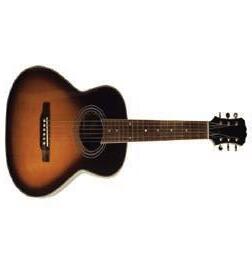

Reading
5 Read the text quickly and choose the best title.
1 I want to be on TV
2 The road to success
3 How to be rich
6 Read and listen to the text and answer the questions.
1 What is the minimum number of people in the band?
2 How often should you practise your songs?
3 What can make you different from other bands?
4 Why is it important?
The road to success
Do you want to be in a band? Have you got what it takes to be a star? Will you be successful? Read on and find out.
If you want to be a successful band, you’ll need at least one vocalist and three friends to play the guitar, the drums and the keyboards.
It’s important to practise every day. If you don’t practise, you’ll sound terrible and people won’t like your music or buy your songs.
Your look is important too. If you want to be famous, you’ll need an image to make you different. If people don’t like your image, they won’t buy your songs. If you have a good image, your fans will love you. They’ll buy your songs, they’ll go to your concerts and … congratulations! You will be the next big thing!
1 2 3 5 7 6 8 9 10 4
Dave Mark Ronnie Brandon
MODULE 7 Ambitions 90
7b Unit Music
Grammar Tag questions
Positive statement
Negative tag question
I am strong, aren’t I?
He is tall, isn’t he?
They have got e new flat, haven’t they?
He can swim, can’t he?
She loves music, doesn’t she?
You are coming to the party, aren’t you?
We finished the project, didn’t we?
They will leave tomorrow, won’t they?
Negative statement
Positive tag question
I am not British, am I?
He isn’t short, is he?
They haven’t got an old flat, have they?
He can’t ski, can he?
She doesn’t like fish, does she?
You aren’t coming today, are you?
We didn’t finish the essay, did we? They won’t paint the house, will they?
Tag questions are short questions at the end of statements used in speech when we want to:
• confirm that something is true or not, or
• encourage a reply from the person we are speaking to.
7 Choose the correct tag question.
She looks tired, does she / doesn’t she?
She looks tired, doesn’t she?
1 He’s not coming, isn’t he / is he?
2 I’m not late, aren’t I / am I not?
3 You don’t take sugar in coffee, isn’t it / do you?
4 The snow covered the street, didn’t it / isn’t it?
5 He arrived late, isn’t it / didn’t he?
6 He’ll be there, won’t he / isn’t he?
8 Complete the sentences with the corect tag questions.
You go shopping after school, don’t you?
1 It didn’t rain at the weekend, … ?
2 Mary studies Art at university, … ?
3 We will eat spaghetti, … ?
4 They aren’t visiting us next week … ?
5 She has got a new car, … ?
6 They can’t cook Chineze food, … ?
7 She always tidies her room, … ?
9
Complete the sentences with the correct tag questions.
Susie is at school, … ?
Susie is at school, isn’t she?
1 She’s from a small town in China, … ?
2 You have got a large family, … ?
3 They aren’t on their way already, … ?
4 We were late again, … ?
5 Alex isn’t an accountant, … ?
6 She hasn’t got a new job, … ?
7 They can swim well, … ?
10 Choose the correct tag question. He doesn’t speak German, … he? a) does b) doesn’t c) is He doesn’t speak German, does he?
1 You don’t like jazz, … you? a) like b) don’t c) do
2 Your brother is in Canada, … he? a) is b) doesn’t c) isn’t
3 We will eat soon, … we? a) do b) won’t c) will
4 You play the violin, … you? a) do b) don’t c) are
5 They have got two brothers, … they? a) have b) don’t c) haven’t
11 Match the sentences 1–5 with the correct tag question a–e.
0 Linda goes jogging every day, … ? – f)
1 You came to my house later, … ?
2 He doesn’t tidy his room, … ?
3 He isn’t able to play basketball, … ?
4 My parents will take us to the beach this summer, … ?
5 My mum is buying me a new computer game, … ? a) isn’t she? d) does he? b) didn’t you? e) won’t they? c) is he? f) doesn’t she?
Grammar guide 7 page 141
MODULE 7 Ambitions 91
Writing A class survey
1 Read and listen. Do you think your class’s answers to this survey will be similar?

Language
Amount

Use these expressions to talk about the results of a survey: Everyone wants to get a good job. Most students will have children. 50 per cent of students will learn to drive when they are 17.
A few students will have three children or more. No one will leave school when they are 16.
2 Look at the sentences in the Language focus. Check the meaning of the highlighted words.
3 Complete the sentences with an expression from the Language focus.
No one will get married when they are 16. (0 / 20 students)
1 … will train to be a nurse. (3 / 20 students)
2 … will go to university before they get a job. (10 / 20 students)
3 … will buy a house first. Then they’ll get married. (18 / 20 students)
4 … wants to have children. (20 / 20 students)
Our future
I asked 20 people in my class about their predictions for the future. Here are the results.
Will you leave school when you are 16?

No one will leave school when they are 16. Most students want to go to university so they need to study A-levels first.
Will you learn to drive when you are 17?
50 per cent of students will learn to drive when they’re 17. Some students have got older brothers or sisters who had driving lessons on their 17th birthday. A few students will learn to drive when they finish university.
Will you get married before you are 25? Will you have children?
No one will get married before they’re 25. Everyone wants to get a good job and buy a house first. Most students will have children. A few students will have three children or more.
Patrick
4 Write the results of a class survey. Follow these steps. Use 80–100 words.
Writing a class survey
Step 1 Plan
Prepare a class survey about ambitions. Ask your classmates three or four questions.
Step 2 Write
Write a first draft. Use your results from Step 1 and the class survey on this page to help you.
Step 3 Check
Check your work. Try to use the expressions A few, Everyone, 50 per cent, Most students and No one
Step 4 Write
Write your final copy and hand in your work.
leave school at 16 go to university good job and house learn to drive at 17 three or more children Class survey: Our future Number of students 20 15 10 5 0 MODULE 7 Ambitions 92

ICT
Dot-com companies
Silicon Valley is south of San Francisco. It’s home to many large technology companies such as Apple and Hewlett-Packard and also many dot-com companies. These are companies like Google, Facebook and eBay which operate mainly over the internet.
But where did the dot-com company come from?
In 1985, the World Wide Web was first introduced to the world. A company called Symbolics became the first company to register its address, or URL, on the web. Today, there are 200 million websites in existence, and one domain is registered every three minutes in the UK alone. But it took a long time for the internet to become the phenomenon it is today. It was when Sir Tim Berners-Lee put up the first website in 1990 (info.cern.ch), that the internet took off.
During the 1990s, there was a dot-com boom. Many people became rich because of the World Wide Web. In 1998, PhD students Larry Page and Sergey Brin invented Google. These days, this search engine is the world’s most recognizable brand and, in 2011, it was valued at $192 billion.
Read and listen. Answer the questions.
How do you say the following in your language?
1 @ 2 www. 3 .com 4 .co.uk
Vocabulary guide
Life events














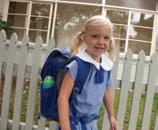








be bornbuy a houseget a jobget marriedgo to universityhave children learn to driveleave homeleave schoolstart schooltrain to be a …work Musical
acoustic guitar drumselectric guitar flutekeyboardspercussionpianosaxophonetrumpetviolin
instruments
MODULE 7 Ambitions 93
1 Identify the life events.
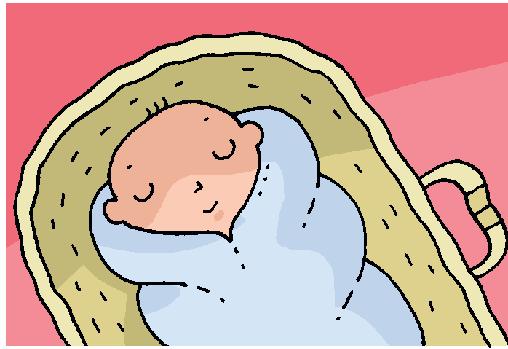
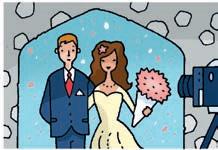




2 Order the letters to make musical instruments.
1 oxophsaen 5 spsrcneuoi
2 mudrs 6 cusaitco tgiura
3
5 Answer the questions in exercise 4 so that they are true for you. ---- / 5
6 Match the sentences 1–5 with the tag questions a–e.
1 He often watches TV in the evening, … ?
2 The mall is closed today, … ?
3 They are ready, … ?
4 Your father has got a blue car, … ?
5 We are collecting old CDs, … ?
a) hasn’t he? d) doesn’t he?
b) aren’t they? e) aren’t we?
c) isn’t it? ---- / 10
7 Complete the dialogue. Use the correct form of the verbs in brackets.
Dad What (1) … you … (look) at?
Izzie I (2) … (think) about my future and I (3) (not be) sure what subjects to choose.
Dad Oh! What (4) … (be) the options?
Izzie I (5) … (look) at the options at the moment. All my friends (6) … (go) to do biology and chemistry.
Dad Well, what do you want to do in the future?
Izzie That’s the problem. I (7) … (want) to work with animals two years ago. Now I think I (8) … (work) with people.
Dad You can (9) … (write) a list of your favourite subjects and you (10) … (know) which subjects to do.
Izzie Thanks a million, Dad. That’s a really good idea. ---- / 20
8 Writing: Write about the most important event in your life up to now. Where were you? What happened? Why is this event important for you? Use 60–80 words. ---- / 30
Total ---- / 100
b_ b_ _ _ s_ _ _ _ s_ _ _ _ _ g_ _ m_ _ ri _ _ g_ _ a j_ _ l _ _ _ _ t_ d _ _ _ _ l_ _ _ _ h_ _ _ ---- /
6
tufle 7 tpmtreu 4 nliivo ---- / 7 3 Complete the sentences with will / won’t. In 2030 … 1 more people … (be) older than 65. 2 I … (have) a good job. 3 we … (use) computers to study. 4 more people … (not get) married. 5 I … (not drive) a car, but I … (ride) a bike to work. 6 The population of the world … (be) 8 billion. ---- / 12 4 Order the words to make questions. 1 you / when you’re older / Will / live abroad ? 2 go to university / when you are 18 / you / Will ? 3 be / your teacher / Will / tomorrow / at school ? 4 you / one day / train / Will / to be a doctor ? 5 your sports team / Will / one day soon / win / an important competition ? ---- / 10 1 3 5 2 4 6 Self-check 7 Now I can Ø talk about life events, music; Ø correctly use the future tense & tag questions; Ø ask for and give advice; Ø write about life events. Don’t forget to complete the Behaviour observation sheet according to the example on page 7! MODULE 7 Ambitions 94
FUN AND GAMES

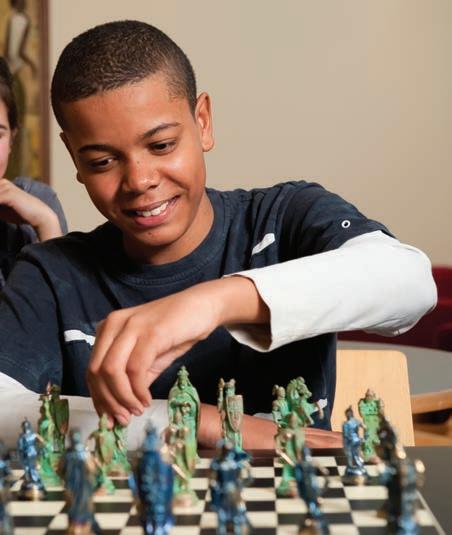
IN THIS MODULE YOU WILL LEARN:
Vocabulary
Grammar
• Entertainment
• Places to visit
• Tense review: present simple and continuous, past simple, future simple
• Adverbs of time / place / manner –expressing details
Reading • A history of games
• Talking about holiday plans
Speaking • At a holiday camp
• Expressing preferences
Writing • An e‑mail
Culture
CLIL
• Beaches in the UK
• Language

Find the page numbers for:
Ø a Monopoly game Ø a notice board Ø a safari park
95
Competences: 1.1; 1.2; 1.3; 2.1; 2.2; 2.4; 3.1; 3.4; 4.2. MODULE 8


Vocabulary
1 Match pictures 1–6 with the verbs in the box. Which verbs aren’t in pictures? beat cheat count give up guess land lose miss a turn move a counter roll a dice
2 Listen and repeat.
3 Complete the sentences with words from exercise 1.
I don’t like playing GO becase I usually … . I don’t like playing GO becase I usually lose
1 He’s better than me. Every time I play with him I … .
2 My brother … at cards. He always looks at the cards of the other players!
3 I don’t know the answer. I … !
4 To start the game, … and get a six.



Listen to Lou and Will. Which games in the box do they describe? chess Ludo Monopoly
96
Now say it! 4
5
a game.
questions.
game it is. Is it Ludo? This is a game for four people. 2 1 4 3 8a Unit Entertainment MODULE 8 Fun and games
Trivial Pursuit
INTERFACE Work in pairs. Choose
Then ask and answer
Guess which

A history of games
Does your family ever sit together and play games?
This fun activity is, in fact, over 5,000 years old.
Perhaps the first known game was Senet, an ancient Egyptian game which appeared in about 3100BC! Archaeologists have found many Senet boards in Egyptian tombs, but they haven’t found the rules anywhere.
A version of backgammon appeared in China about 3700 years later. Go came from China but it became popular in Japan in the 7th century. They are both games of strategy for two players. In backgammon, the players roll a dice to move their pieces. The winner is the first person to take all their pieces off the board. In Go, the board is empty at the beginning and the players don’t roll a dice. The

winner is the person who has got the most counters on the board at the end.
Playing cards first arrived in Europe in the 1300s from China. Chess appeared about 100 years after that. The modern board game was finally born in 1935 when the company Parker Brothers introduced Monopoly to the USA.

Fifty years later, German-style board games began to appear, for example The Settlers of Catan in 1995. This game is very different from American games like Monopoly. In Settlers, players build villages and roads across a board, the game moves fast, and players interact with each other when someone rolls the dice. There isn’t any direct competition between players and nobody is eliminated.
8 Match the descriptions with the games.
1 Players don’t compete against each other.
2 Players put counters on an empty board.
3 The game has no written instructions.
4 Players take their pieces off the board.
6 Read and listen to the text. Put the games below in the correct chronological order.
backgammon chess Go Monopoly playing cards Senet Settlers
7 Read the text again. Choose the correct words.
1 People played / didn’t play board games 4,000 years ago.
2 The first board game comes / doesn’t come from China.
3 Backgammon is similar to / different from Go.
4 The modern board game comes from America / Europe
Extend your vocabulary by making a list of compound nouns.
9 Make compound nouns with card and game and the words in the box.
ball birthday board computer video
10
CLASS VOTE Which game in the text would you like to play? Why?
97
Reading
5 6 MODULE 8 Fun and games
Grammar Tense review
present simple present continuouspast simple future simple habits:
We meet our friends at the club on Saturdays. routines: Linda goes to university at 9 o’clock in the morning.
timetables, programmes: The plane takes off at 11 o’clock.
permanent states: We live in Romania.
time expressions: every day / weekend / year etc., always, usually, never, on Mondays, once a week etc.
actions happening at the time of speaking: I’m having dinner at the moment.
temporary situations: He’s looking for a new job these days.
making plans for the near future: They’re flying to London in two hours.
annoying habits when used with always: You are always forgetting things!
time expressions: at the moment, now, this week, these days, today etc.
1 Complete the sentences with the correct form of the verbs in brackets. Use the present simple or present continuous.
Every year, our school … (have) a chess competition.
Every year, our school has a chess competition.
1 I never … (take part) because I … (not like) chess.
2 At the moment I … (watch) the competition.
3 Lou … (not play) right now but Will … (beat) his opponent.
4 Will often … (win) the school competition.
5 Will … (stand up) and he … (smile). He’s the winner!
2 Complete the sentences with the future tense simple.
Sandra … (go) to school next Sunday. Sandra will go to school next Sunday.
1 Her school … (organize) a chess competition.
2 The participants … (not bring) their own chess boards.
3 Each student … (have to) find a partner.
4 The pupils … (play) chess for several hours.
5 Who … (win) the competition this year?
6 The winner … (receive) a summer camp as a prize.
actions which happened at a definite time in the past:
We met our friends at the concert last Saturday.
actions which happened immediately one after the other in the past: First she bought her ticket, then she got on the train.
time expressions: yesterday / last weekend / year etc., two days / months etc. ago, in 2015, then
predictions about the future with the verbs think, believe, hope, expect:
His teachers think he will become a great artist.
on-the-spot decisions: I’ll buy this dress. promises, requests, offers, hopes: I’ll call you next week. I hope pollution will disappear time expressions: tomorrow, next week / month etc., in a week / month etc.
3 Complete the text with the correct form of the verbs in brackets. Use the past simple.
Can you complete the

RUBIK’S CUBE?
Ernő Rubik is the inventor of the Rubik’s Cube. He (0) was born (be born) in Budapest, Hungary. He (1) … (love) visual art and he (2) … (study) architecture. Then, he (3) … (begin) to work as a teacher. In 1974, Rubik (4) … (invent) his cube, but he (5) … (call) it the ‘Magic Cube’. When Rubik first (6) … (make) the cube, he (7) … (not know) how to solve his new puzzle, but a month later, he (8) … (find) the solution. In 2007, a Frenchman (9) … (become) the first person to complete the cube in under ten seconds.
98
MODULE 8 Fun and games
4 Choose the correct tense for each verb.
I had / will have lunch with Jane last Sunday.
I had lunch with Jane last Sunday.
1 It is raining / will rain heavily now.
2 I got up / am getting up early yesterday.
3 My parents watched / watch TV every evening.
4 David won’t play / didn’t play tennis next week.
5 My best friend and I had / will have dinner at a restaurant tomorrow.
6 We dodn’t go / aren’t going on holiday by plane every year.
Pronunciation
Present simple and past simple
a Listen and repeat.
1 a) I play with my friends. b) I played with my friends.
2 a) We look at the cards.
b) We looked at the cards.
3 a) They study Italian.
b) They studied Italian.
b Listen again. Do you hear a) or b)?
5 Order the words to make questions. you / How often / play / board games / do ? How often do you play board games?
1 your teacher / watching / Is / right now / TV ?
2 at the moment / you / What / doing / are ?
3 celebrate / How / did / your last birthday / you ?
4 have / your family / at 8 pm / Will / dinner ?
5 What / have / subjects / yesterday / did / you ?
6 Answer the questions in exercise 5 so they are true for you.
I sometimes play board games at night.
7 INTERFACE Work in pairs. Ask and answer the questions in exercise 5.
I play board games every weekend. How often do you play board games?
Listening Travel games

8 Listen to two children describing three travel games. Do you need a pencil and a piece of paper to play them?
9 Listen again and answer the questions. Game 1
1 How many questions can the players ask?
2 What is the answer to each question? Game 2
3 What do the players describe?
4 How many sentences do you have to say? Game 3
5 What is the game called?
6 What number do the players count to?
10 Do you know any other travel games?
The most popular pencil and paper game in the Western world is Noughts and Crosses. Did you know there are 26,830 possible game combinations on a 3x3 grid?
99
Grammar guide 8 page 142 MODULE 8 Fun and games
Speaking At a holiday camp
Listen
1 Look at the picture. What are Izzie and Lou doing?
2 Listen to the dialogue. What do Izzie and Lou decide to do?
3 Listen and complete the dialogue.
We could try the (1) What shall we do today?
I don’t really feel like doing that today.
To be honest I’d like to visit the (2)
What would you like to do?
OK. Let’s do that. And what shall we do in the evening?
I don’t fancy a film tonight. I prefer going dancing. Let’s go and see a (3) … .
OK. How about going to the disco?

Good idea. It will be fun.
4 Listen again and repeat the dialogue.
5 Match the questions with the answers.
1 What shall we do today? a) I’d like to go walking.
2 What shall we do tonight? b) Let’s go to the cinema.
3 What would you like to c) We could try the beach. do?
Functional language
Expressing preferences
We could try the swimming pool.
I feel / don’t feel like doing that today. To be honest, I’d like to visit the museum. Let’s go and see a film.
I don’t fancy a film. I prefer going dancing.
100
Practise
MODULE 8 Fun and games
Speaking task
Prepare a dialogue between you and Lou.
Step 1
First, decide what activities you want to do today and this evening.

What’s On
Beach volleyball: Today at 11 am.
Pirate show at the museum: Today at 2 pm.
Beach barbecue:
Tonight 8 pm
Karaoke night!
Tonight 8 pm
Step 2
Think about what you want to say.
What shall we do today?
I don’t really feel like doing that. To be honest, I’d like to ... . Let’s … .
How about … ?
Think about what Lou says. We could try the … . What would you like to do?
What shall we do this … ?
I don’t fancy … . I prefer … .
Step 3
Write your dialogue.
Step 4
Work in pairs. Take it in turns to practise your dialogue.
Culture Beaches in the UK
The UK has some very popular beaches. Some are peaceful and wild. These are good for walking and doing sports. Some beaches are popular with tourists. These are very busy in summer. Newquay is in the southwest of England, on the Atlantic coast. It has nine sandy beaches and about 22,000 residents. In summer, the population is about 100,000. It is very popular with surfers and there are international surfing competitions every year.
Blackpool is the most important seaside town in the UK, with about 10 million visitors every year. It is in the northwest of England about 50km from Manchester and Liverpool. It was the first town in the world to have electric street lights and it’s famous for its tower, which is very similar to the Eiffel Tower in Paris.
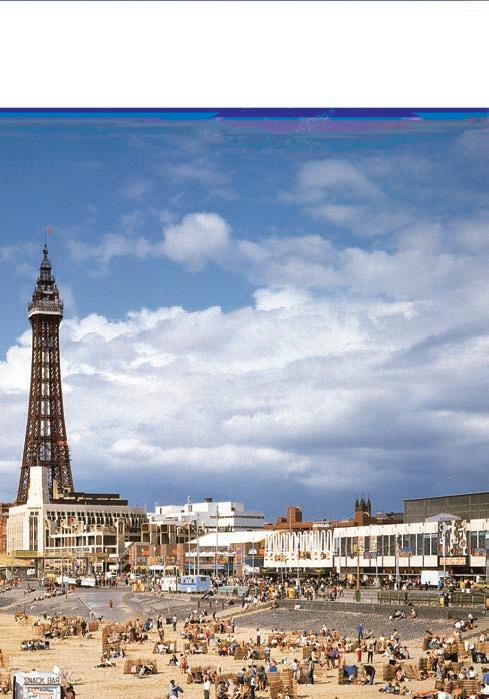
6 Read and listen to the information about beaches in the UK. Then answer the questions.
1 Where is Newquay?
2 What is the population in the summer?
3 What competitions take place in Newquay?
4 How many visitors go to Blackpool every year?
5 What is Blackpool famous for?
7 Follow the link: https://www.youtube.com/ watch?v=WFRR0zC70-0
1 Watch the video. Work in small groups. Imagine you are travel agents and design a PowerPoint presentation for a three day trip in a city of your choice.
2 Present your slides to the class.
101
MODULE 8 Fun and games
Vocabulary
1 Match pictures 1–10 with words from the box.










Reading
6 Read and listen to the text. Where is Lou going in August?
Subject: Summer holidays
Choose the correct words.
Nelson’s Column is a statue / an art gallery in London.
Nelson’s Column is a statue in London.
1 The Alcazar is a famous castle / waterpark in Segovia.
2 The Louvre is a market / an art gallery in Paris.
3 The Great Wall of China is a monument / a market in China.
4 Write sentences about your holiday preferences. Use the words in exercise 1 and your own ideas. I prefer beaches to water parks. 5 INTERFACE Work in pairs. Compare your answers to exercise 4. aquarium art gallery campsite castle market fishing port monument safari park statue town square water park
Hooray! We finished all our exams and now we’re waiting for our results. Tonight Izzie’s having a party in her garden. We’re celebrating the end of the school year. If it rains, we’ll have the party inside.
I’m so excited because this summer will be great. In August, I’m going to France for two weeks with my family. We’re staying at a campsite in a small fishing port. We’ll probably ride bikes every day if the weather is good. My mum says we’ll go to a water park and to Paris for a couple of days too.
And then I’ll be free for the second half of August. I’ll work at the market again with my aunt to earn some extra money. But I won’t work every day. I will have some free time too. What are your plans for the summer?
7 Read the text again. Are the sentences true or false? Correct the false sentences.
Lou received her exam results. F Lou is waiting for her exam results.
1 Lou is celebrating with Izzie in the evening. 2 Lou is staying at a campsite. 3 Lou will go to a safari park.
Lou will go to work every day.
102
2
3
Listen and repeat.
8b Unit Places to visit
3 8 4 7 9 10 5 6 1 2 MODULE 8 Fun and games
4
Grammar
Adverbs of time / place / manner –expressing details
adverbs of time describe WHEN something happens
We are going to London tomorrow. They went to the cinema last week
adverbs of place describe WHERE something happens
He walks downstairs They play in the park
8 Choose the correct adverb.
We played in the basketball tournament yesterday / hard
We played in the basketball tournament yesterday.
1 He made his request very politely / yesterday
2 I always take a bath before / carefully I go to bed.
3 I always / hard eat breakfast before I go to school.
4 You should drive slowly / tomorrow when it rains.
5 People usually walk their dogs two days ago / in the park
9 Fill in the gaps with the correct adverb form of the adjective in brackets.
He’s a (bad) player. He plays badly
1 The old man is (slow). He walks … .
2 The children are (happy). They are playing … .
3 Alex is a (hard) worker. He works very … .
4 The apprentice is a (good) worker. He works very … .
5 The athlete is a (fast) runner. He runs very … .
6 The teacher was (clear). She explained the rule very … .
10 Complete the sentences using adverbs of time and place.
I don’t watch TV … .
I don’t watch TV in my room at night.
1 I listened to music … .
2 Joyce goes … .
3 They played football … .
4 I meet my friends … .
5 She is … late for school.
adverbs of manner describe HOW something is done adjective + -ly = adverb: quick + -ly = quickly He drives safely She spoke angrily They sing beautifully.
The word order of adverbs is: manner, place, time.
She runs fast in the park every day
11 Order the words to make sentences. tennis / My friend / every Saturday / plays / at the sports club . My friend plays tennis at the sports club every Saturday.
1 in the morning / wake up / You / early .
2 can’t / fast / swim / I / in the ocean .
3 every week / dance / at the dancing club / fantastically / They / flamenco .
4 paints / Amy / during the Art class / beautifully . 5 at the school festival / sang / happily / The students .
12 Write the adverbs from the box in the correct column.
there, yesterday, slowly, sometimes, sadly, inside, outside, now, soon, quietly, never, happily, today, everywhere, always, easily, often, near, before, here, after, downstairs usually, safely, early, fast
mannerplacetime slowlythereyesterday
13 Read the story and fill in the gaps with the adverbs below to give more details.
In the morning, last night, suddenly, bad, sadly, around, terribly, quickly, carefully, in the forest × 2, on the ground, now, hard
There was a big storm (0) in the forest, (1) … . (2) … Froggy looked sad. Everyone was feeling (3) … . Their lovely forest was a big mess. They all looked (4) … and thought (5) … : “Everything is dirty, many trees are broken and our beautiful pond is (6) … polluted”. They (7) … decided to clean it up. The bears will gather the leaves (8) … and collect the fallen sticks and (9) … pile them up (10) … . They all worked (11) … and (12) … everything is tidy again (13) … .
103
Grammar guide 8 page 142
MODULE 8 Fun and games
Writing An e-mail
1 Read and listen. Answer the questions.
1 Where is Naomi at the moment?
2 Was it an easy year for her? Why not? 3 Where is she going on holiday? 4 What will she do there?
Hi,
I’m sitting outside and I’m writing this e‑mail to you on the last day of term. We’re all feeling really excited. The holidays are beginning! Hooray!
This wasn’t an easy year for me. As you know, we moved here last July and I started my new school in September. But I was lucky – all my classmates were really friendly from the first day. They often invited me to their houses. Once, when we had a class project, they all came to my house to write a song together. I made some amazing new friends. And the holidays? We’re going to Malta for two weeks. It’s an island in the Mediterranean. My dad was born there. I think we’ll explore the island, visit the museums and monuments and have a good time.

Did you have a good year? What are your plans for the summer? Write soon, Naomi
Language
Verb tenses

Make your writing more interesting by using a variety of verb tenses.
2 Find examples of the following in the text. the past simple We moved here last July
1 the past simple
2 the present simple
3 the present continuous
4 the future
3 Write complete sentences. Use past, present and future tenses.
We / finish / school / yesterday. We finished school yesterday.
1 I / always pass / all my exams.
2 I / write to you / and I / eat / an ice cream now.
3 Tonight / we / have / a party to celebrate.
4 Next week / we / go to visit / a museum in Rome.
5 I / hope / you / write back / soon.
Class portfolio 4 page 119
Design a portfolio with the title “Visit my area!”. Work in small groups.
4 To practise your writing skills go to Writing guide 4 on page 114.
5 Write a reply to Naomi’s e-mail. Follow these steps. Use 80–100 words.
Writing an e-mail
Step 1 Plan
Step 2 Write
Write a first draft. Use your notes from Step 1 and Naomi’s e‑mail to help you. Include an opener: Hi / Hello / Dear, and a closer: Write soon / Bye for now
Step 3 Check
Check your work. Try to talk about the past, present and future.
Step 4 Write
Write your final copy and hand in your work.
104
notes
three headings: 1 What
you do this year? 2 Where
holiday? 3 What
there?
Make
under
did
are you going on
will you do
MODULE 8 Fun and games
Language Regional dialects
Most languages spoken in the Caribbean belong to one of four major European tongues: English, Spanish, French or Dutch. English is the most commonly spoken language due to the UK’s colonial background in the region and today’s high rate of tourism.
As well as these languages, there are many regional dialects. The most common is Patois, a combination of English, African words and French. Creole is also widely spoken in the Caribbean but there are different versions of it. The language spoken in Barbados is close to standard English while people in Jamaica have a more distinct local language. Both of these languages borrow a lot of words from other languages.
Read and listen. Answer the question. What languages is Patois a combination of?

Vocabulary guide Playing games
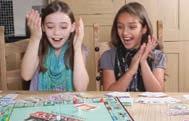





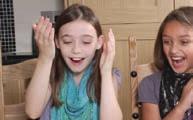



Places to visit


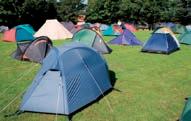








105
beat cheat count give up guess land lose miss a turnmove a counterroll the dice
aquarium art gallery campsite castle fishing port marketmonumentsafari park statuetown squarewater park
MODULE 8 Fun and games
Self-check 8
1 Complete the words with vowels.
1 ch_ _t 3 m_v_ _ c_ _nt_r
2 r_ll _ d_c_ 4 l_se ---- / 4
2 Identify the places.




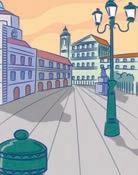

3 Complete the sentences with the correct form of the verbs in brackets.
1 She … (win) the chess competition yesterday.
2 I … (not play) cards last night.
3 My sister often … (cheat) when we play cards.
4 They … (lose) the game at the moment.
5 We … (visit) an art gallery tomorrow. ---- / 10
4 Complete the sentences so they are true for you. Use the correct verb tense.
1 I … at the moment.
2 My best friend often … at the weekend.
3 My parents … yesterday.
4 I’m going to … this summer.
5 I think … next year. ---- / 10
5 Write complete sentences using the right tenses.
1 We / play / cards / at the moment.
2 Paula / win / and I / lose last night.
3 We / often / play chess / on Saturday afternoon.
4 We / usually / meet / at Katie’s house.
5 We / not play / at Katie’s house yesterday. ---- / 10
6 Order the words to make questions.
1 cards / your best friend / playing / Is / now ?
2 your dad / How often / cheat / does / at cards ?
3 Where / are / today / having / you / dinner ?
4 last summer / you / did / What / do ?
5 do / you / What / will / tomorrow ? ---- / 10
7 Correct the mistakes in the following sentences. Pay attention to the word order.
1 The man drove fastly to the city center.
2 Please don’t speak in the library loudly!
3 She tries hardly to get good grades.
4 They finishes the project yesterday quickly.
5 He was born in 1984 in Rome. ---- / 10
8 Complete the dialogue with the correct form of the verbs in brackets.
Lou Hooray! The school year (1) … (be) over!
Will What shall we (2) … (do) tonight? We could (3) … (go) to the cinema or we could (4) (watch) a film at my house.
Lou I’d rather (5) … (watch) a film. I (6) … (not have got) any money.
Will Izzie (7) … (not do) anything tonight.
Lou But she usually (8) … (play) chess on Friday with her cousin.
Will She (9) … (not play) tonight because her cousin (10) … (go) to New York yesterday.
Lou Cool! I’ll phone Izzie. ---- / 10
9 Writing: Write an e-mail to a friend telling him / her about your plans for the summer holidays.
Use 60–80 words. ---- / 30
Total ---- / 100
Now I can
Ø talk about games & holidays; Ø correctly use adverbs of time, manner & place; Ø express preferences; Ø write an e‑mail.
106
1 2 3 4 5 6 ----
/ 6
Don’t forget to complete the Behaviour observation sheet according to the example on page 7! MODULE 8 Fun and games
Let’s have fun! Sketch 1
1 Listen and answer the questions.
1 Why are the children looking at a wall?
2 Where was the street art exhibition?
3 Which wall do they need to paint?
2 Read and listen to the dialogue. Check your answers.
Street artists
Ben Hi, guys! What are you doing? Why are you looking at that wall?
Olivia We need to decorate it for our art project.
Liam Yes, it’s for Miss Smith, but we don’t know what to do.
Sophie I can’t think of any good ideas.
Ben Can I help?
Liam Yes, of course. Have you got any good suggestions?
Ben Well, yes. Did you see that street art exhibition last year?
Sophie Where was it? Was it in the museum?
Olivia No, it wasn’t. It was in the shopping centre. I saw it. It was great.
Liam I saw it too. I really liked Miss Van. She draws cartoon characters, mainly women.
Sophie I read about Miss Van. She was born in France and she started to paint the walls of Toulouse when she was 18.
Olivia And now she’s living in Barcelona.
Liam So, why don’t we do some cartoon characters?
Ben Let’s do cartoons of the teachers and some of the students.
Sophie Olivia, you often draw pictures of the teachers. Why don’t you design the wall?
Olivia How many people shall we draw?
Liam I’m not sure. This wall isn’t very big.
Ben Wait a minute! Which wall did Miss Smith say?
Olivia The gym wall.
Sophie But this isn’t the gym wall. It’s the wall of the music room!
3 Work in groups. Practise and perform the sketch.
• Choose a character.
• Read and learn your lines.
• Perform for your class.
Read and say! Joke time!
If a dog chews shoes, whose shoes does he choose?
Can a kangaroo jump higher than a house?
Of course, a house doesn’t jump at all.
107
Writing guide 1
Language focus: conjunctions
1 Complete the sentences with and, but or because.
1 I’m scared there are snakes here.
2 We’re fishing in the river we’re hunting in the forest.
3 She loves hiking she doesn’t like climbing mountains.
4 My dad’s building a fire it’s cold.
5 I’m cooking I’m not hungry.
6 We’re taking a tent we’re sleeping in it too.
2 Complete the text with and, but or because
Day Three
It’s the third day of my holiday (1) we’re in Yellowstone Park, USA. Today we’re hiking about 15km around Yellowstone Lake. I’m a little scared (2) there are bears in the forest!
There are five of us in the group. I’m with my American cousins Josh and Olivia (3) my uncle and aunt. My uncle Doug often camps in the wild. His wife Jade doesn’t like camping very much (4) she’s here too. In England, I never hike or camp (5) I’m having a good time.
I’m surprised (6)
I’m not tired after our long hike this morning. At the moment, we’re sitting next to the lake (7) we’re fishing. In the afternoon, we’re going to Old Faithful. That’s a famous geyser. We’re all really pleased to be here!
Katie

3 Read the text again and answer the questions.
1 Where is Katie?
2 What is she doing today?
3 Why is she scared?
4 Who is Katie with?
5 Who is Jade? Does she like camping?
6 How often does Katie camp in England?
7 What is Katie doing later?
8 What is Old Faithful?

108
Follow the steps and write a holiday diary
Step 1 Plan
Look at the pictures of Petra’s holiday. Make notes about it on the mind map. Then look back at the text on page 108. Number the information about Petra’s holiday in the order it appears in the text.
Holiday in the Lake District

Eva
1 this morning – 5km hike

2 now – Lake Buttermere 3 mountain biking later

where this morning’s activity companions plans for later present activity
Step 2 Write
Write a first draft. Use the notes you made in Step 1. Use the model text on page 108 to help you.
Step 3 Check
Check your work. Check you use: Check your: and to add similar information grammar vocabulary spelling because to give a reason for something but to contrast different information
Step 4 Write
Now write your final copy in your notebook.
Mum
Dad me
Petra’s holiday
109
Writing guide 2
Language focus: time connectors
1 Write the sentences in order to make a paragraph. Use First, Then, and In the end.
I got off the bus and walked to school. What a disastrous morning! I waited 20 minutes for my bus. I got on the bus, but I didn’t have any money.
What a disastrous morning!
2 Complete the text with the words in the box.
because but First In the end Last So Then

(1) Saturday afternoon I went into town to meet my friend Jack, but there were lots of problems. (2) , I missed my bus, so I waited half an hour for the next bus. When I arrived in town I went to a café. I tried to buy a drink, (3) I didn’t have any money. My money was in my bag, and my bag was on the bus! (4) I went to the main square to meet Jack in front of the post office at five o’clock. He always comes to town by bike. I waited and waited and waited. Jack didn’t arrive until quarter to six (5) there was a problem with his bike. The shops closed at six o’clock, so we weren’t sure what to do. (6) , we decided to go to the cinema. Jack wanted to see one film, but I wanted to see a different one. In the end, we went to see Jack’s film. It was a science-fiction film and there weren’t any good actors in it. It was really boring (7) I went to sleep!
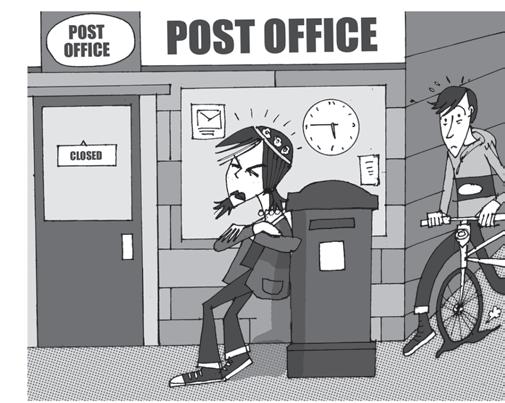
3 Read the story again and answer the questions. 1 When did Sarah go to town?
2 What did she do when she arrived in town?
3 Why didn’t she have any money to buy a drink?
4 Where did Sarah wait for Jack?
5 Why was Jack late?
6 Why didn’t they go shopping?
7 What did they do in the end?
8 Did Sarah enjoy the film?
1
2 3 4
110
Follow the steps and write a story
Step 1 Plan
Look at the pictures of Eliza and Leo’s day out. Match the phrases in the box with the correct picture. Then number the phrases for each picture in the order you want to use them.
go to the beach buy an umbrella arrive in Blackpool at 11 o’clock prepare a picnic go to the station and catch a train decide to go to Blackpool for the day not relax and sunbathe start to rain not buy any souvenirs

Step 2 Write


Write a first draft. Use the notes you made in Step 1. Use the model text on page 110 to help you. Use First, Then, and In the end where appropriate.
Step 3 Check
Check your work. Check you use: Check your: time connectors correctly grammar vocabulary spelling
Step 4 Write
Now write your final copy in your notebook.
a b c
111
A disastrous day out!
Writing guide 3
Language focus: also and too
1 Complete the sentences with also or too.
1 I love his music. I like his poetry.
2 She’s a police officer and she’s a writer.
3 Their father is a vet, and their mother works with animals
4 He’s very intelligent and he’s very nice .
5 Last night, her brother was late home.
6 They’re good friends, and they work together.
2 Rewrite the highlighted parts of the text using the words in brackets.
1 (also)
2 (too)
3 (also)
4 (too)
5 (also)
Hi!
My favourite TV or film hero is Adrian Monk, from the TV detective series Monk. He’s a very strange private investigator. (1) But he’s very intelligent. He always tidies everything. (2) He cleans a lot. But he sees everything. He isn’t good-looking or tall or brave, but he always finds the villain. He’s got a friend called Natalie, and (3) he has got two friends who are police officers. They all work together to solve mysteries. I like him because he’s got problems, but he’s a good person and (4) he works with the police. He’s the most intelligent person on TV and (5) he’s a bit different.
I don’t know if they’re going to make more Monk programmes, but I think he’s going to marry Natalie.
Jake
3 Read the text again and answer the questions.
1 Who is Jake’s TV hero?
2 What is his job?
3 What kind of person is he?
4 What does he look like?
5 Why does Jake like him?
6 What does Jake think Monk will do next?

112
Follow the steps and write a letter
Step 1 Plan
Look at Eleanor’s notes on the right about her TV or film hero and answer the questions. Then look back at Jake’s letter on page 112. Number the questions and answers in the order they appear in the text.

a) What’s your TV or film hero’s name?
b) What programme, series or films is he / she in?
c) What does he / she do?
d) What’s he / she like?
e) Why is he / she your hero?
f) What do you think he / she is going to do in the future?
Step 2 Write


a Hollywood actor – his films are often about people who are special or different –doesn’t usually make comedies not very tall, but strong, likes sport and is intelligent he makes good films and he works a lot with people in Africa
Matt Damon more work in Africa and in politics, and make a lot of films films like the ‘Bourne’ trilogy and ‘True Grit’
Write a first draft. Use the notes you made in Step 1. Use the model text on page 112 to help you. Include also and too where possible.
Step 3 Check
Check your work. Check: Check your: also and too are in the correct place grammar vocabulary spelling your information is in the correct order
Step 4 Write
Now write your final copy in your notebook.
113
Writing guide 4
Language focus: verb tenses
1 Order the words to make sentences. Then decide if they are past, present or future.
1 the / at / We / visiting / museum / ’re / the / weekend .
2 I / were / they / saw / riding / them / bikes / when .
3 to / go / I / I’ll / think / the / town square .
4 like / campsite / Did / the / you ?
5 things / market / usually / don’t / at / the / buy / We .
6 right now / you / are / What / doing ?
2 Complete the e-mail with sentences a–e in the correct place.
a) The students won, of course. d) We’re wearing swimming costumes under our clothes. b) It’s Friday afternoon and it’s raining. e) We still don’t have the results. c) It’ll be great.

Hi, Ella,
(1) I’m sitting inside and writing to you because there’s nothing to do! I thought of you yesterday. When I wrote to you last month, you were very busy preparing for your exams. How were they?
I had a difficult week at school last week because we had exams – two every day. (2) But I think I did OK. We also played basketball on Wednesday afternoon –teachers against students! It was great. (3) :-) I took some photos. I am sending you some with this e-mail.
There’s a big water festival at the park near my house tomorrow. I will go with my classmates. (4) If we don’t, our clothes will get really wet. There will be a fantastic concert at the end of the day. Do you want to come? We’re meeting at the monument at 4.00 pm. Please come! (5) Did you have a good week? What are your plans for the weekend?
Can you come to the park tomorrow?
Write soon! Love, Aisha
3 Read the e-mail again and answer the questions.
1 What is Aisha doing at the moment?
2 When did Aisha last send an e-mail to Ella?
3 Why was last week difficult for Aisha?
4 What did Aisha do last Wednesday?

5 Where is Aisha going tomorrow?
6 What’s going to happen at the end of the day?
7 Where are they meeting at 4.00 pm tomorrow?
114
Follow the steps and write an e-mail
Step 1 Plan
Look at Lianne’s thoughts in the box. Write her thoughts in the correct place on the mind map. Then look back at the e-mail on page 114 and number the information in the order it appears in the text.
going to town next Sunday feeling hungry listening to music made a cake at school yesterday meeting friends for pizza tomorrow at 6.00 pm had a good week at school played games in English on Monday saw a fantastic play went to the theatre on Tuesday
Step 2 Write

at the weekend
Write a first draft. Use the notes you made in Step 1. Use the model text on page 114 to help you.
Step 3 Check
Check your work. Check: Check your: you have used past, present and future tenses grammar vocabulary spelling you start your e-mail with Hi you end your e-mail with Write soon
Step 4 Write
Now write your final copy in your notebook. last week
now
115
Lianne
Class portfolio 1

Our favourite artist
1 Ideas
Which famous artist do you like? Why do you like him / her?
3 Write

Write a short text about the artist, using your notes.
2 Group work

Interview everyone in your group to investigate which artists they like best?
Choose one artist and write some notes on:
• name
• nationality
• type of art
• other information: family, exhibitions, other projects
4 Check
Read your text and check it for:
• capital letters and punctuation
• and, but and because
• time prepositions: at, on and in
5 Visuals
Find or draw pictures of your artist and his / her artwork.

6 Display
Make a poster / PowerPoint presentation. Include your texts and pictures. Show your project to the class.
116
Class portfolio 2

The joy of travel

1 Ideas
Think about posibilities of spending your holidays. What places in the world would you like to visit?
2 Group work

Interview everyone in your group to investigate what their dream holiday destinations are? Why would they like to go there? Discuss and write notes on:
• type of holiday
• attractions
• things to do
3 Write
Write a short text about your dream holiday destination, using your notes.

5 Visuals
Find pictures of your favourite holiday destinations.
4 Check
Read your text and check it for:
• spelling
• punctuation
• time expressions
• correct word order and tenses
• connectors
• variety of adjectives
6 Display

Make a poster / PowerPoint presentation. Include your texts and pictures. Show your project to the class.
117
Class portfolio 3
My technology world

1 Ideas

What technology or gadgets do you have? When did you get your gadgets? Did you buy them or were they presents? Why do you like them? Which is your favourite? Why?
3 Write
Each person in the group chooses a different gadget to write about. Remember to describe what the gadget is like, what you use it for and when you got it.


2 Group work
Interview the students in your group to investigate which gadgets they like? Why? Discuss and write notes on:
• Which gadgets are useful?
• Which gadgets are cool?
4 Check

Swap your writing with a partner and check punctuation, spelling, word order and interesting vocabulary.
5 Visuals
Take photos or draw your gadget.

6 Display
Make a poster / PowerPoint presentation. Include your texts and pictures. Show your project to the class.

118
Class portfolio 4


1 Ideas
Which places do tourists visit in your area? Which are your favourite places?
2 Group work
Interview the students in your group to investigate which places they like?
Choose four places and write some notes about them:
• Where are they?
• What can you do there?
• Why do tourists visit them?
• What’s special about them?
3 Write
Write a short text about your area, using your notes.
4 Check
Read your text and check it for:
• amount
• firstly, secondly, finally
5 Visuals
Find or take pictures of your area.

• variety of verb tenses

6 Display
Make a poster / PowerPoint presentation. Include your texts and pictures. Show your project to the class.

Visit my area!
119
FESTIVALS AND SPECIAL OCCASIONS

THE CHINESE NEW YEAR
The Chinese New Year takes place between January 1st and February 19th. This important date on the Chinese calendar is celebrated every year. During the festivities the Chinese people honour their ancestors and hold traditional ceremonies where people get together and welcome the new year with customs that will bring good luck, good fortune, wealth, prosperity and happiness.
To sweep away bad luck people clean their houses from top to bottom.
The festivities for the new year take 15 days in most countries.
The Chinese often celebrate the new year with dragon dances, lion dances, gift exchanges and fireworks. It typically ends with lantern festivals on the 15th day of the first calendar month.
Each year a Chinese zodiac animal is the symbol for the year.
The 12 Chinese zodiac animals are: rat, ox, tiger, rabbit, dragon, snake, horse, goat, monkey, rooster, dog, and pig.
People eat ‘auspicious food’ during the new year period: fish dishes (fish is a symbol of good luck, wealth and healthy life), dumplings, mandarin oranges, dried fruit and even sweets because they are ‘lucky food’. Candy boxes and little round shaped biscuits symbolizing gold or fortune are served everywhere. A popular food are long noodles that will bring good fortune as well as a long life.
And make sure your plate is never empty, to be lucky in the new year.
120

1 Identify the twelve animals of the Chinese calendar.
2 PERSONAL PROJECT Follow the link and watch the video: https://youtu.be/bwEq46o-Z9I?si=GyCCh_fG2WMX55d6 Write down 5 traditional objects and food considered to bring good luck in the new year.
R _ _ O _ T _ _ _ _ S _ _ _ _ R _ _ _ _ _D _ _ _ _ _ D _ _ P _ _ H _ _ _ _G _ _ _M _ _ _ _ _R _ _ _ _ _ _ 121
MAY DAY
May Day is a holiday that celebrates the return of spring. It usually takes place in May. Many people celebrate May Day with festivals or flowers. May Day is not an official holiday in the United States. In the United Kingdom it is a bank holiday that is celebrated on the first Monday in May. In some countries May Day is a holiday that honors workers, similar to Labor Day. Here are some May Day facts and traditions.

Decorating Houses
May Day begins early in the morning. People go out before sunrise in order to gather flowers and greenery to decorate their houses and villages with the belief that the vegetation spirits would bring good fortune.
Washing in the early morning dew
Girls have a special habit of washing their faces in the dew of the early morning. They believed this made them very beautiful for the following year.
Maypole Dance
This medieval tradition is well-known to everybody. Maypole is a tall pole around which dancers perform a beautiful dance with ribbons. This is popular in Germanic countries plus United States and Canada. The pole is decorated with flowers and ribbons in an elegant manner while dancing. It’s a great day of singing and dancing in the traditional Maypole style where children get small pretzels.
May Queen
The highlight of May Day was the crowning of the May Queen, the human replica of Goddess Flora. By tradition she took no part in the games or dancing, but sat like a queen in a flowerdecked chair to watch her ‘subjects’.
May Day Garlands
Young girls make May Garlands. They cover two hoops (rings) with leaves and flowers and sometimes they put a doll inside to represent the goddess of spring. In some parts of Britain, May 1st is called Garland Day.
Fertility
May Day is celebrated by many cultures. Gods of the forest, goddesses of motherhood and a number of agricultural Gods have a close connection to this holiday. Spring is the time when the fertility is high because of the favorable temperature and a feeling of celebration.
Lei Day
Lei day, celebrated in Hawaii started in 1929 and still continues. Each island has a different type of celebration, but the aim is the same – to celebrate the onset of spring. People immerse themselves in the centuries-old tradition of presenting flower necklaces to say “Aloha” at the Lei Day celebration. Here, May Day is Lei Day where every person can enjoy hula dancing, and Hawaiian music.
Wherever you are, make sure you spend your May Day acknowledging the good things within you, dancing around the Maypole, washing your face with morning dew, and simply enjoying your holiday!
122

1
People dance around a may pole on May Day. Complete the word spirals. All the words have got four letters. The last letter of each word is the first letter of the next word.
1. past simple of to sell
2. past simple of to draw
3. quite hot
4. plural of mouse
5. not difficult
6. my, his/her, our, … , their
7. the first school … is “You must wear school uniform”
8. You hear with these
9. She … that she liked swimming
10. You sit on this. It is bigger than a chair
11. I won’t be … to come to your party because I’m going on holiday
12. opposite of west
13. past tense of to tell
14. short name for David
15. you see with these
16. opposite of go
2 PERSONAL PROJECT Follow the link: https://www.youtube.com/watch?v=3Rc7CeQ1H9o
Watch the video and answer the questions. a) What’s the weather like?
c)
d) Can
name a similar Romanian celebration when children dance? 5 6 7 12 13 16 4 M11 AYPOL8 E 15 14 10 9 3 2 DLO1 S 123
b) What are the children wearing?
What are the children doing?
you
Unusual festivals in Australia

1 Henley on Todd Regatta
Henley on Todd Regatta is a boat race with a unique difference – it takes place on the dry sands of the Todd River! Get dressed up for a day of frivolity and fun and enjoy the hilarity as you watch teams race in bottomless boats through the deep course sand. People can watch the Regata every year on the third Saturday in August. It began as a joke at the expense of the original British settlers and the formal atmosphere of the British river races which continue today. Every year before September, the town holds a regatta which large numbers of locals and tourists attend.
2 The Good Dog! International Film Festival
Good Dog! is a film festival screening engaging films that include a dog. The annual festival is held in Sydney Harbour. All profits are donated to Australian and International dog charities. The festival director is Anny Slater – a lawyer, film-maker, writer and philanthropist. This is pretty much a film festival for all the people who love dogs. The two-day film festival is entirely devoted to movies featuring man’s best friend. Since 2012, the festival –and its sister event ”The Easter Dog Parade” – raised over $10,000. It’s an energetic live literary performance which features the personal, true dog stories of everyday people, writers and performers.
U.S. MovieMaker magazine included ”Good Dog!” in its list of “Top 10” Coolest Film Festivals in the “World-Out of the Box” category.
Food and drinks are sold at stalls, «no fishing» signs are put up, and the celebration takes all day. «Boats» are made from metal frames and hung with banners and advertisements, and teams of «rowers» run their boats in races through the hot sand. Races are also held in washtubs, human-sized hamster wheels and at the final event, modified trucks as boats are driven by teams armed with flour bombs and water guns. Traditional teams include Pirates and Vikings, wearing costumes. 20,000 spectators come every year to watch competitors running their elaborately built «boats» down the dry riverbed during the Henley on Todd Regatta. It’s a day of fun, hilarity and plenty of laughs.
1 Find these words in the text:
1 a competition between people rowing boats; 2 a person who goes to live in a new country or region;
3 people who watch an event;
4 a sporting event in which rowing boats or sailing boats compete against each other.
2 What is this boat race famous for and what makes it unusual?

124
3 Name a movie where dogs played an important part.
3 Mary Poppins Festival
The Mary Poppins Festival takes place during the winter school holidays each year so that everyone can make the most of what is on offer, something for every Mary Poppins fan, from music concerts backstage and on stage to pop up performances. The Festival offers something for all the family and for all ages. The program includes film, art, music, performance, literature and craft activities, during the 10-day event. The artists share their stories through exhibitions and public art installations. People walk in the streets and search the rooftops for some very special new surprises as part of the Story Trails experience. It is the chance for those of us who grew up with the much loved story and movie to share the magic and fun of Mary Poppins with our kids by bringing it to life through an amazing program of events. The Mary Poppins Festival celebrates the Art of Storytelling through a range of free events aimed at sharing stories through art and finding imaginative and creative ways to keep them alive. There is only one way to describe the Mary Poppins festival – Supercalifragilistically fun.
4 Follow the link below and write down five sentences about the street event you see in the video.
https://www.youtube.com/watch?v=bWXHh_4OROA



4 Chinchilla Melon Festival
Chinchilla Melon Festival, a biannual event, attracts a lot of locals and international tourists, with its exciting activities like melon skiing, celebrity melon eating and melon chariot race. Not to mention the big melon weigh-in that’s almost synonymous with this festival that celebrates the region’s melon farming. Visitors can also enjoy the melon beach party, free family concerts, the popular Melon Fest street parade and the free melon feast.
5 Surf the internet and find other festivals celebrating fruit or vegetables. What festivals are they? When and where do they take place? How are they celebrated?

125

Notting Hill Carnival
The sights, the sounds, the smells, the samba! Each year on the last weekend in August, Notting Hill is in party mood. The famous Notting Hill carnival is one of the most spectacular annual events in London, which attracts around two million people – not to mention the largest street party in Europe!
Notting Hill Carnival has its roots in the Caribbean, particularly in Trinidad, where the tradition of carnival was very strong. The event started in 1964 and from the very beginning it was a huge success. This carnival brought people together. With the addition of costumes and a steel band it invited everybody out and onto the streets in appreciation of the music. At present it reflects the multi-cultural nature of society and it attracts participants and spectators from all over the world. Notting Hill Carnival encourages an open festival, offering different groups of people the opportunity to celebrate their particular cultural traditions. These groups are from Afghanistan, Africa, Central America and the United Kingdom.
The carnival features a legendary parade with dancers, performers and musicians from the local community as well as great food and an incredible party atmosphere. For two days the carnival brings sound and excitement to the streets of London. It’s fantastic, it’s fun and it’s free. It shows Notting Hill as a vibrant city area, whose people get together once a year to be part of the carnival.
The best day to go to the carnival is on Sunday, which is known as ‘Family Day’, when you can see the brilliant Children’s Parade, with costumes and music pumping from the sound systems to inspire dancing in the streets: reggae, merengue and rumba.
Notting Hill Carnival is a spectacular event and a great contribution to the British cultural life.
126

1 Read the text again and decide if the following sentences are true (T), false (F) or don’t know (DK).
1 Notting Hill Carnival is a biannual event. T F DK
2 Notting Hill Carnival may have its roots in Trinidad. T F DK
3 It began in the early 1960s. T F DK
4 The Carnival lasts over three days. T F DK
5 It starts on the last weekend of August every year. T F DK
6 Notting Hill Carnival is completely free. T F DK
7 The best day to go is on Sunday. T F DK
8 You will need to bring cash to pay for food. T F DK
9 A lot of Caribbean food, hot and cold drinks and beer are available. T F DK
10 You can see the brilliant Children’s Parade on Saturday. T F DK
2 PERSONAL PROJECT Follow the link and watch the video: https://www.youtube.com/watch?v=YURnysjdSgU
a) What are the people doing in the street?
b) What are they wearing?
c) How are they feeling?
127
1 Play the game.
Which T are you late at night?

Which F do you do when you travel by plane?
Which S is the opposite of happy?

Which C do you do with a tent?


Which S means to travel by boat?
H H T F

Which H is a type of film?
EWhich C makes you laugh in the cinema?
S T C S C S
Which E is a natural disaster?
Which H is a walk in the countryside?
Which S shows football and tennis on TV?
Which T is a very strong wind?
128 Final
revision 1
FINISH
START
Final revision 1
2 Complete the text with the correct form of the verbs in brackets. Use the present simple or present continuous.
My dad (1) … (work) for an art gallery and he (2) … (travel) around England twice a year to buy paintings. Today I (3) … (look) at Kieron Williamson’s paintings with my dad. My dad (4) … (call) Kieron the next Picasso, but he (5) … (be) only eight years old. Kieron (6) (not draw) today, he’s at school. He (7) … (not go) to a special school. Kieron’s a normal schoolboy who (8) … (love) playing football with his friends just like me – but I can’t draw!
4 The Duke of Edinburgh’s Award
3 Complete the text with the correct form of the verbs in brackets.
The artist Frida Kahlo (1) … (be) born in Mexico in 1907. As a teenager, she (2) … (want) to study medicine. However, one day in September 1925, there (3) … (be) a terrible bus accident and Frida (4) … (break) a lot of bones. She (5) (spend) many months in hospital. Frida (6) … (not become) a doctor, but a famous artist. In 1929, she (7) … (marry) Diego Rivera, another Mexican artist. She (8) … (not live) a very long life. She (9) … (die) in 1954.
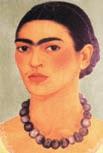
Four sentences are removed from the text below. Choose from sentences A–E the one which fits each gap. There is one extra sentence which you do not need to use.
The Duke of Edinburgh’s Award is a charity which gives awards to young people between the ages of 14 and 24 who finish a programme of different activities.
1
Around 250 000 young people in the UK are doing a programme at the moment. There are three levels of award: Bronze, Silver and Gold.
2
The Bronze programme has got four sections: Volunteering, Physical, Skills and Expedition. The great thing is that you can design your own programme.
3
Last year Molly did a photography course and she learnt about digital images (Skills). At the moment she’s helping in an animal hospital on Friday afternoons (Volunteering). Molly doesn’t like sports very much.
4
For the Expedition section of the award, Molly is planning a camping trip to Wales to take photos of animals and birds.
A For example, Molly is very interested in animals and photography.
B But the young people need to try new activities – they can’t just sit at home on the sofa and watch TV!
C She loves dancing so she goes to dance classes twice a week (Physical).
D Molly’s brother, Tom, who is 26, is interested in the Expedition section.
E Most people begin by taking the Bronze programme.
5 Writing
Write a story beginning like this:
The day I got my pet dog was also the day the trouble began… Use 80–100 words and give your story an appropriate title.
129






130 Final
1 2 3 4 5 6 7 8 9 1011 12 13 14 15 16 17 Across 3 This person repairs electrical machines. 5 We need this to move the cursor on a computer screen. 7 This verb is the opposite of drop 8 This person saves swimmers in danger. 10 This person helps sick animals. 12 John is very … . He never does any work. 13 My parents often … for their shopping with their credit card. 14 A … is when your head hurts. 16 This person designs buildings. 17 We use these to listen to music on our computers. Down 1 We do this when we go up a mountain. 2 The opposite of kind 4 A lot of people have a … in winter. 6 We do this to have a lot of money. 9 A … person makes other people laugh. 11 You should go to the doctor if you have a high … . 15 Please … on that chair. 1 Read the clues and complete the crossword.
revision 2
Final revision 2
2 Choose a, b, or c to complete the following sentences.
1 I … drink lots of coffee, but I stopped last week.
a) used to b) use to c) am used to
2 That auditorium … be a cinema.
a) use to b) used to c) was used to
3 I … like opera, but now I don’t.
a) used to b) use to c) am used to
4 I … like western music, but now I do.
a) didn’t use to b) didn’t used to c) use not to
5 I always … be afraid of the dark.
a) use to b) used to c) was used to
6 I … drive a big car.
a) didn’t use to b) wasn’t used to c) didn’t used to
3 Correct the sentences.
1 Where went you yesterday?
2 She maked lots of friends.
3 We didn’t used to go on the tram.
4 The holiday last year costed £2000.
5 I used to cryed when I watched the film.
6 ‘Did he invent the car?’ ‘Yes, did he’
7 Did you used to have a good time at parties?
4 Fill in the gaps with one word for each space.
Life on Mars
There are (1) … stories about Martians (people from Mars). In 1878, an Italian astronomer observed Mars (2) … he saw river canals. (3) … people believed that Martians built these canals. (4) … 1898, H.G. Wells wrote The War of the Worlds. In this book, the Martians were (5) … than humans. (6) … the narrator of the story travelled through England, the Martians invaded Earth. So, are there (7) … people on Mars? Probably not! The atmosphere is thinner than on Earth and there isn’t (8) … ozone to protect the planet from the Sun’s rays.

Use the stairs!
You will pay a fine if you don’t have a ticket.
The tickets cost £35.
The banking system can be used at any time, day or night.
Linda received her final exams results.
5 Match the notices A–E with the correct sentences 1–7. There are two extra sentences you don’t need to use. YOU MUST HAVE A VALID TICKET. PENALTY £35 BREAKFAST SERVED 6.30-8.30 LIFT OUT OF ORDER 24 HR BANKING
E
6 Writing
CONGRATULATIONS ON PASSING YOUR FINAL EXAMS! GREAT JOB, LINDA!
You can have dinner here 6.30–8.30 pm.
You can have breakfast here early in the morning.
Write a story ending like this: … It was such a strange experience that nobody believed me. Use 80–100 words and give your story an appropriate title.
131
A B C 1
2
3
4
5
6
7
D

Final revision 3
1 Fill in the gaps with the correct words. The number of letters is given in brackets.


Do you ever … in an exam? (5)
The … is the biggest land animal. (8)

Many people … when they are 18. (5, 2, 5)


This game is difficult. I … ! (4, 2)


The … lives in the Arctic Circle. (5, 4)


When I am 18, I want to … to study history. (2, 2, 10)

Paris has got the largest … in France. (3, 7)
Nelson’s Column is an important … in London. (6)


… is made from wood. (5)
In the UK, many children … when they are 4. (5, 6)

In an … you can see many different types of sea creatures. (8)


Let’s recycle our used … ! (5)

Jumpers, gloves and scarves are often made of … . (4)

The … is a mammal that lives in the sea. (7)
132
Dave and Mark in the Killers play … (6)
Final revision 3
2 Complete the sentences with the correct tag questions.
1 I am the person with the tickets, … ?
2 He can ski well, … ?
3 He likes chocolate very much, … ?
4 She didn’t work in a hotel, … ?
5 They needed some new clothes, … ?
6 We will move in a tiny flat, … ?
7 She studies very hard every night, … ?
8 She doesn’t cook very often, … ?
3 Agree or disagree, using so or neither / nor.
1 I really like hiking.
2 I don’t like milk.
3 I spoke to John yesterday.
4 I will paint the house.
5 I can’t drive a bus.
6 I am a good student.
6 Choose the correct word for each space.
A Brilliant Language Speaker
4 Complete the sentences with can or will:
1 … I go camping with my friends at the weekend?
2 … we go to the art exhibition?
3 … you buy me some stamps at the post office, please?
4 … you read louder, please?
5 … I go to the cinema tonight?
6 … you take the dog for a walk, please?
5 Order the words to make sentences.
1 speak / while travelling / You / English / fluently .
2 can’t / when / tired / I / fast / am / run / I .
3 danced / fantastically / They / salsa / at the club .
4 at the Art club / Sophia / draws / beautifully / landscapes .
5 cooked / well / Paul / at his friend’s restaurant / Chinese food .
Jane was very interested in learning languages. When she and her brother were small her parents used to (1) … in French to each other if they didn’t want the children to (2) … their conversations. Jane said that this (3) … her want to learn to speak French. She started learning it at school when she was ten and two years later she started studying German as (4) … . Jane’s teachers always said she was very good (5) … languages and so she decided to study them at university. She wanted to (6) … a translator but she was keen to choose a (7) … language, not one she learnt at school. After talking to her parents and her teachers, she decided to study Japanese and she was (8) … to get a place at a very good university in London. Japanese is a difficult language and Jane had to work very (9) … . However, she did very well and now she has an excellent (10) … as a translator with a big international organisation.
1 A say B tell C talk
2 A understand B listen C consider
3 A started B made C let
4 A also B soon C
5
6
7
8
9 A hardly
10
7 Writing
Write a story using the following fragment somewhere in the ”body” of the plot: … I didn’t have any money. My money was in my bag, and my bag was on the bus! … Use 80–100 words and give your story an appropriate title.
133
well
A
B at C
on
by
B work C become
A get
B unusual C different
A foreign
B able C likely
A sure
B hard C harder
B work C
A job
course
Let’s have fun! Sketch 2
1 Listen and answer the questions.
1 What time does the bike race start?
2 Where will the cyclists go after the London Eye?
3 Is Nick going to take part in the bike race?
2 Read and listen to the dialogue. Check your answers.
The
bike race
Mia The bike race is starting in Hyde Park at 9 am.
Alex So if we leave home at 8 am, we won’t be late. We can take a bus.
Nick Dis you say Hyde Park? How big is it?
Alex Hyde Park is one of the largest parks in London. It’s got more than 4,000 trees, bike and horse paths and a lake you can swim in.
Nick Tell us more about the race.
Mia There’ll be a lot of young people there. The race is for 14–18 year-olds. My brother did the race last year and it was amazing.
Nathan Does the race finish in Greenwich?
Alex Yes. Cyclists will ride from Hyde Park to Buckingham Palace and then to the Houses of Parliament.
Nick Buckingham Palace? Do you think the King will watch the race?
Nathan I don’t think so, Nick. Then the cyclists will go to the River Thames and the London Eye.
Nick Oh, the London Eye! Does it go really fast?
Mia It moves really slowly. You get the most amazing views of London from the top.
Alex After the London Eye, the cyclists follow the River Thames. They’ll ride past St Paul’s Cathedral and the Tower of London.
Nathan They’ll cycle past Tower Bridge too. That’s the beautiful bridge that opens when tall ships sail on the river.
Alex The cyclists will continue to Greenwich. They’ll finish at the Prime Meridian in Greenwich around 12.30 pm. We can have our lunch there.
Nick But I can’t ride a bike!
Mia We’re not taking part in the race, Nick. We’re watching it!
3 Work in groups. Practise and perform the sketch.
• Choose a character.
• Read and learn your lines.
• Perform for your class.
Read and say!
I have got a date at a quarter to eight, I’ll see you at the gate, so don’t be late.
Joke time!
Patient Doctor
Doctor, I have a pain in my eye whenever I drink tea. Take the spoon out of the mug before you drink.
134
Grammar guide – Module 1
Present simple affirmative
I You He / She / It We You They love love loves love love love thrillers. negative I You He / She / It We You They don’t like don’t like doesn’t like don’t like don’t like don’t like westerns.
questions short answers affirmative
Do Do Does Do Do Do I you he / she / it we you they watch DVDs?
Question words
What’s your name? Where are you from? When’s your birthday? Who’s Lucy? Why are you happy? How often do you buy DVDs?
Adverbs
Yes, I do. Yes, you do Yes, he / she / it does Yes, we do. Yes, you do. Yes, they do
My name’s David. I’m from London. It’s in March. She’s my cousin. It’s my birthday. I never buy them.
Frequency expressions
I watch the news every day
My friend goes to the cinema at the weekend.
No, I don’t. No, you don’t No, he / she / it doesn’t No, we don’t No, you don’t. No, they don’t
Present simple – spelling rules for third person singular
for most verbs add -s drink ➞ drinks for verbs that end in -s, -sh, -ch and -x add -es pass ➞ passes wash ➞ washes watch ➞ watches fix ➞ fixes for verbs that end in consonant +y, omit the -y and add -ies study ➞ studies for verbs that end in vowel +y, keep the -y and add -s play ➞ plays irregular verbs be ➞ is have ➞ has
negative
of frequency 0% 100% neversometimesoftenusuallyalways
135
Grammar guide – Module 2
Present simple vs. present continuous
Present simple is used to expressPresent continuous is used to express habits: We walk in the park on Sundays
routines: We start school at 8 o’clock in the morning.
timetables, schedules, programmes: The train arrives at 10 o’clock.
permanent states: They live in Canada.
time expressions: every day / weekend / year e t c , always, usually, never, on Mondays, once a week e t c .
actions happening at the time of speaking: I’m doing my homework now
temporary situations: She’s studying for her exams these days.
making plans, fixed arrangements for the near future: They’re moving into their new house next week
annoying habits (with always): They are always leaving the door open!
time expressions: at the moment, now, this week, these days, today etc.
Present continuous – spelling rules
add -ing to most verbs build ➞ building, climb ➞ climbing for verbs that end in -e, omit the -e and add -ing hike ➞ hiking, make ➞ making for verbs that end in -ie, change the -ie to -y and add -ing die ➞ dying for one-syllable verbs that end in a vowel + a consonant (except w, x or y), double the consonant and add -ing hit ➞ hitting for two syllable verbs that end in a stressed vowel + a consonant, double the consonant and add -ing begin ➞ beginning
136
Grammar guide – Module 3
be: past simple affirmative
I / He / She / It You / We / You / They was were happy.
questions
Was I / he / she / it a traveller?
Were you / we / you / they happy?
Past simple affirmative
I You He / She / It We You They arrived. arrived. arrived. arrived arrived. arrived.
questions
Did I you he / she / it we you they go?
Past
simple
negative I / He / She / It You / We / You / They wasn’t weren’t sad.
short answers affirmativenegative
Yes, I was No, I wasn’t
Yes, you were.No, you weren’t
negative I You He / She / It We You They didn’t go. didn’t go didn’t go. didn’t go. didn’t go didn’t go
short answers affirmativenegative
Yes, I did Yes, you did. Yes, he did. Yes, we did Yes, you did Yes, they did. No, I didn’t No, you didn’t. No, he didn’t. No, we didn’t No, you didn’t No, they didn’t.
regular verbs – spelling rules
for most verbs add -ed invent ➞ invented for verbs that end in -e, add -d arrive ➞ arrived for verbs that end in a consonant + y, omit the -y and add -ied study ➞ studied for verbs that end in a vowel + a consonant, add -ed visit ➞ visited for verbs that end in a stressed vowel + a consonant (except w, x or y), double the final consonant and add -ed stop ➞ stopped permit ➞ permitted
Past simple irregular verbs – spelling rules
for the irregular verb list, see page 143–144
137
Grammar guide – Module 4
Past simple irregular verbs
affirmative I You He / She / It
They went went went went went went to the UK.
didn’t go (did not go) didn’t go (did not go) didn’t go (did not go) didn’t go (did not go) didn’t go (did not go) didn’t go (did not go) last week.
questions short answers affirmative negative Did Did Did Did Did Did I you he / she / it we you they go?
Yes, I did Yes, you did. Yes, he / she / it did Yes, we did. Yes, you did Yes, they did.
No, I didn’t No, you didn’t. No, he / she / it didn’t No, we didn’t. No, you didn’t No, they didn’t.
Used to is always a past form. It has no present form.
affirmative
negative
I / You / He / She / It / We / You / They used to play chess
I / You / He / She / It / We / You / They didn’t use to sing.
interrogative Did I / you / he / she / it / we / you / they use to jog?
short answers
Yes, I / you / he / she / it / we / you / they did. No, I / you / he / she / it / we / you / they didn’t
Used to – rules and examples
To talk about past habits or things that happened in the past, but no longer happen. He used to live in the countryside, when he was a child. (He doesn’t live anymore.)
We can use the past simple instead of used to with no difference in meaning. She used to live in New York. (She lived in New York.)
BUT They bought a new house last month. (NOT: used to buy – single past action.)
negative I
He
We You They
We You
You
/ She / It
138
Grammar guide – Module 5
The adjective – comparative and superlative forms
comparatives
A laptop London
My sister is smaller bigger than more beautiful a desktop. Birmingham. my cousin.
superlatives
The laptop London
My sister is the smallest the biggest the most beautiful in the shop. city in Britain. girl in her class.
Comparatives and superlatives –spelling rules
for most short adjectives
small ➞ smaller ➞ the smallest for short adjectives that end in -e wide ➞ wider ➞ the widest for short adjectives that end in a vowel + a consonant
big ➞ bigger ➞ the biggest for short adjectives that end in -y happy ➞ happier ➞ the happiest for long adjectives famous ➞ more famous ➞ the most famous irregular adjectives good ➞ better ➞ the best bad ➞ worse ➞ the worst much ➞ more ➞ the most many ➞ more ➞ the most little ➞ less ➞ the least far ➞ farther / further ➞ the farthest / the furthest
The forms of the genitive
’s – genitive
proper nouns Jenny’s dress is red. nouns in the singular (mostly for people or animals)
irregular plural nouns
’ (apostrophe) for regular plural nouns ending in -s
of – genitive
for things
for animals (if we are talking about a species in general)
The boy’s scooter is green. The dog’s eyes are blue.
The children’s bikes are new.
The students’ books are on the desks.
The windows of the room are wide open.
The ears of the bunny are very long.
Uses of the genitive
For singular nouns ending in -s we add ’s.
The actress’s role was very difficult. For proper nouns ending in ’s we have 2 possibilities:
Charles’s book is interesting or Charles’ book is interesting. If 2 people own the same object we add ’s after the last one.
Tom and David’s house is in Oxford street.
If 2 people own different objects we add ’s after each person.
Tom’s and David’s houses are in the same street.
139
Grammar guide – Module 6
Expressing agreement and disagreement
Expressing positive agreement
We use so to agree with what someone says: So + auxiliary / modal verb + subject
I love playing tennis. So do I.
Lou likes climbing mountains. So does Ann.
Tom can ski. So can John.
I am happy! So am I.
Expressing disagreement
Expressing negative agreement
We use neither / nor to agree with a negative statement. So + auxiliary / modal verb + subject
I don’t like surfing. Neither / Nor do I.
Sandra doesn’t like fishing. Neither / Nor does Ann.
I wasn’t on the school trip yesterday. Neither / Nor was I.
We use: subject personal pronoun + auxiliary / modal verb to disagree with what someone says:
I am not cooking tonight. Really? I am.
I often meet my friends on Sundays. I don’t.
I don’t watch TV in the morning. I do.
He never rides his bike to school. I do.
My brother can play the violin. I can’t.
The
modal verbs: can, will – making
Polite requestsAcceptingRefusing
Can you help me with the dishes?
Will you make dinner tonight?
Sure. / Sure, no problem. No, / I’m sorry. I’m afraid I can’t.
Yes, of course. / Certainly.
Sorry, (no) / I’ve got an appointment. I’ve got a lot of work to do.
a polite request
Can I … ? is used in informal English. We use this structure to make a polite request.
Will you … ? is used when we ask somebody else to do something for us. It is more polite than can.
The main characteristics of modal verbs
They do not take an -s, -ing or -ed suffix. He can sing. (NOT: He cans sing.) They form questions, negations and short answers without the auxiliary verb do Can I go out? (NOT: Do I can go out.) They are followed by a bare infinitive. You can play the drums. (NOT: You can to play the drums.) They do not form all tenses. They usually have present or past tense. He can skate. (present tense) He could ski when he was younger. (past tense)
140
Grammar guide – Module 7
will / won’t
affirmative
I ’ll (will)
You ’ll (will)
He / She / It ’ll (will)
We ’ll (will)
You ’ll (will)
They ’ll (will) buy a house.
questions
Will I
Will you
Will he / she / it
Will we
Will you
Will they get a good job?
Tag questions
Positive statement
Negative tag question
He is short, isn’t he?
They have got an old car, haven’t they?
He can draw, can’t he?
She loves animals, doesn’t she?
You are coming to school, aren’t you?
We visited London, didn’t we?
They will come tomorrow, won’t they?
Negative statement
Positive tag question
He isn’t at home, is he?
They haven’t got a new house, have they?
He can’t swim, can he?
She doesn’t like soup, does she?
You aren’t running today, are you?
We didn’t write the homework, did we?
They won’t come late, will they?
negative
I won’t (will not)
You won’t (will not)
He / She / It won’t (will not)
We won’t (will not)
You won’t (will not)
They won’t (will not) have five children.
Yes, I will Yes, you will. Yes, he / she / it will. Yes, we will Yes, you will Yes, they will. No, I won’t No, you won’t. No, he / she / it won’t. No, we won’t No, you won’t No, they won’t.
Tag questions are short questions at the end of statements used in speech when we want to:
confirm that something is true or not, or to encourage a reply from the person we are speaking to.
A positive statement is followed by a negative tag question. Mary can speak English, can’t she?
A negative statement is followed by a positive tag question.
They aren’t funny, are they?
When the verb in the statement is in the present simple we form the tag question with do / does. You play the guitar, don’t you?
Alison likes tennis, doesn’t she?
If the verb is in the past simple we use did They went to the cinema, didn’t they? When the statement contains a word with a negative meaning, the tag question is positive They never eat in restaurants, do they?
Exceptions
Some verbs / expressions have different question tags. For example: I am – I am attractive, aren’t I?
Positive imperative – Stop daydreaming, will / won’t you?
Negative imperative – Don’t stop singing, will you?
Let’s – Let’s go to the beach, shall we?
Have got (possession) – He has got a car, hasn’t he?
There is / are – There aren’t any spiders in the bedroom, are there?
This / that is – This is Paul’s pen, isn’t it?
affirmative negative
short answers
141
Grammar guide – Module 8
Tense review
present simple present continuouspast simple future simple habits:
They run in the park on Fridays.
routines:
The students start classes at 8 am.
timetables, programmes:
The bus leaves at 9.
permanent states:
My grandparents live in Cluj. time expressions: every every day / weekend / year etc., always, usually, never, on Mondays, once a week etc.
Time expressions
actions happening at the time of speaking:
I’m reading now.
temporary situations:
She’s working on a new project this month.
making plans for the near future:
We are flying to Paris in two days.
annoying habits when used with always:
Tom is always taking my car!
time expressions: at the moment, now, this week, these days, today etc.
We use different time expressions with different verb tenses.
With the present simple, use words such as: always, usually, often, sometimes, never.
With the present continuous, use words such as: today, at the moment, now.
With the past simple, use: in 1989, yesterday, 5,000 years ago.
With future tenses, use: tomorrow, next week, later, in two years’ time.
Adverbs of time / place / manner – used to express details
adverbs of time
describe WHEN something happens
We are visiting the museum next week
They saw a film yesterday
adverbs of place describe WHERE something happens
He races in the park
They met in front of the theatre.
actions which happened at a definite time in the past:
We went to the cinema last week.
actions which happened immediately one after the other in the past: Sam woke up, had breakfast and got ready for school.
time expressions: yesterday / last weekend / year etc., two days / months etc. ago, in 2015, then
predictions about the future with the verbs think, believe, hope, expect: I think I’ll buy a new laptop. on-the-spot decisions: I love this dress! I’ll buy it. promises, requests, offers, hopes:
I’ll send you the essay tomorrow.
I hope the rain will stop soon.
time expressions: tomorrow, next week / month etc., in a week / month etc.
adverbs of manner describe HOW something is done adjective + -ly = adverb: quick + -ly = quickly
He walks quickly
She drives carefully. They get bored easily
Adverbs of manner – spelling
Adverbs of manner are usually formed from adjectives by adding -ly. quiet – quietly; recent – recently Adjectives ending in -le drop the -e and take -y gentle – gently; possible – possibly Adjectives ending in a consonnant + y drop the -y and take -ily easy – easily; happy – happily Adjectives ending in -l take -ly. beautiful – beautifully; careful – carefully
Irregular forms of adverbs
Adjective Adverb good well fast fast hard hard late late early early friendly friendly
142
beat /biːt/ become /bɪˈkʌm/ begin /bɪˈɡɪn/ bite /baɪt/ break /breɪk/ bring /brɪŋ/ build /bɪld/
Irregular verbs
Infinitive
Past simple
Past participle
be /biː/ was, were /wɒz, wɜː(r)/ been /biːn/ beat /biːt/ beat /biːt/ beaten /ˈbiːt(ə)n/ become /bɪˈkʌm/ became /bɪˈkeɪm/ become /bɪˈkʌm/ begin /bɪˈɡɪn/ began /bɪˈɡæn/ begun /bɪˈɡʌn/ bite /baɪt/ bit /bɪt/ bitten /ˈbɪt(ə)n/ break /breɪk/ broke /brəʊk/ broken /ˈbrəʊkən/ bring /brɪŋ/ brought /brɔːt/ brought /brɔːt/ build /bɪld/ built /bɪlt/ built /bɪlt/ buy /baɪ/ bought /bɔːt/ bought /bɔːt/ catch /kæʧ/ caught /kɔːt/ caught /kɔːt/ choose /ʧuːz/ chose /ʧəʊz/ chosen /ˈʧəʊz(ə)n/ come /kʌm/ came /keɪm/ come /kʌm/ cost /kɒst/ cost /kɒst/ cost /kɒst/ cut /kʌt/ cut /kʌt/ cut /kʌt/ do /duː/ did /dɪd/ done /dʌn/ draw /drɔː/ drew /druː/ drawn /drɔːn/ dream /driːm/ dreamt, dreamed /dremt, driːmd/ dreamt, dreamed /dremt, driːmd/ drink /drɪŋk/ drank /dræŋk/ drunk /drʌŋk/ drive /draɪv/ drove /drəʊv/ driven /ˈdrɪv(ə)n/ eat /iːt/ ate /eɪt/ eaten /ˈiːt(ə)n/ fall /fɔːl/ fell /fel/ fallen /ˈfɔːlən/ feed /fiːd/ fed /fed/ fed /fed/ feel /fiːl/ felt /felt/ felt /felt/ fight /faɪt/ fought /fɔːt/ fought /fɔːt/ find /faɪnd/ found /faʊnd/ found /faʊnd/ fly /flaɪ/ flew /fluː/ flown /fləʊn/ forget /fə(r)ˈɡet/ forgot /fə(r)ˈɡɒt/ forgotten /fə(r)ˈɡɒt(ə)n/ get /ɡet/ got /ɡɒt/ got /ɡɒt/ give /ɡɪv/ gave /ɡeɪv/ given /ˈɡɪv(ə)n/ go /ɡəʊ/ went /went/ gone /ɡɒn/ grow /ɡrəʊ/ grew /ɡruː/ grown /ɡrəʊn/ have /hæv/ had /hæd/ had /hæd/ hear /hɪə(r)/ heard /hɜː(r)d/ heard /hɜː(r)d/ hide /haɪd/ hid /hɪd/ hidden /ˈhɪd(ə)n/ hit /hɪt/ hit /hɪt/ hit /hɪt/ hold /həʊld/ held /held/ held /held/ hurt /hɜː(r)t/ hurt /hɜː(r)t/ hurt /hɜː(r)t/ keep /kiːp/ kept /kept/ kept /kept/ know /nəʊ/ knew /njuː/ known /nəʊn/ learn /lɜː(r)n/ learnt, learned /lɜː(r)nt, lɜː(r)nd/ learnt, learned /lɜː(r)nt, lɜː(r)nd/
143
Infinitive
Past simple
Past participle
leave /liːv/ left /left/ left /left/ lend /lend/ lent /lent/ lent /lent/ let /let/ let /let/ let /let/ lose /luːz/ lost /lɒst/ lost /lɒst/ make /meɪk/ made /meɪd/ made /meɪd/ mean /miːn/ meant /ment/ meant /ment/ meet /miːt/ met /met/ met /met/ pay /peɪ/ paid /peɪd/ paid /peɪd/ put /pʊt/ put /pʊt/ put /pʊt/ read /riːd/ read /red/ read /red/ ring /rɪŋ/ rang /ræŋ/ rung /rʌŋ/ run /rʌn/ ran /ræn/ run /rʌn/
say /seɪ/ said /sed/ said /sed/ see /siː/ saw /sɔː/ seen /siːn/ sell /sel/ sold /səʊld/ sold /səʊld/ send /send/ sent /sent/ sent /sent/ shine /ʃaɪn/ shone /ʃoʊn/ shone /ʃoʊn/ shoot /ʃuːt/ shot /ʃɒt/ shot /ʃɒt/ show /ʃəʊ/ showed /ʃəʊd/ shown /ʃəʊn/ shut /ʃʌt/ shut /ʃʌt/ shut /ʃʌt/ sing /sɪŋ/ sang /sɒŋ/ sung /sæŋ/ sit /sɪt/ sat /sæt/ sat /sæt/ sleep /sliːp/ slept /slɛpt/ slept /slɛpt/ speak /spiːk/ spoke /spəʊk/ spoken /ˈspəʊkən/ spell /spel/ spelt /spelt/ spelt /spelt/ spend /spend/ spent /spent/ spent /spent/ stand /stænd/ stood /stʊd/ stood /stʊd/ steal /stiːl/ stole /stəʊl/ stolen /stəʊl(ə)n/ swim /swɪm/ swam /swæm/ swum /swʌm/ take /teɪk/ took /tʊk/ taken /ˈteɪkən/ teach /tiːʧ/ taught /kɔːt/ taught /kɔːt/ tell /tel/ told /təʊld/ told /təʊld/ think /θɪŋk/ thought /θɔːt/ thought /θɔːt/ throw /θrəʊ/ threw /θruː/ thrown /θrəʊn/ understand /ˌʌndə(r)ˈstænd/ understood /ˌʌn dərˈstʊd/ understood /ˌʌn dərˈstʊd/ wake /weɪk/ woke /woʊk/ woken /ˈwoʊ kən/ wear /weə(r)/ wore /wɔː(r)/ worn /wɔː(r)n/ win /wɪn/ won /wʌn/ won /wʌn/ write /raɪt/ wrote /rəʊt/ written /ˈrɪt(ə)n/
144

Manualul este prezentat în variantă tipărită și în variantă digitală. Varianta digitală are un conținut similar celei tipărite. În plus, cuprinde o serie de activități multimedia interactive de învățare (exerciții interactive, jocuri educaționale, animații, filme, simulări).
Învățat e omul care nu termină niciodată de învățat.

ISBN 978-630-342-025-7 9 78630342025 7
Lucian Blaga










































































































































































































































































































































































































































































































































































